#thetoyahwillcoxinterviewarchive
Explore tagged Tumblr posts
Text
TOYAH TALKS LOVE IS THE LAW IN 2024

From the DVD of the Love Is Law reissue 2024
TOYAH: 1983, at the beginning of the idea of recording, at the very, very beginning, I felt very strongly that I wanted a writing process that represented the writing process we had with “Sheep Farming In Barnet” and “Blue Meaning” where we were left alone as creative artists and musicians to just write and see what would happen. So the best way we felt to do this was to move everybody into my house
I had a room that was really a dining room, but had been converted into a gym. We moved an entire studio into the gym. Simon Darlow, who I have known since I was 18, and he was 17, moved into the house with us. Joel Bogen (guitar) lived about 500 yards down the road, so he could get to me very quickly
We decided that we would start writing every day from 10 am. I was taking on a play at that time called "Trafford Tanzi" (below), but once that opened I didn't leave the house till 4.30. I finished the play around 11 pm and a car would take me to the Marquee Studios, and we'd work through the night. Now this may sound exhausting, but it was actually exhilarating. Absolutely exhilarating. To add Simon Darlow into the writing process took attention away from me and Joel. Joel always wanted something to go one way and I was always pushing in another
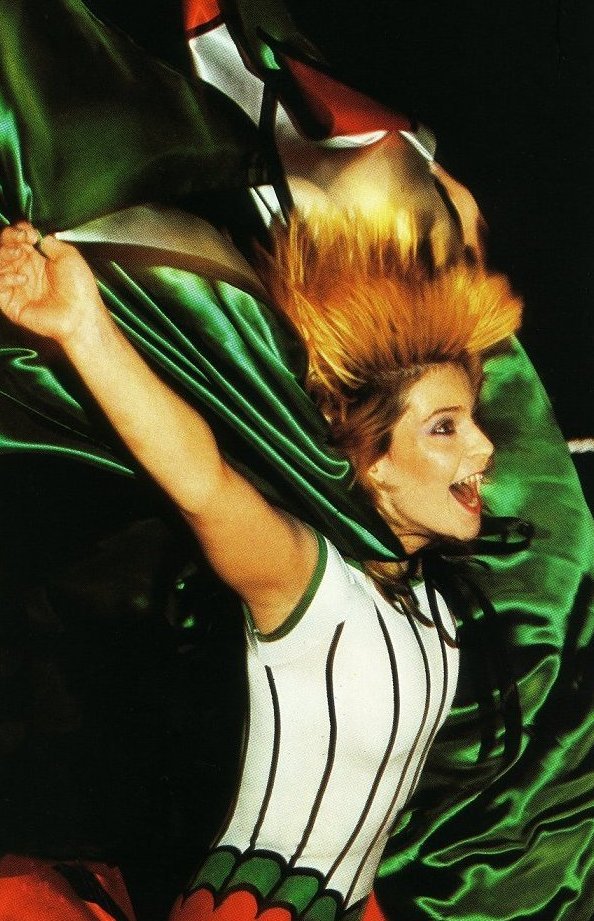
It wasn't that we were completely polarized, because we were great friends, but “The Changeling” was very challenging in that I felt I was edged out of it in under certain circumstances. That was mainly because Steve Lillywhite, who's a very good man and a brilliant producer, I don't think understands women So I didn't ever want to be in that situation again where I felt like an outsider on my own project. So by moving everyone into my house I was incredibly happy. It was breathtakingly spontaneous, creative. We just could not record the ideas quick enough. Having Simon Darlow there, who was a remarkable catalyst, having him back in my life, because he did some keyboard work on “The Changeling” and the moment he walked into the studio, it's like, “thank fuck! It's like my brother has come home!” He instantly bought me back into the fold. Having him in our house, we would actually get up early and write a song like “Haunted”. I've been working with Simon Darlow recently, and he said “you do know we wrote that at about six in the morning in your office?” and I had no memory of that. Because he was always there, and he was always with me, and he was a really supportive friend It meant if I said something like, “oh gosh, I feel haunted by this”. He said, “That's a song! It's a song” Let's do it!” Got the keyboard out and we'd start jamming. He made everything possible for this album with his enthusiasm. He hadn't been touched in any way or tainted by how outsiders can influence a process negatively. He was just like a puppy with a new toy. He was full of energy, and it really, really helped me and Joel a lot "Trafford Tanzi" was a media hit. It was a massive critical hit for me, and slightly highlighted by the fact that on Broadway Debbie Harry opened it the same week, and the critics on Broadway virtually closed it within a week. In Japan a version opened and the critics virtually shut it down within a week there. But our version - it's about an English, northern couple who sought their wedding problems out in the wrestling ring. So it was quintessentially an English, British project and I think that's why it worked
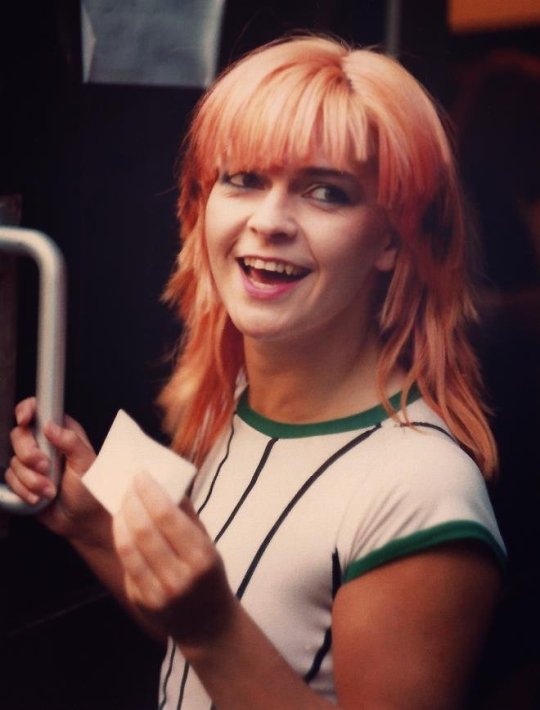
The music was great. It was a musical. It was completely sold out for the entire run, and it saved the Mermaid Theatre. It invigorated me. I think part of it, as the artist I am, is I needed to move between genres to find out my voice at that time, and it invigorated me to have a lot of personal freedom at that time. I traveled without security. I didn't have security at the theatre It was a remarkable event that for five months it became a campsite outside the Mermaid Theatre with up to 130 to 300 fans sleeping rough outside the theatre. There was a tunnel, a road tunnel, that went along beside the theatre that was graffitied so often I had to pay for it to be painted twice The fans were fantastic, and a lot of them became couples and it was a very lovely experience. So when I arrived, there was a crowd waiting for me, and I stayed and I talked with them as much as I could, probably half an hour to an hour each time. In the interval, I would go out and talk to them. You've got to bear in mind there's always been a process with me if you don't schedule a an eating I don't eat. So I used to go out with my cup of Complan, which is a meal supplement in the interval, and have my Complan while talking to them I found it very, very grounding. It tuned me in to who and what they were and their mental frailties, as well as their joys and how they saw me and what I gave to them. Because you can get so isolated as an artist and you can get disillusioned or illusional about things. You just get the wrong impression. To be with them helped me become more grounded and bit more street level as well That's really important, I think, to get your ideas from the street rather than from the latest wonderful dinner at the Grosvenor Hotel. It's much more important. Eventually, when we started moving to the Marquee to record, they followed. It was a small group that followed. The Marquee was down a very narrow driveway, and they couldn't fit 300 tents in, but some followed. That was a very nice experience too, because we could play them stuff on "Love Is The Law". We called about 21 of them in and said “you’re going to sing the chorus now” I remember they all went from being really cocky, sure of themselves people into quiet as mice, slightly terrified, not understanding the process. We were lovely with them, and (the producer) Nick Tauber was fabulous with them. They were just standing at the mics like rabbits in the headlight. But we got it and all we needed them to do was chant “love is the law”and they did it brilliantly. It's just so lovely that they are there, on that recording With this huge encampment outside the theatre they started to call themselves The Angels and Demons, which gave them their identity. It showed that they were there for a purpose, and there was a purpose in what they did every day. So The Angels and Demons came into the world at that point

The most collaborative I have ever experienced with the band was in the very beginning when Pete Bush, Joel Bogen and I would meet every Sunday and we'd write. Then when we got signed we were given time in a rehearsal studio to write. We were writing for months on end and occasionally going out and doing a series of gigs. For "The Blue Meaning" we had to do some of the writing in Battle, Hastings while we were recording. "IEYA" had only ever been an encore improvisation up until the point we went into the studio to record "The Blue Meaning" So there was a long writing and recording process actually in the studio, which for me doesn't help. You get so pressurized and the anxiety - you're in overload. Then with "Anthem", by some magical alchemy, the band was sending me backing tracks of the songs that they'd written together with no vocals on. The alchemy was just extraordinary. I think that's partly because of the musicality of Phil Spalding (bass), Nigel Glockler (drums), obviously Joel and Adrian Lee (keyboards). You had a group of phenomenal composers all in the same room I was writing lyrics, the top lines in the morning and recording it in the afternoon, without fail, on an entire album. I think I did it all in two weeks. On "The Changeling" the collaboration became very fractured, and I'm not sure why. It shouldn't have become fractured. I think part of it was that Joel and Phil Spalding wanted to separate themselves from Toyah the star. That point the band were being held apart from me, and it started to show. But I think the tension has worked really well in that end product. What I wanted to go back to was the sheer improvisational joy of being in a room with musicians who all have experience of songwriting An example of this is "I Explode", which for me, is a really fucking great song. It captures everything I needed and wanted to experience as a very physical singer. I think it came from Joel creating a riff, and then Simon Darlow adding a sequencer and doing something complimentary to Joel's riff. It was so exciting. It was like an unstoppable train. I wanted to create this image, which really comes from Aleister Crowley (and English occultist) creating the myth that exploded his son through a magical spell. This was during the time of the Hellfire Club, where everyone was experimenting with the spirit side of life and with the occult and all of that I wanted to express how I felt as a dyslexic when I can't express myself properly because you get blockages in your processes. You feel as if you're just going to explode because you know it's alive in there and you can't transfer it into the outside world. I was marrying that to the imagery of a human combustion. This song is just breathtaking! To perform it live is like a possession. I absolutely love it! This is why that collaborative process was so magical on “Love Is The Law” because we never once sat there with writer's block. The three people who easily could have been polarized suddenly clicked, and it was really exciting. And then we brought Nick Tauber in, and Tauber has always been the right person for us, other than Steve James, who moved to Australia Nick produced "Sheep Farming In Barnet" and "The Blue Meaning". Tauber has always been perfect. He kept us together as friends, never judged, never caused friction, made every idea we suggested possible. He was open. He just understood us and he didn't block us if he didn't understand something we were trying to do. He explored it

I think one of the funniest experiences is he had to bring me down to earth every time I arrived after the theatre performance, because I would be revving at 190% until about four in the morning because of this incredible stage show. I think he asked me to take a sleeping pill before I did either “Martian Cowboy” or “Rebel Of Love”. He needed to bring me down so I took the sleeping pill and it just made me normal (laughs) so that I could just give a relaxed performance I love writing via improvisation. Even today Simon Darlow and I improvise for about two days and then take the songs from sections of the improvisation. It's a really beautiful way of using the truth of who you are, rather than reflecting influence from others. It's the way I find my voice. Before we went into the Marquee Studios we needed about 10 demos, so I would get home after the theatre - it would take about an hour and a half to get to North London in those days. It was a very bad journey Simon Darlow would be ready for me, and I'd eat, and then we'd go into the studio. I can't remember drinking, but perhaps I did. I was never really a very heavy drinker, from about 1976 to about 1980 I probably did drink a lot to try and bring me down. To just get me down to a human level, because I'm really ramped all the time, naturally I just don't know what I would have drunk. It might have been Bacardi and Coke or something like that. That is something I genuinely can't remember. They tried me with the wacky backy (weed) and I'd just fall asleep. So that didn't do its job. But I always felt very safe with Simon. Simon and I have a kind of old soul past life connection. I always feel in his company that he's never judging me. He never ever comments on my inability to play a musical instrument while he's playing even though on "Posh Pop" I could play guitar with him. He always just listened and appreciated the ideas I came out with and he loves what I do as a lyricist. So there's not only a bond, there is a very special trust and we probably worked right through the night It was a geographical choice as well of having wonderful memories of the Marquee Studios because parts of "Sheep Farming In Barnet" and parts of "The Blue Meanin" were finished there and we did the whole "Anthem" there. So I felt very at home at those studios. It was like going home. Geographically it was close to the Mermaid Theatre as well, and it worked for the whole band Our decision to go with Nick Tauber was that he's incredibly easy to work with. He made us feel like a band. He didn't play games with any of the members of the band. There's no hierarchy. There's none of that going on. He's a great communicator with the record label and with management. So he was a good peace keeper. He had lovely ideas as well. Sometimes he’d put about seven mics around me to get a different ambient feel. He always got the sound in my cans (headphones) that I needed to hear. He understood that I've always had great difficulty singing with anything covering my ears So he'd even set up a speaker in the sound booth so I didn't have to wear headphones. Or he would create an ambient track that gave me the feeling of being in an open room and that way I could use my vocal cords better. He just knew and I didn't have to explain anything. I didn't have to get frustrated. He just knew, and he did it

Without a shadow of a doubt running "Trafford Tanzi" next to the writing and recording of "Love Is The Law" is the happiest time in my life. It was just breathtaking. Everything was how I wanted it to be in that I wanted, and still do, to be an actress and a singer. I don't want to do musicals. I don't want to be in the West End doing a musical eight times a week. I don't have that stamina But what happened with "Traffod Tanzi", ironically, which was like running a marathon every day, the separation created something in me that just made me ultra creative. I think it's that thing of the fans outside and the extraordinary audiences in the theatre. The whole world came to see this production. I remember looking out and there was Tom Baker, one of the Doctor Who's. Or looking out and seeing … was that Prince or was that Bowie? Everyone was in that audience, and it made me feel accepted as someone in showbiz, rather than someone that was an oddball that was tolerated. It was my moment because that play really suited me. So by the time I went to the studio I was a fully rounded, confident artist. Psychologically that's down to "Trafford Tanzi" and psychologically down to the support of Simon Darlow and Joel Bogen at that time Simon Darlow added a lot of sound presence on the album, and it's something that we all wanted, probably especially me. We wanted the album to sound futuristic. It was at the height of synthesizer development. You had Pet Shop Boys coming into the equation. You had Human League evolving into the Phil Oakey version. Then you had Heaven 17 coming in. This was the era of the synthesizer and I really wanted something that was cinematic So with "Dreamscape", where you have this opening where the sound is traveling and panning across the stereo - the whole idea is this massive machine is arriving and then out of this machine comes a different form of human being. A differently evolved human being, and we referred to it openly back then as fairy tribes - but not fairies as in Enid Blyton – fairies as in warriors with weapons that fought each other and didn't like he elves. So it was bit more like that What inspired me to explore love on "Love Is The Law" I think is that it’s something I have never, ever explored. I've been totally unwilling to explore (it). It's been something up until that point that had been quite evasive in my life. What I mean by that is that there was love, and people possibly loved me, but I couldn't experience or feel it. That's probably because of my background and my childhood

Really interesting around this time - the fans gave me so much and to see what I meant to them and their lives helped me understand relationships and understand that people were seeing in me the dislocation they felt in their social circumstances. I think there's an awful lot of people out there, even today, who feel they don't belong. They feel dislocated from life. They don't fit into the patterns we're told we should fit into. Being with the fans in that way outside the theatre every single day for four months I think just taught me so much
Simon Darlow was very kind and he loved women, he just saw women and just adored them. It's probably been a problem in his life but he just loved women. I think I came to a better understanding with myself during this time and was becoming more independent. The whole event changed me radically
Then immediately after, I went away and did "The Ebony Tower" with Sir Lawrence Olivier, which was all about nudity and sex. It's as if this period of doing "Trafford Tanzi", being with the fans, and making the album was teaching me enough to go into "Ebony Tower" and shoot what needed to be shot for that movie because I just don't know how else I would have done it. So it was a time of transformation for me
There's something about 1983 - it was a remarkable year in that everything I planned went to plan. So towards the end of "Trafford Tanzi" I was already in the audition process to go into a movie with Sir Lawrence Olivier, Greta Scacchi and Roger Rees and to be in the Dordogne (a region in France) for three months shooting that movie. I knew the actresses that I was up against for the part I played and I was up against the best. That kept my confidence up
Also, I just love this album. I love "Love Is The Law". I knew that every song was special. Every song worked. Nick Tauber gave it the production it deserved. He gave me the vocal presence that I wanted to hear. I think my singing was stronger and more on point because Simon was there to guide me. Simon has always guided me when I'm singing. He’d say “no, don't do (makes a sound), do (another sound)”. Little things like that just make something different. I thought the songs were fantastic
I enjoyed doing the shoot for the artwork. I wanted to look strong and tough and futuristic, like something out of the sci-fi film. We got Swanky Modes designers on board to design my outfit. We shot the video for “Rebel Run”, which was everyone's choice for the first single. There's a few others I'd have liked to have been singles as well. “Time Is Ours” I think is a gorgeous song. “Remember” is a gorgeous song. They could have all been singles

I think "Trafford Tanzi" closed, and I went immediately to Welwyn Garden City where there was a race track, and we shot the cover material with John Swannel. So I got back with John Swannel, who shot the cover of “Thunder In The Mountains “. Again John Swannell is someone that just fills me with confidence. He sees beauty, he brings beauty out so I knew he was right. We had David Mamet directing the video. The best video director in the world which was fantastic. I do have to say by the time we shot the video, which I wanted to be a little bit like the movie “Tron” I was starting to get tired. It had been a long, long six months I wasn’t in burnout - you sometimes get times where you just don't have mental clarity. I remember the day we shot the video. It was only a few days after "Trafford Tanzi" had finished. My body had kind of gone into shock. I think it's a lovely video, and it certainly does what it says on the can. I don't think my lip syncing is great and part of that is probably just pure exhaustion I think the thing is every album needs to have a slight redirection about it, otherwise you're just producing the same thing over and over again. I've always felt that I like to diversify every time. I just like to move in a different way every time. I think that gives your fans more information about you. I definitely wanted the look of “Love Is The Law” and “Rebel Run” to be different to anything I've done before. Part of it was I was just so muscular from having been a wrestler for four months Physically, I was very, very strong and looked great and I just wanted to exploit that and felt confident about it. I also wanted to just look a bit more “Tank Girl” than glamor girl. This is at the time when wonderful, wonderful Duran Duran were using very beautiful girls in their videos. I thought, well, I think I'm just going to go in the opposite direction and I'm going to be a woman at war. A kind of woman on the battlefront, as it were, but a futuristic battlefront I don't know who came up with the fencing idea behind me, but putting red against grey is a very, very strong thing to do because it makes the red really ping. It's a lovely device, and in design using red against grey makes something stand out. So this was all designed by Esme at Swanky Modes and it might have been her decision that we needed people in the background. Like a team behind me, who were all good skaters, who could all stand on their roller skates because we did a lot of posing. We did very minimalistic movement, actually. We we never moved more than about 10 feet each time, and John Swannell just capturing what we did But the girls in the fencing outfits were absolutely fabulous. They could skate brilliantly. They were confident and they were strong. But I don't know who actually came up with that concept of putting the kind of faceless team behind me, but I imagine it was Esme of Swanky Modes. It makes sense *** Watch Toyah talking to Esme Young about "Love Is The Law" and Swanky Modes during The Great British Sewing Bee Christmas Special 2023 on BBC1 HERE

With the logo at the time, we'd obviously had the very famous Toyah logo, which was a part of my signature and I felt that we needed just completely moving to this decade. It's a decade that was very electronic. I'd come from a kind of guitar, punky background and we just were moving forward. We're being forward thinking. I came up with this idea that it’s partly like a lightning bolt, but without the kind of stereotypical zigzag that Bowie used. So we just took it and had it in very straight, sharp angles so it looks like something you could throw at someone if it was made out of metal and that's where the idea came from At the time this was released, I was in the Dordogne halfway through making the movie “Ebony Tower”. We had the video play on Top Of The Pops twice. I think we were really concerned that the album only went to (number) 28 (in the charts) because “The Changeling” went to number two. So it was a bit of a shock. And the single going to 24 was a bit of a shock. We didn't quite understand it. It's an interesting thing to discuss because I was doing a promotional tour on where I heard a record shop in Bristol say, “don't mark down Toyah’s sale. We're putting it under a different artist.” I don't know if that was “Brave New World”. I don't think it was “Rebel Run”. I think it was actually a bit later on I realized that the record shops were not marking things down the way they should be. So I don't know what was going on. I was in France. I wasn't around. It was slightly concerning. It was actually really frightening because this is a brilliant album. But I think when things like that happen you haven't got a team on the ground going to the record shops and actually keeping an eye on stock. I think at that time, those things could happen This point in time I think Joel wanted to musically move in a different direction. I think he actually went off and joined Eurythmics and toured with them. Everyone wanted me to be a solo artist and a solo artist that stood there alone without a band on the stage. So my management at the time were pushing for that. They were pushing for a big deal with CBS. Eventually I signed to the Portrait Label, along with Alison Moyet and Debbie Harry. That's the direction I went in, which seemed a very logical direction to go in at that time I think Joel very successfully moved on to work with other artists and to do a lot of touring. That's what happened, really. None of us questioned it and none of us put a stop to it. It could have very much been helped in a negative way by “Love Is The Law” not catching fire. I think we were definitely disappointed that it didn't go Top 10. There's songs on this album that were influencing people as much as songs on “The Changeling” did. There's a lot that Joel did on this album that I started to hear other bands pick up on. So the influence was there

I think “Love Is The Law” is a very vibrant, brilliant rock/pop album. I think it's absolutely gorgeous. I think the songs are fantastic. There's songs that, when you perform them, like “Martian Cowboy” - they are just remarkable to perform. “I Explode” is remarkable to perform. I think the songs are great. I think the production is great. It just didn't get the window it needed - whether it was that MTV didn't put the video in rotation. You just don't know what that missing ingredient was. But I think this is the one that got away. I love this album At that particular time we were all young and moving on didn't feel an odd thing to do. None of us were sacked, none of us were banned from being with each other. We all kind of made a mutual decision. I think one of the decisions was (the record company) Safari didn't have the power any more to push our albums as much as they needed pushing. They might have felt that on the back of “Anthem” and “The Changeling” “Love Is The Law” could sell itself. Well, that's never the case, and it never has been the case. I think our feeling was that we've done the job that was meant to be done. These incredible albums came out in this period of time. It's now time to move on and explore different territories and different styles It felt absolutely fine at the time. There was no sense of heartbreak. If anything, there was a slight sense of relief because I think a bit of a vacuum was forming between us, the artist and the record label. It could be that with the introduction of MTV, which was in August 1981, where everything became slightly more politicised rather than fans having the power to put something into the charts alone, it could be we just knew we had to move to a major (record label) Simple as that LOVE IS THE LAW - TRACK BY TRACK TOYAH: With "Broken Diamonds", which Joel and I wrote with Simon Darlow there, it meant Simon Darlow could do these wonderful chords that the guitar couldn't quite do. On the keyboards with the synth sound, the stabbing was very 80s. Trevor Horn used the Synclavier to have this kind of orchestra stab. We were looking for this similar kind of punch to come out of the song. But also we were looking at early Motown So what I mean (sings) “sensation, temptation”, all of those things are things that I grew up with Motown, and how their writers used three singers at once to just throw a word out, throw a theme out. This is a really remarkable period in time for song writing with Motown and everything that they put out. I wanted that influence to be put through the mixer as it were, along with my punk/new wave history and what was going on in 1983. We used that kind of style of just using words with three syllables or two syllables to just kind of punch the message home

But also because Simon Darlow (above with Toyah at the Marquee Studios) is a very good arranger, that meant that we could take the song beyond the verse, bridge, chorus, verse, bridge, chorus, and we could develop the middle eight into another journey. So we wanted it to build and build and build and then just gently come down again. A lot of my work is about unrequited emotions and "Broken Diamonds" is about breakdown in communication - of not being able to express oneself or one's true feelings And also, I think there are people out there, and I'm definitely one of them, even though I've been married for 38 years, where love has never been a mutual experience. It's always been something I've just kept to myself. I keep those feelings to myself. That's probably going right back to my upbringing where I was never allowed to express love so with "Broken Diamonds", it's about that lack of ability of communication and how something is broken before it ever is born. It's just about unrequited, broken love in a relationship where something needed to be expressed and couldn't be expressed “I Explode” is my favorite personal all time song. I am so in love with this song. It does everything I've ever wanted a song to do. The repetition is extraordinary and very, very powerful - especially live. It's so challenging for a guitarist to play that riff. What I love about it, it's about standing in moonlight, basically, alone in the moonlight with complete frustration. Again, it's a relationship song, but it's about the inner voice and the repetition is what allows it to grow and to go where it goes. So it's about frustration. It's about realisation of frustration. It's about the power of the individual. Is about anger and it's about release It's just the most extraordinary song. I'm in love with it and I'm probably in love with it because there's an ambiguity about it as well. Yes, it's a relationship song, but it's also an identity song. It's about self identity, and it's a song about how powerful an individual can be to the point that they do actually explode or implode. It's just pure force. I think it's fantastic. I loved recording this song. It was recorded at about midnight one night after a performance of "Trafford Tanzi". Because Nick Tauber was at the controls he gave me such a great sound that I could sing very minimalistically, which allowed me to move the notes with greater dexterity than when you're fighting against a bass drum in your ears
So I wanted the beginning to be very kind of soulful. Might not be the right word, but soulful, emotionally in (sings) “skimming the surface of a dream”, it's melodic, it's beautiful. You don't know where it's going and then the tension builds with the anger, and the anger comes in. But then I wanted backing vocals to come in that were ever so slightly Motown’ish in their delivery - that it's kind of punchy and that brings the listener in. It says welcome in and then whoomph - it just takes off with this kind of roller coaster of anger of I explode, I explode, I explode

“Rebel Of Love” was a very satisfying track to write. Joel Bogen, myself and Simon Darlow - we always have loved experimentation. Joel has a love of jazz and a free form, and I have a love of poetry and what I call lyrical images. My writing is always involved with imagery. I wanted to write something about a boy that was completely unreadable, and that he was unreadable because basically he was not human. This boy knew something before the singer knew it. This boy lived in a different place, a different time. Kind of transcended time, and that's what “Rebel Of Love” is about. It is deliberately abstract and it's abstract because it's about that kind of otherness when you meet someone who's impenetrable yet utterly charismatic When I write, especially when I write with Simon Darlow, we come up with the song with improvisation. So we've been doing that now for close to 50 years. So when we go into the studio, we just improvise. Now I've got apps like Soundtrap, where I can actually build an idea and I build the first 30 seconds and say “Simon, what do you think?” and then he'll build a track on that and I go in and we improvise some more. So we've always come up with the song we intend to write through improvisation With “Rebel Of Love” we were in the gym at my home, and Joel and Simon were just playing this kind of very mysterious music and I started to improvise something I was feeling very strongly and that was this boy that was being idolized for not being human and for being something completely different. So it started as an improvisation, but once we made it to the Marquee Studios, it got its form. I worked on it. I honed it, because I needed Nick Tauber to understand what we were aiming for, and it had to have form for Nick to be able to produce it. But the beginning was improvised, yes When you're recording an album, you do have to keep in mind that something has got to be a single. We didn't really do that with “The Changeling”. We were just lucky that “Brave New World” was so poetical. When I'm writing a song, I'm keeping in mind all the time do I want to perform this live? It's really important to me. If I'm writing something and I'm thinking I don't want to ever perform this live, it's not quite right. So with “Rebel Run”, which Simon Darlow and I wrote, Simon put that pulse in (sings the pulse). It's a really important pulse, and it's the whole backbone of what I'm talking about, which is rebels, it's revolutionaries, its people winning back their town, winning back the industries around their town It's about change. It's like a sci-fi Che Guevara. It's all about the romanticism of rebellion. I wanted it to just have that really important pace, this beat in it, this heartbeat. I think it's done that particularly well. I think it resonates very well. It's fabulous to perform live. And today, in this new millennium, I'm performing it quite often in front of people who are seeing me for the first time

When that bass starts, it's like whoa. It's one of those moments. You know they're not going to forget that song. We made the video not long after I finished "Trafford Tanzi". The whole run of "Trafford Tanzi", that four months, I never was able to come down from that sheer energy of doing a show that was three hours of wrestling every night. Funny enough, when we got to the (video) shoot with David Mamet, I felt exhausted. I was actually really exhausted. I can see it in the video. I can see it in my eyes, I can see the lip sync isn't quite on. I think I was starting to physically crash The video we wanted to base on the movie "Tron". That kind of someone moving through tubes. We didn't have internet at that time, but moving down kind of optical pipes and all of that. I think that's very successful. It is quite a unique video in that, but it's only me. It's an interesting one. I think when I look at it I just see how I physically felt on the day and it was like ugh! My god I need a holiday! “Martian Cowboy” - I've always been totally in love with this song. I love its pace. I love its delivery. I love the musicality of it. Really love the lyrics. There is this story that I was given a sleeping pill and I'm not sure who gave it to me. I might have even had my own sleeping pill. I do know that we we did something very naughty and we slipped one into Joel’s drink. He ended up between the sound booth and the recording booth just going “where am I?” I remember that and I think by that time I might have recorded the whole vocal The thing is, you give me a sleeping pill ... all it does is make me normal. I don't ever really slow down. Nick needed me to just be able to deliver something at a very gentle pace, and that's very rarely me. I'm always a 100 miles an hour in everything I do. So I think there's truth in that story. Who gave me the sleeping pill? I don't know but I know they were too involved and I slipped one to Joel (chuckles) I loved doing that vocal. I really loved it. And it could be that the sleeping pill took away my natural anxiety and doubt about myself that I was just able to float away into the track. I think it’s fabulous track. Fabulous. Performing it live every hair just stands on end because it's so beautiful. “Pop Star” on "Anthem" is about me. It's about alienation. It's about not being able to reach out and contact people with the natural social freedom everyone else has - because fame, ironically, just stops all that. And then when we got to write “Martian Cowboy”, Martian cowboy is the yin and yang. The Martian cowboy is the other person in that relationship, so they both kind of meet up, pop star and Martian cowboy. But the Martian cowboy has exited the song. It's a song of yearning With “Dreamscape”, we just wrote a song that I wanted to perform, and we wanted it to be really, really big and able to use the latest technology in doing it. I wanted something that literally as an experience to listen to would swallow the audience, swallow the listener, and also be about the listener. “The whole of the world needs a dreamscape”. It's an ideology. It's a utopian song, rather than dystopian. I just wanted something that was really, really big and warm and comforting. It's like the treacle sponge and custard song. It wraps you up and it's it's beautiful comfort and warmth

When we recorded it, Nick Tauber just entered into the spirit of it completely. There was so many things he wanted to try. The thing with Nick, he wasn't a producer that worked on his own. He worked with the musicians. So when he wanted to try something we were the people that were playing the instruments. It wasn't Nick. So he completely entered into the spirit of this. He said, “let's try this. Let's loop this. Let's play this backwards. Sing that. Simon, play that. Joel try this”. So we were really involved with everything on this album, and especially with that track. And he enjoyed it as much as us. It was pure expressionism With “Time Is Ours” I was about to turn 25 and this is such a marker point, because at the age of 25 no one warns you of that feeling of never returning to youth, or never returning to the irresponsibility of being a youth. And it hit me, 25. What's next? 30? And I never thought beyond 30. So “Time Is Ours” I think is an absolutely beautiful song in its melodic movement. It’s gorgeous. It's perfect. It's actually about loss and it's about learning to live in the moment, because we are moving through time and if you live in the past, you're losing the present. It's a song about grief and grief of self, but I think at the same time, it's an absolutely stunning pop song With “Love Is The Law” I wanted a song that involved the fans. This is because the fans had been so present in our lives for the whole of this writing process, with them camping outside the Mermaid Theatre where I was performing and then following me to the Marquee Studios. They were there all the time. When we weren't in the studio, when we were in the green room, either having a cup of tea or eating, we could hear them outside. So we started to get more and more involved with them and involving them on some of the tracks, especially “Love Is The Law”. We'd play them tracks. We'd say “what do you think of this? What do you think of that melody? What do you think of that?” We got feedback actually in the moment, which was extraordinary With “Love Is The Law” I wanted something that was a bit like a tribal, urban chant. It was this kind of discovery that love holds everything together. I actually personally, and especially now, that I'm about to turn 66, think love is something that transcends time. I think eternity is love. So it holds on to the past, it's in the present, and it reaches to the future. I think there's something really powerful there. If we want a time machine, look at what love does to us, what love creates, what love makes possible. Then I think we transcend into something other than human "Love is the law" is a saying from Aleister Crowley but also, I think there's a massive clue there in that love is something that is utterly extraordinary. So to bring the fans in on this, and have them do the chorus (sings) “love is the law, love is the law” - it's as simple as that, and bringing in the power of nature and the power of animals and the power of the environment of Earth. It was a song I felt very passionate about when I was writing and very passionate about when I was recording. Funny enough, it's quite a difficult one to do live and if I was ever to do it - the service it needs live, I would have to have a choir on stage and a lot of technology on stage. But I think in the context of this album, it works really, really well

The song was definitely written in the gym at my home and it was something where I was saying I just want this very big chorus of “love is the law”, and we worked on it in the gym. Joel, myself, Simon Darlow - we worked on the sounds. We did a demo, took that into the studio. I've always loved the phrase "love is the law." Never quite understood why Crowley used it, because Crowley was definitely an anarchic and he didn't want the structures we live by today. But when you look on the term "love is the law", it should be something that every nation uses. Separate it from its history and use it as what humans must represent to outer universes. This is the law of life. Love is the law My memory of writing “Remember” is it's one of the last songs. We were coming towards the end of the album, and this is one of the last songs. Probably Joel presented us an idea, like a riff or a section, and then we decided we'll go with that. Let's write a song, because we need another song. That's my kind of feeling about it. But also, when you look at the lyrics, “remember the past”, and it's all about remembering a relationship. It was probably coming towards the end of the recording, and the end of "Trafford Tanzi" and everything that had been so remarkable and in a bubble About four months was coming to an end. There's a melancholy in it. It's "no one gets out of here alive". It's goodbye. It is quite a sad song, really. I cannot remember this story that the lyric came about because I was angry with a fan who was drunk and apparently tried to hit me. I can't remember that incident at all and I can't remember that reason. But when I look at the lyric, the lyric is kind of like a warning, and it's the coming to the end of something. With the fans outside the Mermaid Theatre during the run of "Trafford Tanzi" we were a very happy bunch, but there were some arguments developing between some of the fans towards the end There may have been kind of one occasion where someone would turn up drunk and didn't quite fit in because of that. If was angry at anything, it would be that I was trying to hold so much together and suddenly I was dealing with someone's very personal issues. That would not have been appreciated at a time when I was starring in a play and writing an album. It would be just “don't waste my time, get your life together.” That might have influenced me in some way, but I cannot remember that incident “No one gets out of here alive”. I first heard the term come from Jim Morrison of The Doors. When you say that to someone who hasn't hit 25 it's a terrifying thing. It hits home. No one gets out of here alive. It's so negative. It's such a downer. I think it's also a wake-up call. Today at the age I'm at, it's like god, no one gets out of here alive. Can't fucking wait to move on (laughs) You feel so differently about it. It's a natural process that you've had the privilege of time to experience and understand. I think that no one gets out of here alive is just fact. So make the most of your life. Simple as that

I think “The Vow” was Joel and myself wanting just mature and being more mature writers and definitely release more mature material. We felt that we had a lot of great history, great music behind us and that we wanted to just be seen in a different light. It's a very brave choice to have written “The Vow” and to release it as a single, especially at Christmas. This was a time where we just wanted to sing about peace among mankind and a song about the effects of war on other planets and how that affects how those planets see somewhere as green and as beautiful as Earth Simon Darlow’s father did the string arrangements on it. He also did the string arrangements on “Rebel Run” as well. He was a fantastic arranger, really gorgeous. What he brought into the space was beautiful and perfect. It was lovely to see Simon Darlow so proud that his dad was involved. I think “The Vow” is a gorgeous song, and the fans have always loved it. Ironically, whenever we've performed it live all they do is talk through it. They never listen! Off to the bar. They're talking at me “Hello, Toyah! When are you going to do “Race Through Space”? It's a song they can never focus on yet they always request it
It's a song I like and I'm very happy that we released it and that we stood by it. Very happy. “The Vow” is a very rare song in our repertoire. It's a quiet love song. It's a slow, inward looking love song. I think it's a very sobering song as well. It's a song with a message and that is we've got to stop fighting each other, we've got to stop allowing wars, and we need to promise each other we'll never let that happen. So it's a song about an unspoken promise. I think it's a very natural song to finish “Love Is The Law”
#toyah#toyah willcox#toyahwillcox#toyahinterview#toyah interview#the toyah willcox interview archive#thetoyahwillcoxinterviewarchive#toyah1983#toyah 1983
2 notes
·
View notes
Text
TOYAH IN RITZ NEWSPAPER MAGAZINE MAY 1985

By Antonia Willis Toyah's video for her new single "Don'T Fall In Love (I Said)" shows a raunchy, aggressive side on a woman who enjoys and encourages a reputation for walking a bit on the wild side. She also likes to project an image of quiet domesticity and is happy to talk about evenings at home doing sewing whilst her boyfriend of five years standing watches TV. This is a false image - as indeed is the other. She is, above all, a dedicated woman. I suspect there is little life for Toyah outside her work. Her appearance is as much as publicity requirement as a personal expression, and despite the mane of red hair and the purple eye-shadow the first adjective that springs to mind is not outrageous or striking, but simply pretty. She is self-effacing, and eager to be taken seriously. The old days of Toyah as a hell-raiser and well and truly over. I expect that she was probably much more fun to know then but a certain amount of "fun" has to be sacrificed in the pursuit of success.
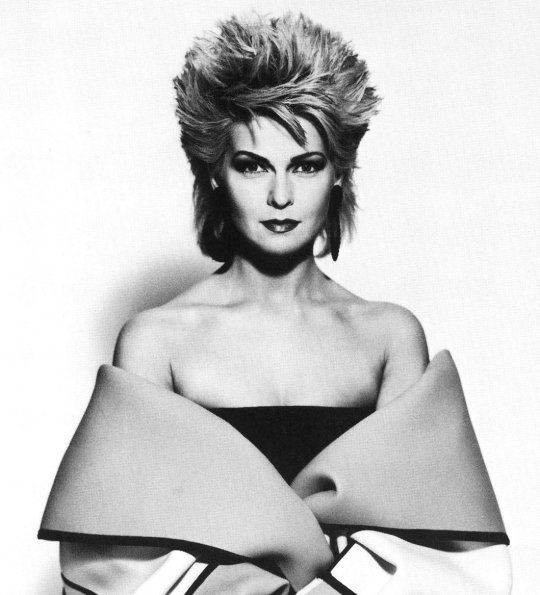
I asked her is she felt she had become more professional in the part year ... TOYAH: Yes, definitely. Until recently I was aiming for a kind of superficial fame than for a standard of work. Then I sat down and thought about what I wanted out of life. I wanted to be remembered as a singer and as an actress. I wanted privacy. I wanted health - I've given up meat and alcohol - and I wanted lasting success. What attracted you most: fame or money? TOYAH: Oh, fame. No doubt about that. When the band first made it we didn't know what had hit us. We didn't even collect our cheques. We were so poor that we walked to the BBC, for Top Of The Pops ... I've got myself organised now. I've got plenty of money, but not much time to spend it. When you do have time to relax and enjoy your millions, how would you like to live? TOYAH: I'd like a great big country mansion with helicopter pad and a swimming pool and every room decorated as a different style. There would be an Art Deco room, a Georgian Room, an Elizabethan room ... I rewind slightly before this nightmare vision. What period would you actually like to live in? TOYAH: Oh, 2400 AD. By then we'll have sorted all our problems out. I think we'll all live away from cities. There won't be any wars, technology will be so advanced as to hidden and there will be no prejudice. What makes you think this will happen? TOYAH: For a start, people will travel more and more, and get to know what each other are like. They won't care so much about their own political systems.
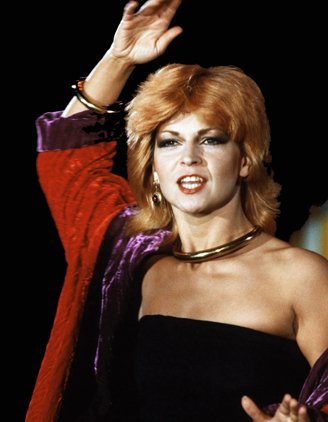
Do you have any political instincts to change the world? TOYAH: No, I'm very politically naive. I read all the papers - from the Guardian to the Mail - but I just can't make up my mind. I think you change people by giving them a sense of pleasure; by entertaining them. You are obviously irrepressibly optimistic. Why? TOYAH: Partly because I'm not worried about what happens to us all when we die. You see, I know that there is some kind of parallel world that we just drift into. I realised this when I once heard my Dad say that he was frightened of dying and I just couldn't see why. Are you still close to your family? TOYAH: Yes. They always laugh about things. When I first dyed my hair, my Mum got a bit uptight and clocked me - I had dyed it white at the back and she thought it had all been shaved off. But when I let it grow back to its normal colour last year, she told me to dye it back. "You'll never sell your records looking like that" - she said. Did you have a wild time in Birmingham? TOYAH: Oh, indeed I did. I was in punch-ups all the time. It's much more normal up there. I got a big shock once, though, when I was twenty. I went out drinking with my first boyfriend, and there was this fight in the pub. I lashed out all over the place, and then went home and passed out. The next day I went round to see my boyfriend; his nose was broken and there was blood all over the sheets. "Oh My God!" I said. "Who did that to you?" "You did", he answered. So I've been a bit careful ever since. I've learnt to keep my mouth shut, for a start.
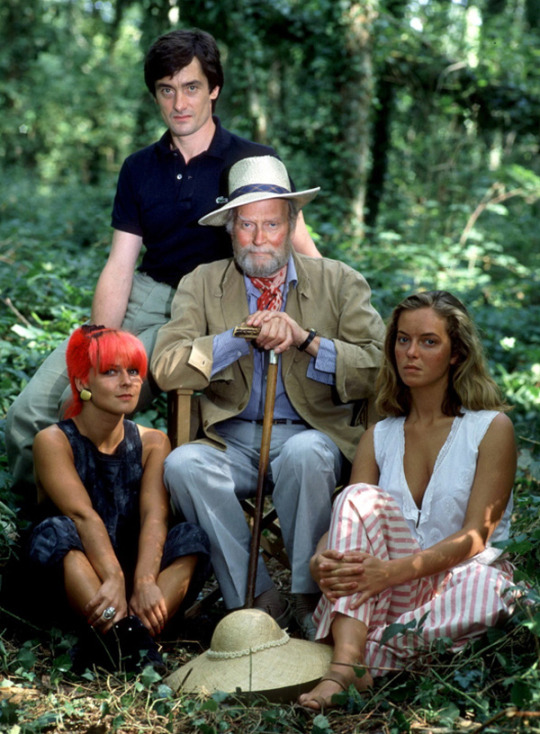
Is that a quality your find yourself in need of? TOYAH: It is. People bother me all the time. For instance, after I came back from France after filming "The Ebony Tower", the press kept wanting to get me to tell them bits of unpleasant gossip about Laurence Olivier (above with Toyah, Greta Scacchi and Roger Rees) But here simply isn't any, you know - he is truly one of the most kind and remarkable people I've met. Did you become very close to him while you were living together on the set? TOYAH: I saw him a lot, because I used to stay behind at the chateau while Greta and everybody else went off to the town; it was incredibly provencial, and my red hair attracted a certain amount of hostile attention. So I couldn't go out much, and Laurence Olivier used to stay behind to keep me company. He was like that; truly considerate. Did you feel at tall tempted to identify with the part of "Freak" in "The Ebony Tower"? TOYAH: No, not at all. It was just apart. The chateau had an incredibly seductive atmosphere, though. I almost cried when I left. What's your next big project? TOYAH: I'm going to tour again. I want to get back to the music world; it's important for me to juggle the two careers. I'm going to tour America, where I've never been. We're going to do both coasts, but I'm not sure about middle America. I wonder how you'd go down there. Last time I was in Texas the best selling song was "Drop-kick Me Jesus Through The Goalposts Of Life" TOYAH: Yes, that sort of thing's really pagan. I'm looking forward to the west coast, though. Won't you find it exhausting?
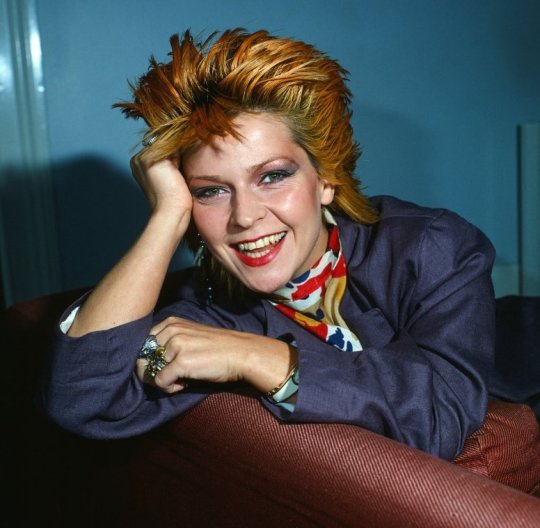
TOYAH: I expect I will. I always lose the upper range of my voice during the last few days of a tour, and that really scares me. It's like asking a guitarist to go on stage with only two strings.
How do you like to relax when it's all over? TOYAH: I paint, or just sit in the garden thinking. And sometimes - not often - I like a good night out on the town. The other day I went to the White Elephant Club, then on to Tramp, and I loved it.
There were a lot of press people, though, and that makes me a bit nervous. The media operates under its own rules, and they are very tough.
Did you ever feel you've been misrepresented?
TOYAH: There are times when I can't even recognise myself in the things that have been written ... but I don't particularly mind. Life's so busy and if you need publicity, you take the knocks. I enjoy myself. We all have a certain amount to put up with and I have a lot less of that than most.
I could believe it; there was something quite disarming about her which probably stemmed from the fact that she was so obviously enjoying life.
"We all thrive on pleasure", she said. "But you have to work at knowing what gives you the greatest enjoyment. It's not drugs, or sex, or parties for me. It's my acting and singing and when I'm too old to do either of those, I'll paint. It's a good life."
#toyah#toyahwillcox#toyahinterview#thetoyahwillcoxinterviewarchive#the toyah willcox interview archive#toyah1985#toyahmagazine
2 notes
·
View notes
Text
TOYAH ON SKY TRAX WITH PETER POWELL APRIL 1985

PETER POWELL: You're very welcome, Toyah TOYAH: Hello PETER: Almost old friends. Born in the same area in the Midlands TOYAH: Definitely PETER: You went to a girl's school, didn't you? TOYAH: I went to a public school, which is a very posh sort of upper class upbringing. I came out of it (puts on a posh nasal accent) talking like this and pretending I was one of the royal family. It was all horrible and I hated it PETER: Did you get anything out of it at all? TOYAH: Yeah, I learned to respect every person from every part of society. I don't think class systems matter, really. I was brought up to be a snob, and I was brought up to look down at my nose at people who worked, basically. I felt that was very wrong I think everyone is equal emotionally, and that's what I learned from the school. It also taught you to go out and marry a rich husband and have lots of babies, and I'm certainly not one of those. I have no intention of ever marrying or ever having babies (Toyah with her dada Beric, below)

PETER: What was your first job?
TOYAH: I used to serve in a kiosk at a very famous department store in Birmingham selling cigarettes. That was to pay for my drama school. I used to go to drama school at the weekends. My parents said to me if I ever wanted to do anything that wasn't something they wanted me to do that I had to pay for it myself. So I had to earn my own keep to go to drama school
PETER: Have you ever been out of work since that first job?
TOYAH: Only once. I went from Birmingham to the National Theater Company and after my contract ran out with them, I was about 19, I was out of work for six months and that was hell. I think to be out of work is the most degrading thing anyone can have if they have the will to work, because work keeps your mind going
I'm a very ambitious person. If you take work away from me, you've taken my life away from me. I was just starved for six months. I starved of everything. Food, culture, the lot. I was felt totally depraved. It was horrible
PETER: There's a cliche which says rock and roll takes over your soul. Do you think that applies to you?
TOYAH: Oh yeah, it's a drug. It's an addiction
PETER: So you're a workaholic, really?
TOYAH:Total workaholic. I just love performing to people, and if the audience is taken away I might as well be put in a nut house in a padded cell, because there's no audience there. It is something that you need. I can only communicate to an audience. I can't communicate very well on a one to one basis. It's a perversion, really. I need an audience there. I need voyeurs there to bring it out of me PETER: Your first experience of working there was in front of a camera, or at least - certainly in drama anyway, in acting ability
TOYAH: I went to drama school full time after I left the public school. I was spotted there after my first term at drama school. I got a lead role in a play ("Glitter", 1976), ironically about a girl who wanted to appear on Top Of The Pops and sing. So this girl had to break into the Top Of The Pop studio and film herself, and that's what the play was about. I co-wrote the songs for it. That was my first acting role

PETER: You've been fairly controversial, certainly quite outrageous during the early days
TOYAH: I think outrageousness should be linked with humanity. I think when you see people that were outrageous, who are not very nice people, I think that they're wasting their time. I think you can still be outrageous, you can still be controversial, and you can still respect human beings at the same time
When I see people these, these dreadful kind of communist types that slag off anything that isn't communist. I think, God, you're just not worthwhile. You're defeating the issue. The whole point is humanity and keeping the human race alive. Human race is number one. Your views fit in around that
PETER: As important as anything else is to remain free as well
TOYAH: Oh, yeah. I can't bear being trapped and I don't like anything that's regular. I don't like regular times and I don't like sleeping regular hours or eating at regular times. I don't like using knives and forks (Peter laughs) I’ve a pair of hands, I’ll eat with those, thank you very much. I think socially, my laws are very bizarre
I'm quite a quiet person, but when you stick me in a party I go berserk. I'm not very good in restaurants, because I don't like knives and forks and chairs either. I could be a bit loud, but I'd never hurt a human being's emotions. I'd never hurt another person, if I could help it
PETER: One of your anthems is “I Want To Be Free” and this is our first look at Toyah as a singer (the video plays) Quite a little anthem
TOYAH: Haven't seen that for ages. It was wonderful
PETER: Nice to see it again
TOYAH: I was young then. Three years ago, I think it was
PETER: In the early days when you were in rock and roll, sort of ‘76 till ‘79 - those first three years were full of excitement. Because you were in films, you were releasing your first singles, weren't you? TOYAH: Yeah, in one year I made about three or four films, which were major movies, and that sort of changed my life. At the same time I had the band going in the punk era, and we weren't really a punk band. We were like a jazz rock band with a very kind of punky image. I spent a lot of time touring England, which was hell for a woman
As soon as you get up North of England, you you're just battling with men all the time. It's very strange. So it was a time of toughening up for me. I lived quite sheltered life in Birmingham and suddenly I was out on the road with a band that were all boys, and I was a woman. I was in punch-ups on stage and everything

PETER: But you actually thrived on that rather macho tough cookie image
TOYAH: Oh, yeah. I think at certain times it was a mask to hide behind. When you're going on stage and people are spitting at you and throwing beer cans at you and things ... I wasn't going to break down. I don't believe in breaking down over something like that. I stood there and took it and humiliated myself to win the audience over
But many a time I was in a punch-up, dived in there and had good old fishy cuffs. It was great (laughs). That shocked the boys a bit. My band were quite often diving in after me to pull me out of a fight so they could get on with the show
PETER: You got involved in another fight, which we'll talk about later on, which was for real. In those years “Jubilee”, which was a very cult movie, part of the punk - TOYAH: “Jubilee” was made in the Jubilee year by Derek Jarman. There was Adam Ant, me. I think even Siouxsie and The Banshees appeared in it. It was a very fashionable movie to make and I think it will come into its own in about five years time. People will watch it and go “God!”
PETER: That’s right
TOYAH: Bit like the Sex Pistols film ("The Great Rock 'n' Roll Swindle", 1980)
PETER: You can still see “Jubilee” now in one or two cinemas TOYAH: It's all over the place. Especially it shows on the late night circuit PETER: And “Quadrophenia” as well, which is exciting TOYAH: Yeah, "Quadrophenia" was a great film for me to do. I met The Who. Keith Moon died just the day before we were due to start shooting, so we didn't actually get to meet him, which is a drag because he was a hero. He was wonderful. But since then I've got to work with (Roger) Daltrey in a film of our own anyway. But “Quadrophenia” was all about the mods and the rockers and that was fabulous
PETER: Another era
TOYAH: Yeah PETER: Was David Bowie ever a hero of yours?
TOYAH: Yeah. David Bowie I think is one of those people - I never want to meet him, and I never want to know him but his work just hits. The arrow hits dead on the on the bull’s eye whenever I hear his work. It just does something to me. Whenever I've done auditions I've always sung “Life On Mars” and always got the part so it's become a bit of a taboo, really, David Bowie and his music for me. There's a video you're going to show “Ashes To Ashes” PETER: We can see it whenever you're ready TOYAH: To me that it's the ultimate video because it sums up Bowie up there (points to her head). It sums up what I always felt was going on in his head. It was this semi-madness. There's the public figure that is quite straight and quite wonderful and chic, but there's this madness up there too, which I can kind of identify with on certain days (the video plays)

PETER: Do you find that songs that you listen to or songs you make are very much part of the mood?
TOYAH: My own songs? PETER: Yeah TOYAH: I like to write from failure. I find if I have something in my life that really gets up my nose or annoys me, that's when I write better. I think it's true when people say creativity can come from failure or it can come from a destruction of something. You can come out with a better writing technique. Usually if I'm dead happy and things are going well and I write, the lyrics that come out of me are sort of bland. You could throw them away, you could burn them. No one would care
But if something tragic has happened in your life, the writing that comes from that - you'll find more people will identify with it. “I Want To Be Free” was written off the back of anger, and it was written off this incredible grudge I had towards having to go to school. I feel that, even though it's a poppy song, and a lot of people find the tune naff, it does sum up a lot of what a lot of kids feel
PETER: In 1981 things were really beginning to happen for you. You were having your first hits, you were already being voted as most exciting newcomer, best female vocalist, best rocker, best hairdo (Toyah laughs) So it was all happening in the space of quite a short time. Did you ever have a chance to sit back, look at the mirror and go “Toyah, what have you got yourself into?” TOYAH: Yeah, I think at the end of 1981 - when you walk down the street and have kids screaming and crying at you, you kind of sit down. You think, God, this is strange. This is really weird. Because when you get down to the basics I'm more vulnerable and more human than any of that lot, and I'm more childish and I'm probably more dumb than any of that lot. Why the hell are they screaming and crying at me? That sort of confused me a bit. I enjoyed it, but it was confusing
PETER: And you’re also jack of all trades to a certain extent? You were acting, you were in films, you were singing, you were touring. You were doing so much at that stage
TOYAH: Yeah, loved it. The more work, the better (laughs) That's the way it's got to be
PETER: Do you remember “Thunder In The Mountains”? TOYAH: Yeah, I remember “Thunder In The Mountains”. I had to ride a chariot, and they were going to have a stunt person ride the chariot for me. I said “no way. I'm going to ride that chariot.” I really enjoyed it
PETER: Do you want to see it again?
TOYAH: Yeah, I'd love to, thank you (the video plays)
PETER: Do you look at these old videos and think, “wow, I've changed!”
TOYAH: Yeah, it's actually that one. When I was a kid there was Flower Pot Men (a kids's programme 1952-53) with (a sunflower called) Little Weed and there's Little Weed going “I’m Little Weed!” and I look like Little Weed in it. So whenever I see it I kind of laugh. I think of this little sunflower

PETER: Again, this sort of macho image of you on a chariot, all that scene TOYAH: Yeah, I love all that. I know it's very butch (they both laugh) Got to have these little fantasies every now and then PETER: When do you think you stopped being a little girl?
TOYAH: When did I stop?
PETER: Yeah
TOYAH: I don't think I have stopped. Because when I'm alone, I'm really quite strange. I like to play hopscotch still and have piggybacks and things when the camera isn't on me. I am still bit immature. I grew up physically over the past few years. I think I've grown up a bit. Not very much, but a bit
PETER: Broken out?
TOYAH: Yeah, the puppy fat’s going a bit. But mentally I don't think I'll ever grow up. I think age is a social disease. I just don't think you have to grow old. I think the body doesn't actually start aging until in your late 50s, so why should you mentally start aging when you're in your 20s? PETER: You said you had a fairly sheltered home life. Did you ever go abroad in those early days? You ever go on holidays?
TOYAH: Yeah, I was taken to Majorca but those are kind of strange days. My brother and sister used take this wonderful delight in getting me very drunk on a drink called sangria. I had my first bout of alcohol poisoning when I was nine thanks to my brother and sister. It's was at one of these weird barbecues. They got me very drunk. So my memories of going abroad are quite strange, because of my my brother and sister’s perversities. But otherwise I used to love going abroad PETER: Europe's a very big area to cover, and you have been out there a number of times in your career?
TOYAH: Yeah, I've toured and I've done TV appearances and things like that
PETER: A good buzz, generally?
TOYAH: Yeah, it's always been bubbling under. I've never been out there enough to fulfill it, which is a bit of a pain. But I hope to rectify that now. Now that I'm with an international company rather than an independent label I intend to tour more

PETER: Good. One of your favorite bands, same as mine. We do have an awful lot in common - Simple Minds TOYAH: Oh God, yeah!
PETER: What's the magic about them?
TOYAH: It’s his (Jim Kerr) voice. It's the video you're about to see now which is “Don't You (Forget About Me)” - it has this repressed energy in it but when I listen to it I'm all bubbling inside even though this song never picks up tempo or anything like that. I like the way (Steve) Lillywhite produces
PETER: Because he used to produce you as well
TOYAH: Yeah, everything's right PETER: Let's see it (the video plays) He's just got a total natural charisma, hasn’t he?
TOYAH: It's not trained perfection. It's a natural thing. Because when you listen to him sing it's it's not always in time, or it's not always quite in tune, but it works. And what I like is that live feel. I feel I'm a live performer, and they've kept that live performance on vinyl, which is something I'm striving for. So I always listen to them whenever I'm recording. I always listen to Simple Minds, because they give me a real buzz. It's great PETER: Hit albums, hit singles over quite a lot of years now and I want to talk about the music side in a moment. But first, just to clarify and clear up the visual side, the acting side of Toyah. You've worked with Sir Lawrence Olivier? (in "The Ebony Tower", 1984)
TOYAH: Ooh, yeah PETER: Who hopefully is known by millions all around Europe
TOYAH: Katharine Hepburn, too (in "The Corn Is Green", 1979)
PETER: Some of the best actors in the world! Were you out of your depth? TOYAH: Oh, yeah. I'm always out of my depth, because I'm still learning about everything. But out of all the people in the world I could have worked with, Katharine Hepburn and Laurence Olivier (below with Toyah and Greta Scacchi) were the most human. They didn't act like stars or anything. They just had this great charisma, and they were very kind people because they kept seeing my imperfections and correcting them, but not kind of putting me down
Katharine Hepburn would, during the scene, have the whole shoot stop, and George Cukor was directing and she says (puts on Katharine’s accent) “Hey George, you know this lady - she ain't on camera well enough” and she'd sort of move me into a different position, so I had the scene. I'd be sort of mainly on camera throughout the scene. She was very giving like that, which is very rare

PETER: Sort of fatherly and motherly passion towards you
TOYAH: Yeah! Totally!
PETER: You held the stage on your own for a considerable length of time in London in a very aggressive stage play, which is called “Trafford Tanzi” (1983) which was all about a wrestler TOYAH: It was wonderful! PETER: You held the stage all on your tod. Was that an experience?
TOYAH: Oh, God, loved it! I think that, to me, is the greatest part I've ever played. I'm very sad it hasn't been immortalised on film but it was good. It was about a girl who has the hell beaten out of her from day one till the day she marries. I learned how to Thai wrestle, which is like kickboxing and Kung Fu. It's a kind of cross between those
Because I'm so small it didn't look right me fighting a fully grown man. The whole play was structured around this girl fighting all the time. But while she's fighting, she delivers the dialogue. “Hello. How are you today?” Which is wonderful. She's really good and I really enjoyed it. It was fabulous!
PETER: I came to see it and so did many thousands of Toyah fans. They're a very loyal bunch, aren't they?
TOYAH: Yeah, they were there every night. You could hear them outside. They didn't always come in the theater, but they waited outside the stage door for me. I used to go and talk to them in the intervals. “Hi, how are you?” They'd nick restaurant tables and chairs from around the area, and they'd be sitting at the stage door, wining and dining. These kind of punk rockers. It was wonderful!
PETER: The nearest we can get to a visual aspect of that is another of your videos which you want us to play. Wendy Williams
TOYAH: I'm not into all her music, but this video sums up how I'd like to make a video. I mean, this woman's really naughty
PETER: It's cool. “It’s My Life” (the video plays) Aggressive
TOYAH: It’s wonderful!
PETER: Fraction rude as well, perhaps
TOYAH: She's a very raunchy lady and a very hard woman. I'm very different to her in that. I don't think I'm as hard as that, but I just admire her PETER: Wendy Williams “It’s My Life”. It's your life. We're almost up to date, actually. 1984 there was another movie which was “Murder: Ultimate Grounds for Divorce” TOYAH: With Roger Daltrey. It was really good to get back on acting terms with him, because before he was the producer of “Quadrophenia” and then suddenly we were making a film together, which was really good

PETER: Is 1985 the time now, the era, for you to come back into the music aspect? TOYAH: Yeah, I'll be touring Europe and I'm going to be releasing regularly now because I'm with a record company that I feel very confident with. I'm just going to start really concentrating on the music for a good decade. I will fit the acting in every now and then. I want to get touring again and doing all that again PETER: Taking the cobwebs out of the system?
TOYAH: Yeah, I just feel that I'm at my best performing live. I haven't done enough in Europe, and I haven't done enough all over the world. As you say I've got to get it out of my system, and I'm going to go out and do it. I'm writing solidly now, which is something I was very lazy at in the beginning. I didn't write a lot, and now I write all the time. I love it. I'm just going to keep churning it out until I look old
PETER: Another hit for you. I've got some smashing pictures to show you, by the way, after this, of Toyah. This is “Don’t Fall In Love”, a new release from Toyah (the video plays) Very simple but very effective video
TOYAH: Yeah, I didn't want a video with a too complicated a storyline, because the subject matter of the song was kind of lovey-dovey, and it was mainly about jealousy and the female aggressor. I didn't want the storyline to dictate to the audience too much. I just wanted a performance. So it was quite nice. And we did it with Terence Donovan, who's a very famous photographer. He made me look human
PETER: Let's just show one or two of the photographs he's done
TOYAH: (in a manly voice) He made me look like a woman
PETER: There you go (shows a black and white photo to the camera) That's one of the shots that was done for Toyah. I hope you can see that. Can I ask you to sign those, if you would, and then one of the other guys on Sky Trax will give them away on the program in a competition
TOYAH: Yeah!
PETER: And also we've got three of these. A lovely color one as well (shows a poster) Very proudly, there you go. So if you can sign those as well, we can send those out
TOYAH: Definitely

PETER: Is this year been the time when you've perhaps matured most? This whole new look is a mature woman, isn't it?
TOYAH: Yeah, but it's keeping up with the time. I don't want to live in the past. And especially fashion wise and image wise I don't like looking the same all the time. I just feel 1985 is a year of progression within fashion that we haven't been through in quite some time. The punk elements kind of hung over the past four years
I want to change out of that and move on to another direction. I don't like being dictated to by fashion in that I had a look of zany colored hair, pink hair. That's not how I want to look for the rest of my life and I just keep moving on with the times, really PETER: Any fears for the future?
TOYAH: Any fears? No, all I care is that Earth remains Earth. Human race remains alive. That's all I care about. There's no fears within my work or my life. That’s all a gamble anyway. But I'm not scared of it. I care for humanity at this moment in time. I can't bear see people blowing each other up
PETER: Well, it's worked for you so far. We're going to play out with Eurythmics which is another -
TOYAH: Annie Lennox is just so brilliant. I mean she's got a brilliant voice, brilliant presence. Her videos are brilliant, and the music's brilliant, so why not play out with her
PETER: Toyah, I’ve never done this before (kisses her one the cheek) I've got to say you're smashing!
TOYAH: Thank you! It's nice to b back
PETER: Good luck. Thank you very much. Bye bye, everyone
TOYAH: Thank you!
Watch the interview on Youtube HERE
#toyah#toyah willcox#toyahwillcox#toyahinterview#toyah interview#thetoyahwillcoxinterviewarchive#the toyah willcox interview archive#toyah1985
0 notes
Text
TOYAH AND ROBERT ON LOVE YOUR WEEKEND WITH ALAN TITCHMARSH ITV, 23.11.2024

ALAN: Talking of royal sisters you had an encounter with Princess Margaret?
TOYAH: I did. I never expected that I'd be invited to Buckingham Palace, to St James' Palace, but I was recording an album called “Anthem”, which “It’s A Mystery” came off, and I got this invite from St James’ from the Queen Mother - would I go to tea and go and meet her? I remember phoning up my mum and dad and saying “I'm going to St James'. This is incredible”
I arrived with the designer Katharine Hamnett, and we were taken into a beautiful salon, and we waited, and out came Princess Margaret and the Queen Mother. Both on separate sofas and they took it in turns to talk to us. I turned out that Princess Margaret wanted to meet a punk rocker (they all laugh) We had a fantastic time!
ALAN: Queen Mother said “I'll get one in!”
TOYAH: Yeah, literally! What I loved about Princess Margaret, because I met her many, many times socially, she was more punk rock than punk rock ever was. She was a free soul, a free spirit. Incredibly witty, very, very clever and really good fun at parties
ALAN: She stayed up quite late at parties as well. What about musical heroes? Who's your musical hero?
TOYAH: Without a shadow of doubt David Bowie. Long time. When I first saw him the effect was life changing. Here you had this man in this spacesuit with makeup on at a time when men couldn't do that. He was groundbreaking. I thought that's what I want to do and want to be. But then he had this incredible body of work from about 1970 right through to 1983
The body of work that he wrote in that period no other artist has matched. Work that just changed the industry so much. Whenever I felt lost or confused, when I was being creative and writing albums I always went back to him. I went back to his incredible creativity and the fluidity with how he was creative, because there was no method that he followed. Everything he did was brand new and fresh and different and just kind of so exciting
(Clips of videos of “It’s A Mystery”, “Thunder In The Mountains” and “ I Want To Be Free” play)
ALAN: Just a few of the low key songs that were the signature dish of Toyah Willcox (laughs) They really did define an era, didn’t they?

TOYAH: This all came out of punk in the late 70s into the early 80s, which became new wave, and that went on to be electropop. So it's a very exciting time in music history
ALAN: Did you feel you were leading or was it sort of going on and you were sometimes keeping up with it? TOYAH: I felt I was leading about 1978, which sounds a long way away, but from 1978–79 to 1980 I was drawing massive crowds to pubs - because we all played pubs back then. 2000 kids would turn up and shut the town down and that was a remarkable feeling
Then 1981 I was asked to record “It’s A Mystery” and that turned my life around. I became an international name at that point. It was at that point that everything was just a little bit more controlled. So when I look back, I'm so excited about that build up because it was so unpredictable
ALAN: But as you say, such a following. It was the thing. It was almost frenzied, really, wasn't it? Not just your performances, but but that whole period was so intense!
TOYAH: It was very intense. But I have to say, I loved every minute of it (Alan laughs)
ALAN: Well, your most recent experience of hopefully loving every minute of it was on “Strictly Come Dancing” as the “Little Mermaid”
(A clip of Toyah on "Strictly Come Dancing" plays) ALAN: It wasn't a long rein Toyah, (she cackles) but you didn't go out in the first week. There you are with Neil Jones strutting your stuff in “Musicals Week”. Astonishing costume. How did you dance with that wig on your head?
TOYAH: The wig wasn't too heavy. They'd hollowed out the center of it. I have to give a big wave to the costume department at Strictly - they are incredible! They have to produce 28 costumes a week. We don't see what we wear, or I didn't see what I was wearing until the day of the show. If that costume isn't working, they take it off you, and they give you something completely different to wear
My favorite bit was the training. We trained seven hours a day. I loved it! I loved the intensity and the focus of it, and then you go to Elstree (studios), and you're just surrounded by noise and makeup and clothes! It's fabulous!

ALAN: It must be tempting at that point to completely forget everything you've ever learned over the last week or whatever
TOYAH: It's quite a pressurized thing. It definitely is quite outstanding in its experience. But I was on with beautiful celebrities. We all really got on incredibly well, and I feel very privileged to have done it
ALAN: Because there’s been quite a bit of controversy about it of late
TOYAH: Of late
ALAN: So you didn't feel in any way threatened at all? You enjoyed the experience?
TOYAH: I've been in this business for 45 years and I have been criticised every day of my life (Alan laughs). So I'm used to it. I'm also used to, as a woman, having to prove myself every day. You just you toughen up to it. I still really believe that it was a fantastic opportunity. Every day opportunities were handed to me and I just worked incredibly hard to make the most of it and I loved every second. It's as simple as that
ALAN: And now you can go and have holiday
TOYAH: Yeah, I've worked with tougher directors. I've worked with George Cukor, who directed Judy Garland in “A Star Is Born”. He shouted every day at not only me, but I was with Katharine Hepburn and they'd shout at each other. I'm used to this. When you're at the top, it's tough. It's so tough
ALAN: As Katharine would know
TOYAH: Yes
ALAN: “The Corn Is Green” with Katharine Hepburn. It's not often you can introduce a guest who's acted with this icon, is it?
(A clip from “The Corn Is Green” plays)
ALAN: To have a part like that with Katharine Hepburn. It wasn't just walk on, walk off - you're having a scene together

TOYAH: We had so many scenes together. ALAN: Oh! C’mon on! Tell us all about her! She’s such an iconic name!
TOYAH: The first meeting I had with her was at Eaton Square in London and George Cukor opened the door. My agent said “you're going to meet Katharine Hepburn and you're going to read this play with her.” George Cukor opened the door and I just thought he was this gorgeous old American man
He led me into a living room. Katharine Hepburn and I sat on a sofa and she said, “I'm very interested in you. You're a punk rocker” and I said, “well, yeah, I'm also an actress. Been in the National Theater”. At this time I was 19
We spent the whole afternoon, at least three hours, talking about punk rock. Eventually I read for “The Corn Is Green” and at midnight that night my agent phoned me and she said “you've got the part. They saw 2000 girls and you've got the part. Katharine Hepburn wants to see you tomorrow to read the whole script”. She was just gorgeous. She told me that when she was the same age as I was, she was non-conformist. She wore men's clothes
ALAN: She did
TOYAH: She loved to wear trousers. She was criticised for it and she said the moment she met me she knew she'd met a similar soul to her and we were pretty inseparable
ALAN: Did you keep up with her afterwards? TOYAH: I didn't keep up with her, but she wrote two books in which I featured ALAN: Oh! TOYAH: She said she fell in love with the fire in my eyes ALAN: What an experience!
TOYAH: She knew I went on to become a really famous singer and she kept writing in all her books “Toyah is now a famous singer, but when I saw her she was a child with fire in her eyes” ALAN: Talking about fire in your eyes, the fire that Katharine Hepburn had in her eyes there when you're playing opposites. The old thing is that if you play a bit of tennis and you play with somebody who's really good it lifts your game. When you're playing opposite someone like Katharine Hepburn that must lift your game?
TOYAH: It did lift my game and George Cukor, bless him, with his incredible history - because he discovered Marilyn Monroe and James Dean. He would favor Katharine in the scenes and Katharine would say (puts on Katharine’s voice) “no, George, I want the camera on Toyah here. This is her moment”
They had this amazing relationship where they would banter and barter and argue. They were both very strong people and Katharine would insist that I had close-ups where probably I wouldn't have got them in that particular kind of circumstance ALAN: Oh! A generous performer then?

TOYAH: She was generous, she was beautiful, she was extraordinary and she taught me more about life than anyone else and I've worked with Sir Laurence Olivier (above) as well. Both of these people were so unique, and their lust for life burnt so brightly it just taught me to treasure every single moment. Every working day, I just treasure it ALAN: There's a great chance in circumstances like that that you'll be completely overawed, intimidated and a gibbering wreck
TOYAH: I didn't know who they were (Alan cracks up laughing) I hate to say it when I met George Cukor and Katharine - I didn't know who they were. When I sat down next to Katharine she told me about the discipline you have to have. Know your lines, arrive on time, respect those above you, be polite. All of those values of early Hollywood ALAN: They've stuck with you, haven’t they?
TOYAH: Yeah, they really have
ALAN: But then so has the music and so has one particular chap with whom you still perform. Here you are at the Isle of Wight Festival
(A clip of Toyah and Robert performing “Heroes” plays)
ALAN: Toyah Willcox alongside Robert Fripp at the Isle of Wight Festival there on guitar. Still alongside Robert Fripp, after 37 years!
TOYAH:38!
ALAN: 38! One behind!
ROBERT has joined them in the studio
ROBERT: And last week was the 39th anniversary of our first date
TOYAH: Yeah, our very first date
ALAN: How did you meet?
TOYAH: Well, initially, we were introduced by Princess Michael of Kent at a charity event (below) ALAN: Oh, give over! It's all name drops on this show!
TOYAH: She grabbed both of us. We'd never met and she pulled us together and said “I want a photo with both of these people”. I got a copy of that photo and it also went into the Daily Express the next day but they’d cut Robert out of it (Alan laughs) If he's badly behaved enough he always makes the papers

ALAN: Now, talking about being badly behaved, there was one instance in “Strictly Come Dancing” where you were very badly behaved. Here's an example
(A clip of Robert booing judge Craig Revel Horwood dressed as Captain Jack Sparrow for "Movie Week")
ALAN: It was hard to see it was Craig under all that beardage and whatnot. But you're sticking up your wife
ROBERT: Well, two things are involved. Firstly, Craig clearly plays the role of the panto villain so what the audience does is boo. Secondly, the principal needs to be established. If you diss my wife when I'm in the room there will be repercussions. So I stood up for the second time and booed
ALAN: Some of the work that you've done, Robert, as guitarist - astonishing work with David Bowie. You can set the record straight. We've had a discussion in here. Is it (pronounces the name differently) David Bauwie, or David Bowie?
ROBERT: Bowie I thought
TOYAH: Bowie
ALAN: That was the majority verdict that’s it Bowie. Working with people like that, from your point of view, again, as a musician, tell me about Bowie, because we don't see lots of him nowadays as much as we used to but an enormous name
ROBERT: A very charismatic man. Bowie met his wife Angie dancing, jiving, to King Crimson's first show at The Speakeasy in London ALAN: And you were King Crimson?
ROBERT: Yes, in 1969. I met him socially in 1972 but really, until the call came in in 1977 ... I’d moved to live in New York and the call came in and it was Brian Eno on the phone. He said “I'm here in Berlin with David. I'll pass you over” and David came on and he said “do you think you can play some hairy rock and roll guitar?”
And I said, “Well, I haven't really been playing lately because I've been on a retreat, but if you're prepared to take the chance, so am I”. And the first class ticket arrived and I flew Lufthansa first class to Berlin
ALAN: To play for Bowie
ROBERT: “Heroes” by the (Berlin) wall and over there, 300 yards away, was the machine gun turret ALAN: Oh, my goodness! ROBERT: Looking in towards the studio. But it was a remarkable in-between time. Berlin and New York were both in-between, liminal places
TOYAH: I played for the American forces in Berlin and the tension near the wall was extraordinary at that time. So I think you doing “Heroes” with that view out of the window, knowing how close these people were encased the other side of the wall - I think it really added to that recording
ROBERT: Yes, there was an edge
ALAN: Yeah, 39 years together then - what's the secret?

TOYAH: (laughs) Well, I'd say for 30 of those we never saw each other! We were on the road separately!
ALAN: That’s the secret, just make sure it's only nine of them you are together!
TOYAH: But now we're on the road together and that's really beautiful. It's really lovely. I love looking over and seeing my husband playing and his gorgeous world accomplished playing it really thrills me. You mentioned earlier that when you work with the greats, they elevate you. Well, I look over at my husband and the love elevates me, but also his incredible ability elevates me
ROBERT: Well, I look over at my wife and within 90 seconds of walking on stage Toyah owns the space ALAN: There you are, compliments flying. So you're doing this tour?
TOYAH: Yes, we are doing our “Toyah and Robert’s Christmas Party Tour.” We start in Edinburgh, we work our way down Sunderland, Bath, Wolverhampton, the Indigo at the O2 in London. It's quite a short tour, but it's going to be quite intense
ALAN: There's a fair chance you'll still be together when you get to the end of it if it's a short one TOYAH: Please! (they all cackle)
ALAN: Toyah and Robert, thank you both very much, lovely to see you!
#toyah#toyah willcox#toyahwillcox#toyahinterview#toyah interview#the toyah willcox interview archive#thetoyahwillcoxinterviewarchive#toyah2024#toyah 2024
0 notes
Text
TOYAHZINE INTERVIEW BY LAURA MARSH 23.4.1981

This is an interview by Laura Marsh, who published five issues of the fanzine in 1980-81
LAURA: Favorite color? TOYAH: At the moment yellow, but it changes every week LAURA: Favourite food? TOYAH: Seafood. Octopus and squid. It's been my favorite for a year now, so it must be good LAURA: Favourite drink? TOYAH: Feshly squeezed orange juice. I have gone non-alcoholic at the moment LAURA: Favourite film? TOYAH: “Suspiria”. It is about a ballet school. It's a normal horror movie. The exceptional things about it are the lighting, the camera work, the music and the special effects. Is three years old, and it flopped because it is a really weird movie LAURA: Favourite book? TOYAH: "Lord Of The Rings" – J.R.R Tolkien LAURA: Favourite TV show? TOYAH: "Mork & Mindy". But I prefer documentaries. I also like watching the schools programs (A BBC TV series called "Broadcast For Schools" covering various subjects)

LAURA: Favourite song?
TOYAH: I do have one that springs to mind, as I have so many. It's "In The Year Of 2525" by Zager and Evans. It frightened me when it first came out. I thought, oh my god, is that true? LAURA: Favourite group?
TOYAH: I like Teardrop Explodes and I like Ultravox. But there is no actual band or group I'd flip over
LAURA: Favourite male singer?
TOYAH: David Bowie and Eno
LAURA: Favourite female singer?
TOYAH: I like Kate Bush’s voice, but not the songs
LAURA: Favourite actor?
TOYAH: James Dean
LAURA: Favourite actress?
TOYAH: Billie Whitelaw. She's got a face like David Bowie, and it's just lovely to watch her speak
LAURA: Favorite makeup brand?
TOYAH: I prefer using Biba and Mary Quant. And there are specialized people I use for stage, which is a makeup A La Carte and Aqua Color, which are paints. I can paint pictures on myself without them smudging
LAURA: Favourite shop?
TOYAH: Swanky Modes for clothes and when I'm feeling very posh and pleased with myself anywhere in South Molton Street, which is a very expensive area - but I very rarely go there
LAURA: Favourite country?
TOYAH: Japan
LAURA: Favourite place?
TOYAH: In England Norwich, because it's so old and crooked and crumbly. Out of England I think the people in Berlin are wonderful
LAURA: Favourite pastime?
TOYAH: Cinema. I love going to the cinema

LAURA: Ambition? TOYAH: Astronaut LAURA: Favourite street? TOYAH: I like driving down Bishops Avenue (in North London). I just can't believe the size of the houses. I do like Kings Road. I like to watch the people, because they keep me in touch with reality. You know what's going on - where people's tastes are going. When I was at the Royal Court Theater, I used to sit looking out the window all day watching the people, all those amazing characters LAURA: Favourite type of music? TOYAH: Electronic music, purely because you don't have to listen to it. You don't have to waste time listening to it. It is just there, and it's relaxing FAVOURITE: Favourite perfume? TOYAH: Yeah! is my favorite, but I would never wear it because I always gas people with it. There is one - Carnation by Flores, which is lovely and there is another one Fleur De Lis by Hobert. But I will never go out of my way to buy perfume, because people think you may wear perfume to hide something LAURA: At what age did you choose your career and what did your parents think? TOYAH: I was roughly nine when I seriously decided. I have always wanted to do both acting and singing, basically because I was a greedy child. I also get bored doing the same things. If you're in music and you get bored ... it shows. The energy dies. My parents said no way. If I wanted to do it, I would have to do it off my own back. They did not finance me in any way, except for sending me to school LAURA: How did you actually start? TOYAH: Music was the priority, but I knew that I would have to start with acting as I was so frightened to sing. I would actually lose my voice if I ever had to sing a solo in the choir. I just couldn't do it. I had really bad nerves. I went to drama school and the reason I went to drama school was not to learn how to act, but to meet people that could help me Within a year at being a drama school, I was virtually spotted by a director, which led me to do a half hour play in which I helped write two songs which I sung in it. It was called “Glitter” with Noel Edmonds and a band called Bilbo Baggins. Phil Daniels played my boyfriend LAURA: When did you first form a band? TOYAH: At the National Theater where I met Joel Bogen. I had some songs that I had written and I wanted to play. It was in the punk era when everyone was picking up a guitar saying they could play, but they couldn't and I wanted someone who could genuinely play. But for a year we messed around and it was not a proper band. After a year, we decided to take it seriously LAURA: What was the band called? TOYAH: I think it was called Joe Bogen’s Boogie, or Joel Bogen’s Army. He had a very large ego that was totally unmentionable. He just stood there playing a solo for an hour while I just started putting lyrics in here and there. But when we decided to take it seriously. I took over and said what direction the band should go

LAURA: How long did (the play) "Tales From The Vienna Woods" last for?
TOYAH: Nine months
LAURA: Did you get on well with Sir John Gielgud?
TOYAH: No. Well, he's a very classy person, very upper class and I was completely the opposite. I was very noisy, very young and very boisterous. A lot of top actors just want peace and quiet backstage. I was known as the “Animal” because I always behaved as if I was in a zoo
LAURA: Did you prefer acting in something like (the film) “The Tempest” or something more like (the play) “Sugar And spice”?
TOYAH: I prefer “The Tempest”. Acting on stage can be monotonous. I would like to act in a film like “Sugar And Spice”. To me films are much more rewarding, whereas a play is over in nine months or so but a film is always there. A film is over so much more quickly, and the whole world gets to see it. I like the memory of celluloid. That's that is what's so great about James Dean and Marilyn Monroe. They are dead, but will never be forgotten
LAURA: Did you find memorising scripts easy?
TOYAH: Very easy. It's a program with me. I treat my brain as a book, and by memorizing lines I sort of write the lines down in my head and as you turn the pages you can read the book. It takes practice, but I'm starting to learn
LAURA: Which did you like best - (the films) “Jubilee” or “Quadrophenia”?
TOYAH: I enjoyed making “Jubilee" more, but I think that “Quadrophenia” was a better film. Even though it was disjointed, it was quite fun. It was the first movie I had ever made, and I was a bit naive. I thought it was the big time when of course, it wasn't. I was among London's elitist people, and as I was quite young I was treated badly, but I enjoyed it all the same
LAURA: Would you ever make a film or video about the band?
TOYAH: Yes, I'm making a video next week for the new single, but not one for the band yet. They are not developed yet as performers. So far the only person who looks good and knows what he's doing is Phil Spalding. He doesn't try - the others tend to try too hard but I will make a video of the band when they're ready
LAURA: Do you prefer the new band to the old?
TOYAH: Oh, god, they're wonderful. Well, with the old band - we all hated each other. We were all jealous of each other. We all bickered and we all wanted to have our own say but this band we all just keep to what we're good at, and we never stop laughing. Life is a complete laugh
We did a photo session for the cover of the new album on Tuesday. I had them all wrapped up except for Joel, he had a gold arm. They all had a gold face, and the others had gold lips and gold eyes. So they were all different. I just had them all wrapped so they look like chrysalises. I'm like a butterfly - the species (is) a Toyah species with all little Toyah’s around me
I’ve got great big dragonfly wings looking very romantic holding this alien head as though I have just had a war. The inside cover is the band as the chrysalises. They couldn't move as they were wrapped up like mummies and they all wanted to wee. It was just great fun. They were so patient. The other band wouldn't have stood for it

LAURA: Will you ever write your own film or play scripts? TOYAH: I'm working on some now but I would never put them on the video until they are perfect. I think that they may be ready after a good three or four years LAURA: Do you have lots of ideas for film work? TOYAH: Oh, totally. The video I'm doing with Lol Creme and Kevin Godley, who did the Visage video, is the idea of a gigantic alien playpen and things have got to get of it – an assault course. It’s partly my idea to have pyramids and things that come out and grab me. I want it to be vastly colorful and incredibly surreal. When I write a lyric I see the pictures first and then I write the words LAURA: Do you find it easy to write lyrics?
TOYAH:Incredibly easy. For the album very easy because the standard of the songs is so much higher, and the standard of my singing is the best yet. For the first time in my life I sound bold. I could never do that before because the music was not of a high quality
LAURA: Did you like making (the film) “The Corn Is Green?”
TOYAH: I liked it but I also found it hard that I was playing someone who was six years younger than me. It was a disciplined film. It was good fun, but yet again I was not accepted as I was young and came from Birmingham
LAURA: Did you get on well with Katharine Hepburn?
TOYAH: She was really wonderful. Her and George Cukor did give me a good time, but the rest of the actors really didn't know how to take me. Patricia Hayes and I used to go around together in a little gang terrorising this town called Betws-y-Coed in Wales. At that time she was recognised and I wasn't
So she kept telling everyone else I was Benny Hill's daughter, because people kept going up to her saying “I saw you on the Benny Hill show” and then she would say “yes, but this is Benny Hill's daughter.” We were followed all around. She was so rude to people who would come up and go “I know your face”. She would say yes 10 out of 10 and stick a cream cake in their hand. She was much worse behaved than I am and we had a really great time
LAURA: What is “The Blue Marigold” about in (the TV series) "Tales Of The Unexpcted"? (below)
TOYAH: It is a very cliche story. It is about a model who has grown too fat and ugly to be a model and is no longer wanted and goes mad. The story is she has a boyfriend who uses her while she's famous and he walks out when she loses her job and that is why she goes mad. 10 years later she meets her biggest rival when she was a model who's now going out with that particular boyfriend. This was the hardest part for me acting wise. I had to play a 30 year old because 30 year olds are neither old nor young. They (the roles) are very hard to portray
I'm not telling you the rest, because it will ruin the story. I put a sequence in. The director was very kind and he let me try and take some of the cliches out. The sequence is in a mental home, which is purely a dream. I'm just in a white room, a baby, who is looking around gormlessly at what is going on. We put a lot of surreal touches in it, points of view from a mad person so it would be quite strange to watch

LAURA: Did you enjoy doing Tiswas? (A children's television series 1974-1982) Even the messy part? TOYAH: Oh yeah, because that's what people don't realise - it’s totally unorganised. I spent most of the hour before I went on running away from kids with custard pies who were trying to cover me. One kid actually got me before I went on. I was frantically wiping custard pie off me because I had one coming from Sally James (the host). It was great. And then suddenly they said, “read this board” and I was in “The Bucket of Water Song”. No rehearsal or nothing. It was great fun It really was my ambition to do Tiswas. I said to Sally James before could my dad come in and put a custard pie in my face? But eventually we couldn’t get him in as he too shy. So I said to Sally would she put it in my face for him. We did an interview about the next tour and eventually she said “this is from Toyah’s dad” LAURA: Why did you decide to add another date to your tour? (5.6.1981) TOYAH: Because the first one was sold out within one week, and I just thought it was necessary. If people want to see me then let them see me because I won't tour again this year so it has to be good. But at Christmas we are doing a big freebie. It might be at Wembley. It has got to be enclosed, as it will be in winter. So it has to be big as we think there will be about 10,000 people LAURA: So how long does it take you to prepare for a performance? TOYAH: I don't rehearse properly with the band. At The Rainbow I didn't rehearse at all. As you probably know I went wrong with every other song with the words so I made them up as I went along. I prefer not to rehearse. I'm so bloody frightened of forgetting them (the lyrics). It really brings the best out of me. It makes me hectic. But for this next tour we will rehearse a lot because I have got a film show and I've got things I want the band to do. The special costumes they will be wearing will make them look better We've got three weeks in rehearsal. The band will rehearse a week without me. I will go in and rehearse singing with them, and then we will be going to Shepperton (studios) to rehearse the actual show, which is vast and a great light show and stage. I will choreograph the band, because they will have to be choreographed. I don't choreograph myself LAURA: How long does it take for you to get ready? TOYAH: Two hours each night. That's more therapeutic than need. I could make myself up in 15 minutes but I have to calm down. I mustn't waste energy before the show so I try to be as still as possible. The best way to do is do it is to spend two hours on the makeup

LAURA: Are you going to change the style of your music? TOYAH: Yes! We have. It shall change for the whole album, a complete change LAURA: When's the album coming out? TOYAH: Mid-May LAURA: What is it basically about? TOYAH: It's a concept album. It does have a story, but not a very obvious story. I have poems to introduce the songs. It's a fun album. The main theme, although it is not a happy theme, is war, love and death. That's pretty usual. It’s a very sci-fi album. It is about space pilots and things like that. The stories are very strong. They are actually stories in music. It is all about spirit of adventure LAURA: And you said that the cover is you as a butterfly? TOYAH: It's me with dragonfly wings, not so much butterfly, having won a war, basically, and the whole album is the feeling of winning. Even though it is about war, it's about winning war LAURA: Do you make your own jewellery? TOYAH: Not all of it. I make the copper pieces that I put on my costumes purely because it is cheap to do that as they get ripped off so quickly LAURA: Do you make the bangles? TOYAH: No, I buy those because they're hard wearing. I lost those in Ireland. The audience took everything I had LAURA: When did you go to Ireland? TOYAH: Two weeks ago LAURA: I read about it in Hot Press (music magazine based in Dublin) TOYAH: Yeah, it did go very well. It was amazing. We were in this hotel that was surrounded by barbed wire yet they (fans) still got in, banging on the door, screaming Toyah! Toyah! LAURA: What about your famous glass eye ? TOYAH: (It's from) Carnaby Street. It is the ring out of "Lord Of The Rings" that Bilbo Baggins had LAURA: Do you contribute a lot to the basic Melissa (Caplan, Toyah's clothing designer in the 80s) designs? TOYAH: I say what direction to go in. Melissa makes a lot of the clothes in material like this (Toyah pulls on the hessian/woolly sofa she is sitting on) I don't like those so ask her to use cottons and drill and tell her to paint them. She made this (tugging on her blue and gold tunic) which is wonderful. In that way I'll contribute LAURA: Do you ever make your own clothes? TOYAH: Well, in Record Mirror - did you see that thing on “What You Wear”? I made that outfit LAURA: The one with the fringes? (below) TOYAH: Yeah, like a squaw. I made that about three years ago. It was one of the very first things I ever wore on stage, and they said that Melissa made it

LAURA: You must be good at making clothes then?
TOYAH: Oh yes, I did it in school. I've got a room at my flat where I make stuff
LAURA: Do you find it easy?
TOYAH: Yes, I never use a pattern as I know my own size. I just cut everything out and stick it together and it comes out okay
LAURA: Do you have a hobby?
TOYAH: Making clothes, making things. I love books with pictures in, not so much reading as I'm such a slow reader. So My hobbies are books, anything creative, cinema and putting my makeup on
LAURA: Do you go out a lot?
TOYAH: No – well, not since the single is a hit. I've not gone anywhere, literally. I went to this big posh restaurant the other day where the waiters are not allowed to bother anyone, as it is a big showbiz restaurant in The Strand where they all go for dinner. I walked in and got bloody mobbed. If you can't even go to the showbiz places, you can't go out. Just driving down the street I'll get kids running after the car. I never go out undisguised
I can't believe it is happening. I've got women going berserk. Some woman hung out of this minibus, screaming and banging on my window. So I said “hello, how are you?” and she went hysterical. I can't go out on my own because of it. They just don't believe you go out
LAURA: It must be hard for you?
TOYAH: No, I just worry about them. Why are they acting like that?
LAURA: I heard you went to a youth club in Redbridge as my uncle runs the place. What did you do there?
TOYAH: I went there to present some albums to people who raised money for the National Youth Club Association, which is a thing I've been supporting over the year. They said there will be about 40 people there, but this building was surrounded by kids, and it turned out to be quite frightening. So I just presented the albums, signed a hell of a lot of autographs and ran because it got really out of hand
LAURA: Will you be getting married? TOYAH: I might do one day. That's all I can say. There is no actual plan. I think my career stepped in the way, and I don't think I can let it go while it's getting on so successfully LAURA: I heard you were interested in the occult. Is this true?
TOYAH: I'm fascinated by it, but I would never practice it. I believe you need to know about things like this because they do exist
LAURA: Tell me about you and “The Necronomicon”? (A book by H.R. Giger)
TOYAH: I was given this book as a present and it fascinated me. The pictures brought back memories of nightmares I had, and they were the actual pictures I saw. I was young, I did not understand some of the dreams. I would love to get Giger to paint the cover of our next album
The interview in the fanzine ↓ Please click on the images to view larger versions
Read the rest of the fanzines HERE








#toyah#toyah willcox#toyahwillcox#toyahinterview#toyah interview#the toyah willcox interview archive#thetoyahwillcoxinterviewarchive#toyah1981
1 note
·
View note
Text
CELEBRITY BRIDES UNVEILED 2009

TOYAH: When I was a little girl I never dreamt about my wedding. I was a tomboy. All I ever wanted for Christmas and for my birthdays was punch balls, guns, tanks. So weddings just weren't on my agenda at all In fact, I probably as I got older and got into my teens and became a punk rocker - and then got into my 20s - was quite phobic about thoughts of marriage and quite phobic about the thought of having a permanent partner and having a family. So when I did eventually get married, I shocked everybody I knew I grew up in Birmingham, which was quite a difficult place for a girl to grow up 35 years ago. Women were forced into relationships and I felt forced into being sexually active. An awful lot of the girls that I knew their ideal was to have a child out of wedlock and get the security of a nice apartment and never get married and get a job. I hate to generalise about it, but that is the environment I grew up in Because I grew up in that environment I was ferociously against relationships. So I got involved in punk and then in music around the age of 14. I knew that I was always going to be very different
I started making my own clothes and started to look very punky. I was very pre-punk. I was influenced by a film called The Rocky Horror Picture Show, which was pre-punk. So I was walking around Birmingham with peacock coloured hair about two years before punk rock ever appeared
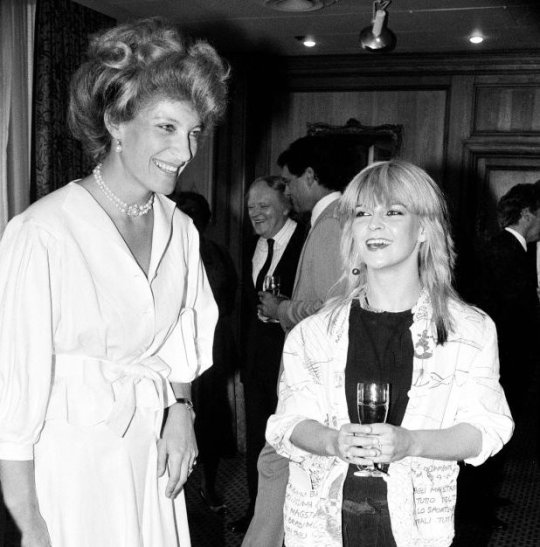
My husband and I should have met at least five to six years before we actually did because we had the same management company. The very first time I met him was 1983, where we shared a taxi to an award ceremony together. He sat on the front seat and I was on the backseat with my manager - our manager. He was very quiet and he had these little round glasses I just took the mickey out of him from the Kings Road to the Grosvenor Hotel, which was about half an hour trip. I can remember my manager just being flabbergasted that I had the guts to just provoke this man for half an hour and I'd only just met him I didn't know that he is in the Top 10 of the world's most famous guitar players. He's a man called Robert Fripp and 1983 he was just like God in the music world. He worked with David Bowie he produced Peter Gabriel. He'd been on Blondie’s his albums - so he was a megastar. The picture behind me (above) is of me and Princess Michael of Kent, laughing at someone joking. And that someone is Robert Fripp, my husband This is the first moment I really got to talk to him because Princess Michael wanted a photograph taken with him and me. That picture appeared in a very famous newspaper the next day with Robert cut out of it, because Robert was never really a celebrity, but I was and that was 1983 - three years before I married Robert So we didn't meet again until two years later, when we met at exactly the same award ceremony. He said to me would I visit him at his home in Dorset and make an album with him, a charity album for children's school in America and I said yes But what I didn't know, and this is very much how my husband works - when we met again in 1985, which would have been around June - July he'd already said to his friends in America, where he lived in New York, he said "I'm wiping the diary clean for the next three weeks, because I'm going to meet my wife". So we'd already had a kind of intuition about this
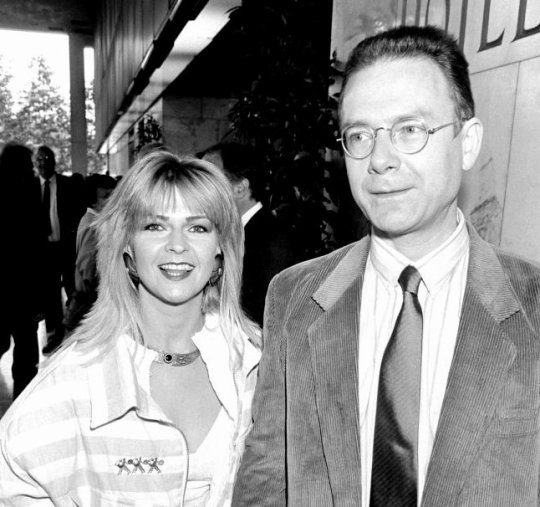
Then the following week after we met and had this discussion, I went down to work with him on this album for a week. He said “will you marry me?“ and “I said it was a bit quick, isn’t it?” He said "no, I know you're my wife. I've been planning this for the last month." And I kind of went "OK, well let's get to know each other" So I actually moved to Washington for three months to the school where we were raising the money for, where he taught, because he also teaches guitar. I went there and taught drama for three months and that was our courtship (Shows the bouquet) I still have my wedding bouquet, which is hard to believe. This dear thing is 22 years old. We keep it in our front room. It was yellow, originally. I adore yellow flowers. So we had yellow roses, yellow Carnations and then Lily of the Valley This is probably the most expensive thing about the wedding - the Lily of the Valley on May the 16th - we're already out of season. So we had to have them brought in from Holland and it wasn't cheap. But I did a little drawing of what I wanted and a friend went along to a florist and got it organised. And miraculously, we have managed to keep it I organised the wedding. My husband didn't want anything to do with any of those traditions other than the church ceremony. So he participated in the rehearsal. We married in St. Mary & Cuthberga & All Saints Church in Witchampton in Dorset where his father was buried, and I think his grandparents were buried We did the rehearsal but that was about as far as it went. I bought the wedding rings, I bought the wedding dress. I cooked all the food for the wedding party. He didn't want children at the wedding. He didn't want any of my friends at the wedding but I insisted on close family Basically I realised that it was nerves. He can't bear big events. I have never had a party since I've been married because he can't bear those kinds of events, which is unusual but bearable. So he didn't want music at the wedding. It was a silent wedding The extraordinary thing was it was on May the 16th 1986 and it’d rained for a month but the moment we arrived at the church, the sun came out and streamed through the windows exactly where we stood at the altar

(Shows the hat) I had the veil made. My sister-in-law had to organise it so no one knew I was having a wedding veil made. That went over the front, it's very brittle and delicate. You've got to remember it's 22 years old, and this big flower went at the back. Now these are back in again today. Back then this was 1986, big things were in. But seriously that went out in the 90s big time. I suppose you would see that in Sex And The City today We managed to have the reception with very close family. And then the precious day ended and that evening and the next day we were hounded. We were chased everywhere by journalists in cars. Eventually we drove off to a Franciscan retreat in Sand Creek in Cornwall, who hid us and we hid that for a week and they blessed our wedding (Shows the garter) This is the garter I wore for something blue and I wore it on my left leg I think, I could be wrong. But there's only two legs to choose from. It was a gift from my husband's best friend. They had it made by a local lacemaker in Dorchester. My husband now keeps this on his desk in his office. (Shows the dress) Because Robert and I were getting married secretly I couldn't order a wedding gown. Because I was paying for everything and basically was not interested in a huge expensive public wedding I had to really ponder of how I was going to be a bride I thought OK, I'll just go buy a ball gown and it was really hard for me to shop at this time because I was incredibly well known. I couldn't go anywhere on my own. So I knew of a kind of debutante ball shop in a town called Windborne in Dorset. I went there pretending I was going to a ball and I bought the only ball gown that would fit me That was a little pink organza Bo Peep dress, a family dress. I didn't want a traditional white wedding dress which was lucky. This is actually a little ball gown, very Bo Peep, off the shoulder puffball sleeves that just rested on the upper arm. Little kind of gatherings at the bottom. So it's very feminine, very pretty indeed I think marriage is cyclical. I think everything in life is cyclical. You go through cycles. And if you can recognise those cycles, you can recognise when a cycle is dipping, and you're in a bad time and also when a cycle is lifting and you're in a good time. I think you only grow to recognise these things if you have longevity in a relationship
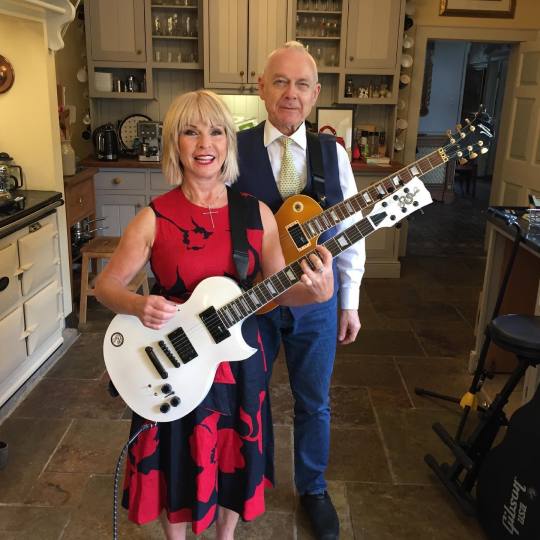
So seven years ago, we found the home we're in now (Toyah and Robert in 2020, above), which is just the most perfect beautiful home in the world in the Midlands. We decided that we wanted to spend more time together and travel a little bit less and just enjoy ourselves. We've worked really hard, not only as a couple, but as individuals as well. You've got to bear in mind we don't have children either so we're not fixed and one of us isn't financially dependent on the other But we go off, we have little honeymoons three or four times a year and just lock the world out and we're just romantic. The one thing that both of us are - we are both very romantic. I love buying him gifts and I love telling him to pack a bag and (say to him) you’re going be in a warm climate. You'll be in a cold climate. Oh, don't worry, you're not going to leave the bedroom for a week. I've kind of I like surprising him and taking him on nice adventures You can watch the programme HERE
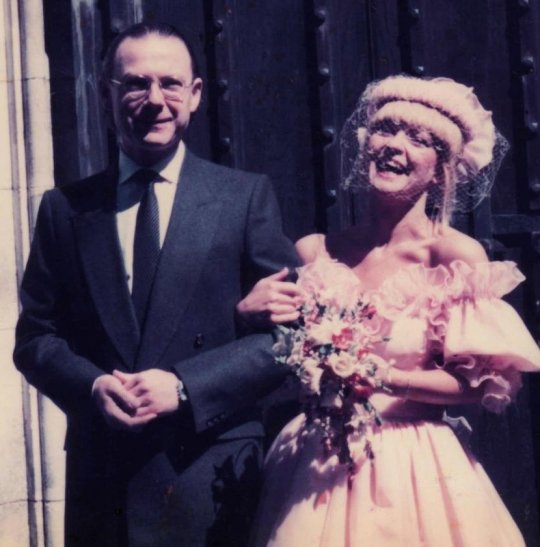
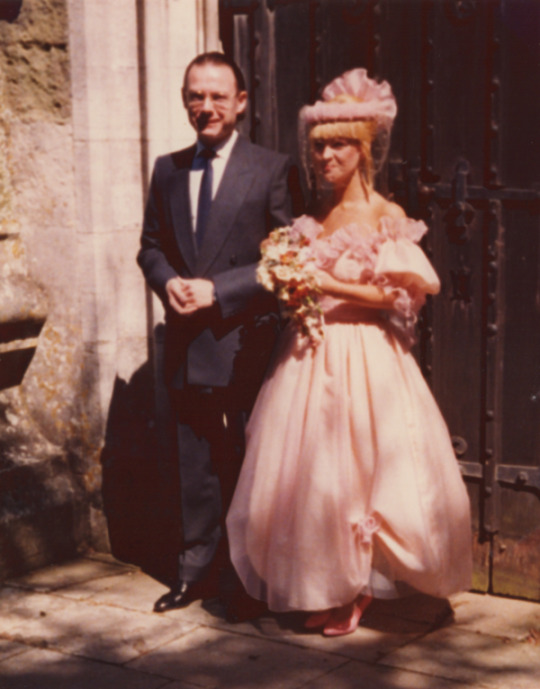
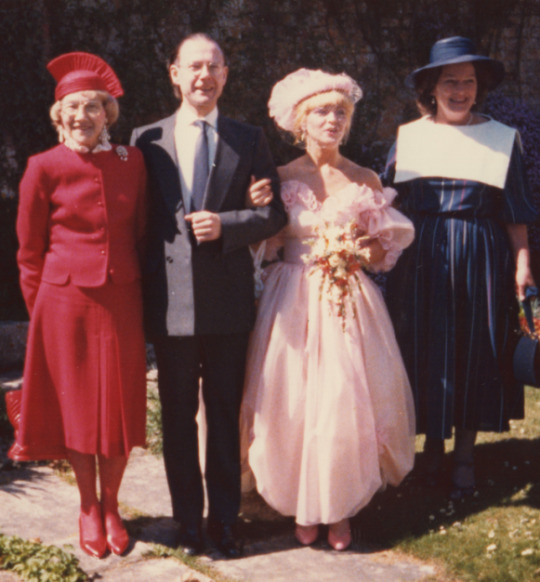
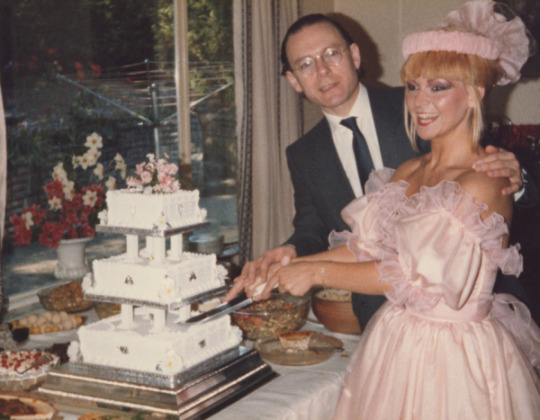

#toyah#toyah willcox#toyahwillcox#robert fripp#toyah tv#toyahtv#toyah 2009#toyah2009#thetoyahwillcoxinterviewarchive#the toyah willcox interview archive
12 notes
·
View notes
Text
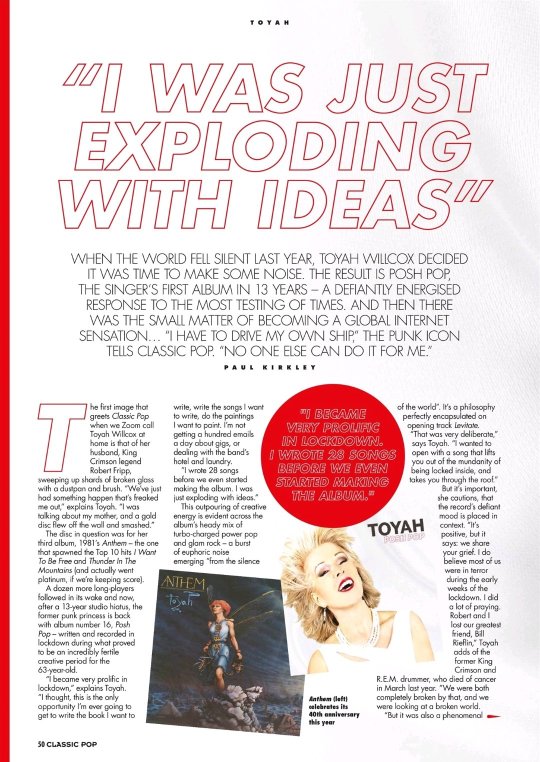
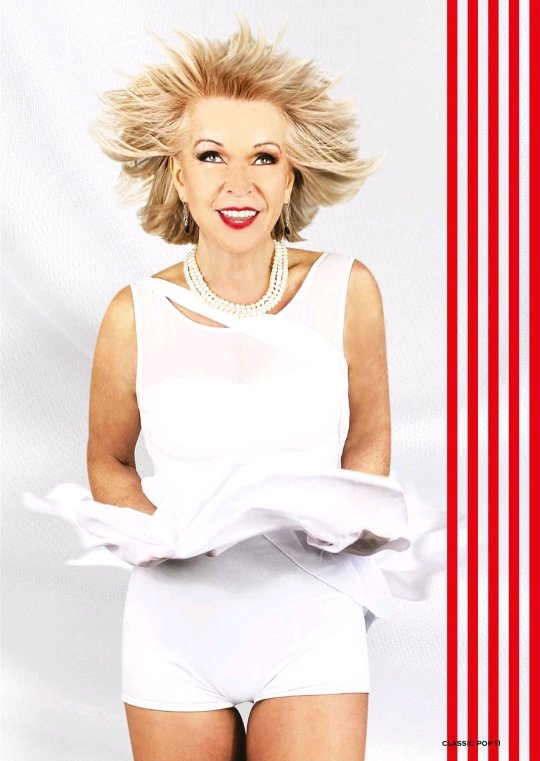
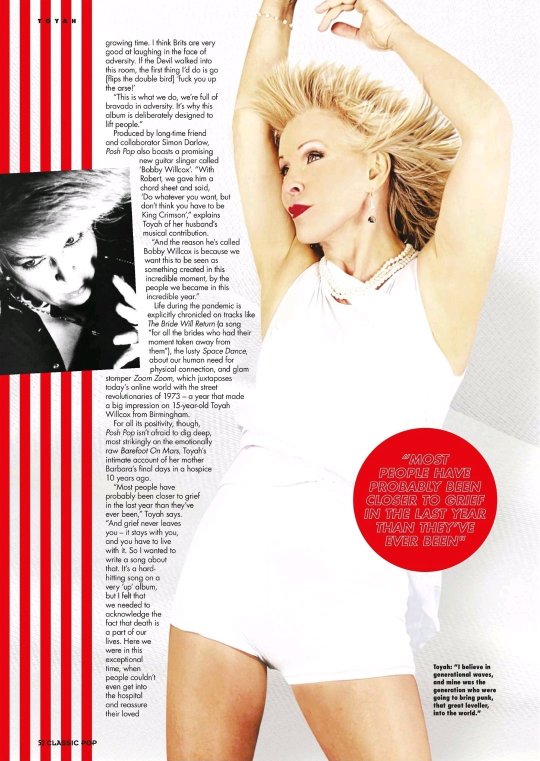
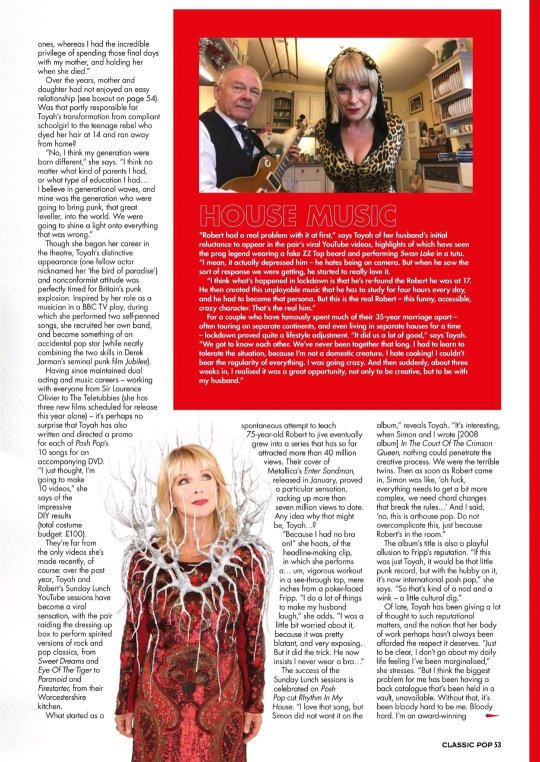
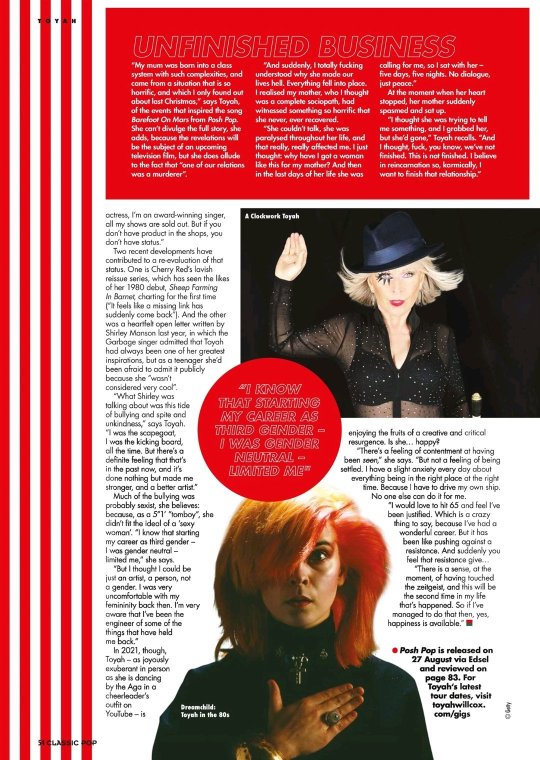
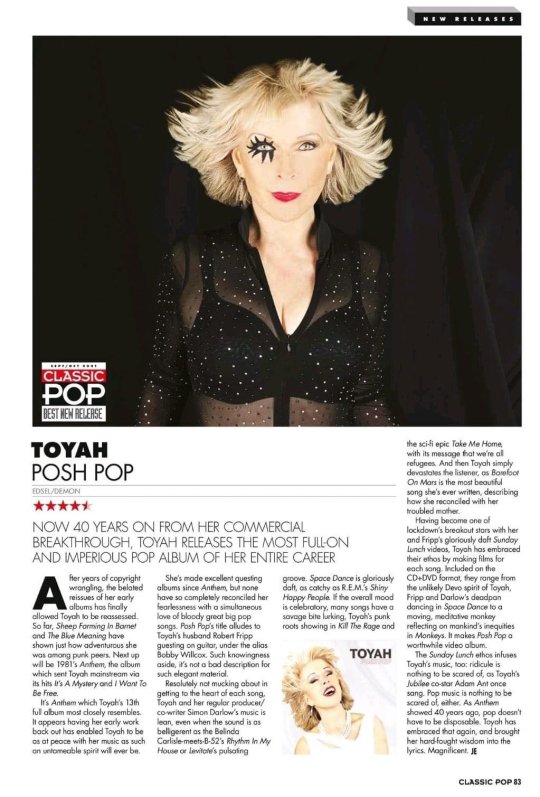
Classic Pop Magazine, Issue 71, Sept/Oct 2021
#toyah#toyah willcox#toyahwillcox#poshpop#posh pop#toyah interview#toyahinterview#toyah2021#toyah 2021#classic pop magazine#classicpopmagazine#the toyah willcox interview archive#thetoyahwillcoxinterviewarchive#new album#newalbum
5 notes
·
View notes
Text
TOYAH ON BBC RADIO SCOTLAND WITH BILLY SLOAN 30.10.2021

BILLY: Toyah Willcox has made her career as a successful singer and actress, and one of her first big breaks on the big screen was when she appeared alongside Phil Daniels and Sting in the film “Quadrophenia”. So was she a fan of the 1973 album first, before being cast as “Monkey” and the movie version of Pete Townshend’s mod rock opera? TOYAH: I was a fan of The Who. I've always been a fan of The Who. I didn't know “Quadrophenia” until I received the script from the production team. And then of course this opened up The Who for me even more, and the extraordinary writing abilities and talents of Pete Townshend. So I've always been attracted to Roger Daltrey’s voice, to the power, to the mod movement and the sheer the finesse of what The Who created has always been very attractive to me. Unfortunately, my career started at a time in punk where punk was opposed to what The Who created, but the energy of “My Generation” and all those songs was pure punk. And suddenly I found myself in “Quadrophenia” as an actress, and I was having to hide the fact that I was a punk rocker. But I always respected and love The Who because they were the original punks. BILLY: How did you actually get the part?
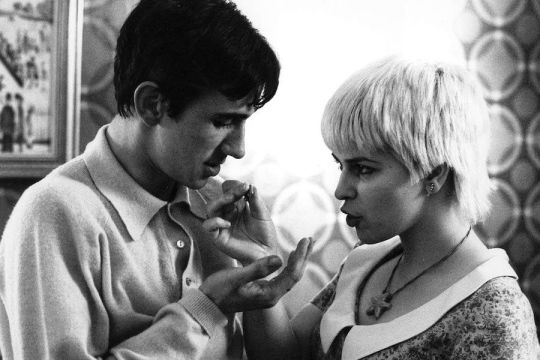
TOYAH: Franc Roddam, the director, asked me to get John Lydon – Johnny Rotten of the Sex Pistols through a screen test for the part of “Jimmy”. So I went along to John Lydon’s flat and ran through the scenes and he was absolutely astonishing. Firstly, he was a gentleman, he was an absolute treat to be with. There was none of that kind of persona of Johnny Rotten. He worked incredibly hard. He knew his lines. Then he and I went to Shepperton Studios where we shot our screen tests. I was playing “Steph”, he was playing “Jimmy”. Then I didn't hear another thing and I was making a movie with Katharine Hepburn at Lee Electrics in Wembley and the production office and “Quadrophenia” was next door. So I walked around the outside of the building and saw Franc Roddam in his office and I banged on the window, and I said “Frank, give me a part because I did this favour for you. Give me a part”. John Lydon by the way didn't get the role of “Jimmy” because no one would insure the film if he was in it because of his reputation in the Sex Pistols. But I knew that Franc Roddam hadn't cast the role of “Monkey” and he called me in and Phil Daniels was in the office at the time with him and Franc said if I could perform the party scene with Phil Daniels, he'd consider me for “Monkey”. We did the scene there and then and I got the job. BILLY: What kind of person was "Monkey"?
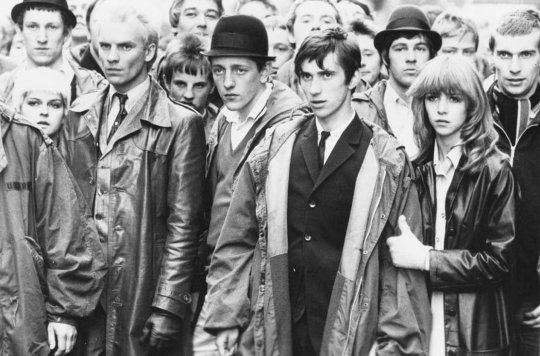
TOYAH: “Monkey” for me was the girl with the golden heart that didn't make good. “Monkey” was a drug dealer because she worked in a chemist and she was just slowly taking all the pills and selling them to her friends. And she wanted to be loved and she wanted to be the number one girl but of course she wasn't, “Steph” was the number one fantasy girl for every male in the film. And we all know who this character “Monkey” is. She's the one that is that girl in the gang, but it's the one with the golden heart. BILLY: And there's a real ensemble cast because Leslie Ash (as "Steph"), as you mentioned earlier, there's also Sting as the “Ace Face.” The cast also included people like a very young Ray Winston, Michael Elphick, who was "Jimmy's" father, Kate Williams, who was "Jimmy's" mother, Timothy Spall. And of course, Phil Daniels. And it's not hard to almost imagine anybody else playing “Jimmy Cooper” other than Phil, isn't it? TOYAH: Oh, Phil Daniels was absolutely perfect for the role. It's the most ultimate character I think he's ever created. He was so astonishing and breathtaking. And even today, as acting has evolved into a more naturalistic form, Phil Daniels was ahead of game. Its perfection and that's why the film is still as powerful as it is today.
And looking back with hindsight now, I think Phil deserved more accolades. He deserved more nominations. But the film wasn't critically well received at the time of its release. And then the audience took it in their hearts and the audience, a generation after generation, the audience has returned to “Quadrophenia”, making it an absolute classic of its time. BILLY: The story of “Quadrophenia” is set in London and Brighton in 1964. And you had to be so accurate, recreating that time period in terms of the clothes and the haircuts and the locations and the scooters. How was that done?
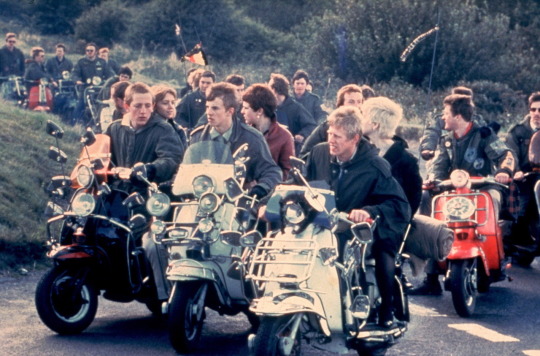
TOYAH: Franc Roddam was a documentary maker before making “Quadrophenia”, an award winning documentary maker and he wanted “Quadrophenia” to feel like a documentary. So he encouraged us to go out and socialise with people who had lived through the mod movement and still had the lifestyle within their lives. So we were going out at weekends and partying with people who've been mods, with people who have been rockers, and they did not hold back on the culture. They really immersed us in it. Also, we were in dance studios in Covent Garden for three hours a day learning the dance movements, which we enjoyed so much, because as I’ve discovered with all great musicians around the world, Sting - great musician, great songwriter - can not tell his left foot from his right foot. Boy, did we have so much fun with that! This beautiful "Adonis" who we spent so much time with couldn’t dance, and we were just drawing focus to it all the time. Wonderful, wonderful man. Other things that we did, we had to learn to ride scooters, we had to learn how to repair scooters, how it is to fall off a scooter. We needed to know all of this. We needed to know the dangers that surrounded us as well as the joys that surrounded us. And we immersed ourselves in this for about three months before principal shooting started.
The incredible thing about the principal first stage shoot - we were shooting the riot scenes first and talk about a baptism of fire. We were in Brighton with 5000 extras shooting riot scenes (below) for 20 hour days. And that really bonded us as actors, because we had to protect each other, look out for each other, find food, find water, find toilets. I mean it was extraordinary. And then we made the rest of the movie, by which time we were a family. And we've remained family. We are one of the closest knit teams I have ever known in the whole of my career. And we remain that way.
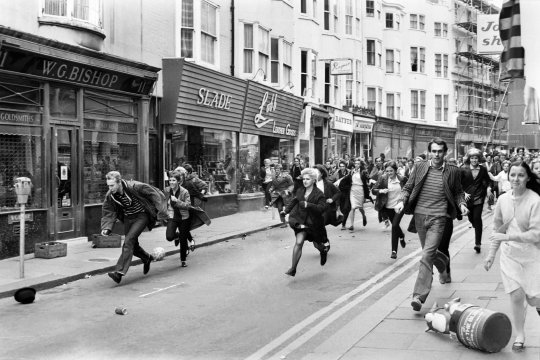
BILLY: One of the other real pivotal scenes in the movie is the dancehall scene where Jimmy is trying to impress “Steph” and he jumps up onto the balcony and then leaps off into the crowd. That must have been an incredible scene to be involved in. Was it? TOYAH: Yeah, I think we shot those in Southall, North London somewhere. It was really wonderful to do and Phil Daniels was completely committed to doing that jump. I mean it must have hurt like hell. I think the first jump he did was into boxes. I don't think there was a stunt person involved. I'm absolutely sure Phil Daniels did the jump in the dance hall sequence himself. It was incredibly good fun because we got to show off our dance prowess. I was dancing mainly with the actor Phil Davies, who I just absolutely adore. It was lovely because within that sequence, all the characters were able to develop and signal to the audience who and what we were by the style of their dancing, which you don't normally get the chance to do in films and the mod dances were just gloriously precise. So all of us got a chance to shine in that sequence. BILLY: During the production of the movie there was some sad news when we learned that Keith Moon had passed away. What impact did that have on both the actors and the film production?
TOYAH: All of the actors were looking forward to meeting Keith Moon. All of us we just couldn't wait. This man was a legend. He was a bad boy, a great drummer. He had attitude. He was everything all of us wanted to be. But the week before we started principal photography, he died. So when I first met The Who and I was in a room with The Who, with the producers, with the rest of the cast for the first time - it was literally the day after Keith Moon died. And the decision was made that the film was going to continue. They did think about discontinuing the film. And thank goodness it was kind of made in his honour and in his memory. But we were all brokenhearted that we were never going to get to meet this legend. And I think he would have been on site every day enjoying all of us and we'd have been enjoying him. And it was a huge loss. That potential was a massive, massive loss.
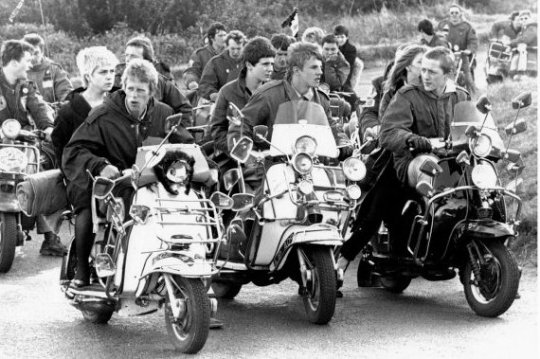
BILLY: You spoke earlier about the lasting affection for “Quadrophenia”. 42 years on - what do you think the legacy is of both the movie and the album? TOYAH: I think the movie is an astonishing film and an astonishing achievement made with no compromise, with great heart. And I think young people who feel diswoned by society will always find themselves and their story in that movie. And that's incredibly important, especially at a time like this where young people have lost a year of their lives. I think the legacy of the music is great music never goes away. Heritage music and music that was there first, that broke the mould first, that inspired many generations of musicians to come, is the music that will remain constant and “Quadrophenia” will remain constant. It's one of those albums along with my husband's album “In The Court Of The Crimson King”, with Sting’s and The Police albums - they're constant so “Quadrophenia” is up there with the greats. BILLY: We're asking everybody who takes part in the programme to choose their favourite Who track and naturally you have gone for a song from “Quadrophenia”. Which one is it and why?
TOYAH: My favourite Who song is “Rain On Me” because of the actual passion. It's about a young soul facing the future, just wanting their own place in the world. There's anger in it. There's hope, there's determination and it's an absolutely beautiful composition musically. And that is the song that I would choose.
#toyah willcox#toyahwillcox#toyah#toyah bbc#toyahbbc#toyahradio#toyah radio#toyahinterview#toyah interview#toyah 2021#toyah2021#thetoyahwillcoxinterviewarchive#the toyah willcox interview archive
2 notes
·
View notes
Text
TOYAH TALKS SHEP FARMING IN BARNET WITH PHIL MARRIOTT 13.11.2020

PHIL: I'm so thrilled to be with Toyah Willcox on zoom! How are you? TOYAH: Woooo! I'm OK. It's really good to see you. I haven't seen many people in the last seven months so it's so good to see you! PHIL: I was just going to say – likewise. The last time I saw you was at Wise Buddha, a studio just off Oxford Street in Central London and we could see each other face to face TOYAH: That was about 18 months ago PHIL: I know! How have you been? TOYAH: I'm really good. Well, I'm really confused because I live in a market town, on a square, one High Street and I'm bang in the middle of all of this. I have a chemist next door, we did have a bank next door but we bought it and that's now our offices. So I'm looking outside my window and there is all normality. There's no sign of any kind of lockdown and I'm wondering if I'm being lied to because I've got people on park benches, drinking coffee, talking to everyone, eating and I'm thinking “I thought this was a lockdown!” I'm so confused! PHIL: It's crazy, isn't it? I went past a bar yesterday and they were walking in and out and my partner said "hang on a minute! It's meant to be lockdown!" I think it was take-away, it just felt like normality, it just felt normal. It's weird TOYAH: This feels normal. None of that terror of last April. Everyone's just having a lovely time out there and I'm thinking someone's played a joke on me because I've been indoors for so long PHIL: We do need it though, don't we … By the way I've been loving your lockdown shows every Saturday. It's been a real ritual. I've been pottering around and then I've been switching onto your Toyah At Home show on Saturday morning TOYAH: Oh, thank you PHIL: It's been fantastic, really enjoyed those. And they've been really honest as well because you've been talking about your life and feeling nostalgic and talking about what's happening at the moment and we don't normally get to see that – you walking around your house, showing things in your house, your books. It's been brilliant
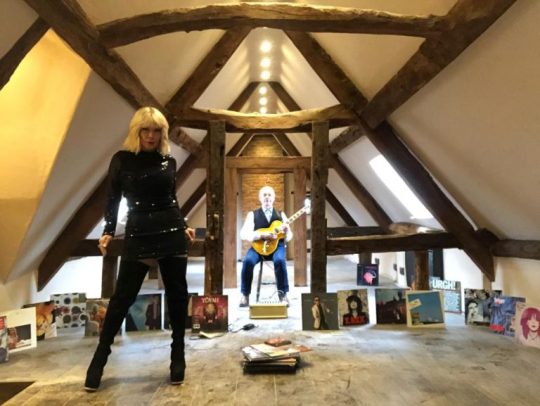
TOYAH: I'm going to keep it up because normally on my working year I'm running an office. I run the band, I run the record side of things, I run the gigs – booking them and I never get time for any of that so it's been fantastic for me and for my husband Robert. We've been kind of been able to address what fans need
That might sound silly because fans just need to see you live and (to) do your music – well, lockdown has proven much more than that. I'm going to try and keep it going and try and prioritise the connection we've made with the fans and stop prioritising the ridiculous amount of bureaucracy we both have to deal with. So it's been great on that level it's been a fantastic year! PHIL: It's been really good for the fans as well like you say because they really appreciate it because they're feeling a bit lonely and isolated and it's good to have that company as well, isn't it? TOYAH: It's been shocking. We do a lot of celebrity messaging. We were a bit doubtful about it at first. We thought "oh gosh is this a step too far?" It's been a absolute joy and occasionally you get the odd message from someone saying "I'm so desperate, I'm so alone, can you just say something to help shake this blackness off me" We've really really loved every minute of doing these messages and also realising that our broadcasts have a deeper meaning than just us going "look at us". It's all become so much deeper and that is beautiful. It's affected my writing. The new album Posh Pop is really deep, it's really passionate and it really rocks and that could only have happened because of this exceptional year PHIL: We have to talk about Sheep Farming In Barnet. I can't believe it's 40 years TOYAH: Look what I've got! (Waves the box set about) PHIL: I know! I can't wait to see that TOYAH: This is an exclusive! PHIL: Amazing! TOYAH: It only arrived two days ago
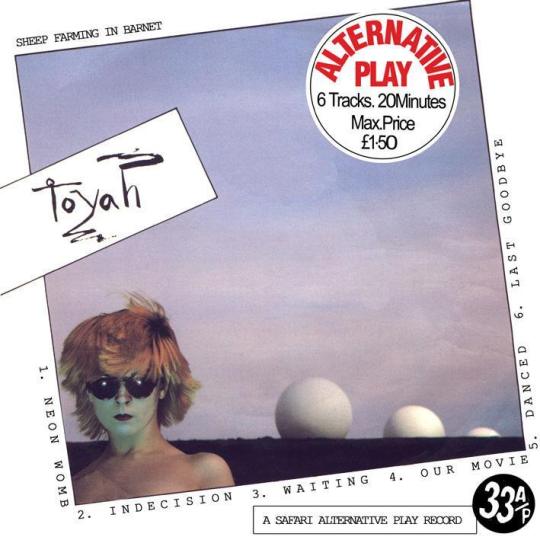
PHIL: It's new images as well isn't it, like you've shown there, new photographs that we've not seen before. This is an album that was released in 1979 as an AP – an Alternative Play (above) and then it was released as an album in 1980 so you're obviously celebrating the 40th anniversary. What are you memories of this though because obviously a lot of stuff gets forgotten about. You've got a very good memory I have to say, watching your Toyah At Home videos. You seem to remember a lot of detail. Do you remember detail of that period? TOYAH: It's shockingly bad. My wonderful archive manager and he designed this, Craig Ashley, designed with Alan Sawyers – he writes a essay about each project. We're already onto Blue Meaning and then we're onto Anthem so we're 12 months ahead. We put this (Sheep) to bed three months ago. My memories were jogged by an essay that Craig had to send me. He knows more about my life than I do. He prompted my memory with this astonishing essay that's in here (shows the boxset) I thought "I did that?! I did that ?! Oh my God!" This is a long time ago this album but what I will say about it – I've always remembered that I think it's the one of the most relevant, one of the most original, ingenious albums of that period and it's never had that credit. Cherry Red (the record company) have really taken this on board and they are giving it the 100%. It's a beautiful album. There's a beautiful innocence but there's also so many pathways we opened for other people with this album. It's a fun album. It's a real danceable album. It's about youthful energy. It's beautiful and it's a side of punk that isn't that well known. It's great. I adore this album
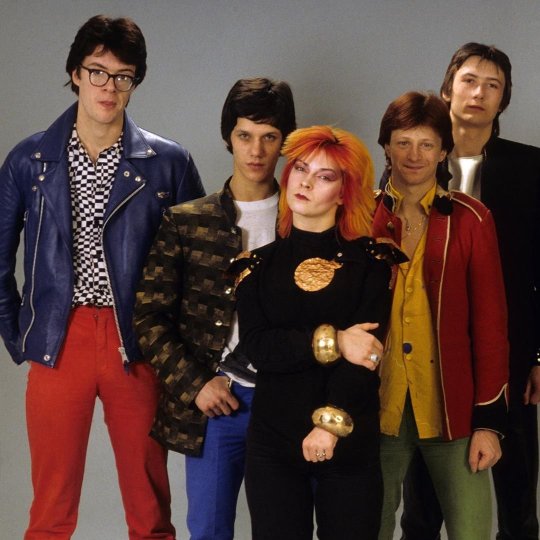
PHIL: So this album was recorded – correct me if I'm wrong – Chappel Studios, New Bond Street wasn't it, in Central London - TOYAH: Yes! PHIL: Which is now the Mulberry store. There's something about quite poignant about that – it should always be that studio I guess but what are your memories of recording there? Do you have many memories of you actually recording it? TOYAH: Next door was Chanel and Hermes and I just pooh pooed them “Who wants to spend that on a handbag?” I don't want to spend half a million quid on a silk scarf. If only I knew, hindsight is a beautiful thing. The studio was upstairs, very very traditional. Almost old fashioned because the studio was a song writer's studio. There was quite a few studios in the corridor I was in. We were one of the first punk acts to go in. I found the whole recording process in this particular instance very difficult because we now know I sing without headphones on. I cannot do that (puts hands over ears) It just affects me emotionally. So this took about four albums to discover that. Steve James, our producer, realised that he was going to get the best performance out of me if he just put speakers in the room and I performed as live. That was a learning curve - it was a big learning curve. So the first songs we recorded - for me – were emotionally quite tough because I was just trying to learn how to work within this dead space. Recording studios – if you haven't been in one – have no sound reflection.
So we've got sound reflection here, I'm surrounded by mirrors, I can hear myself speak but in a studio it's a dead sound. It's really difficult to form notes in that kind of sound so … You asked me what was the experience like? It was a major learning curve of dealing with working within dead sound. Now, if I'm acting and I'm in a studio there's nothing more beautiful than dead sound because it makes you forget about the camera. So it was very very enlightening, it was energetic, we were an energetic team I think it was challenging for the whole band because Keith Hale was brought in as an arranger and that was frustrating for Pete Bush who is the main keyboard player on this album and he felt very threatened by that. But all this rather glorious usurp thing and power play is the result of this album. That and the fact that we honed every song in front of a live audience, which is such a privileged thing to so. We would do these incredible long encores that were as along as the actual show because the audience would never let us go We would run out of songs so we'd start to play them stuff we were formulating in soundcheck and this is how we came up with these glorious arrangements because we knew what affected the audience before we went into the recording studio. That is something that all young writers should have the privilege to do today because to watch an audience affected by a bridge or a chorus – you just know what you need to do as a songwriter. So much of today happens away from a live audience and this is all about live audience work. It was magnificent PHIL: The album title itself – it still raises eyebrows today, doesn't it? Sheep Farming In Barnet. It's one of those really distinctive album titles that really stand out -
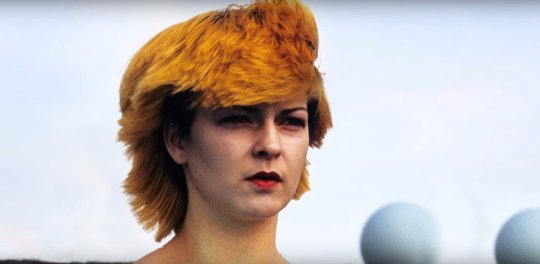
TOYAH: I know! Well, I lived in Barnet and bang in the middle of this urban kind of chaos with the A406 was a field with sheep in it and I just thought "sheep farming in Barnet?" So I wanted to call the album something that didn't relate to an emotion and didn't relate to another song. I wanted something completely out there. This is me (show the album cover) having broken in to Fylingdales - the early warning system - where they had sheep grazing and when we broke in we found an awful lot of dead sheep and we were arrested ten minutes after that was taken Bill Smith the art director was with me as was Gem, my boyfriend at the time and we had to hide the film down my pants. We knew we would not be body searched. We were literally just marched off the premises so we got the film out. So that whole "sheep farming in Barnet" was just a big question mark of what is our reality? PHIL: Is that something you do today? Stuff the - TOYAH: Guerilla filming? PHIL: Just stuff the evidence? TOYAH: Everything? Yeah, everything goes down my pants. As I get older it it's one of my things I do with my personal dementia – everything goes down my pants (Phil laughs) PHIL: I remember NME did a review – I think it was a three star review, it should've been more obviously but for the NME that was pretty good. At the time they called you a "post punk Grace Slick" - TOYAH: I have no problems with being the punk Grace Slick. My goodness that woman was a great voice PHIL: It's a nice comparison. Now, the album was split into two parts – much like Kate Bush's Hounds Of Love which had the Ninth wave as the 2nd part - TOYAH: Yeah! This was 1979! (waves the box set about)
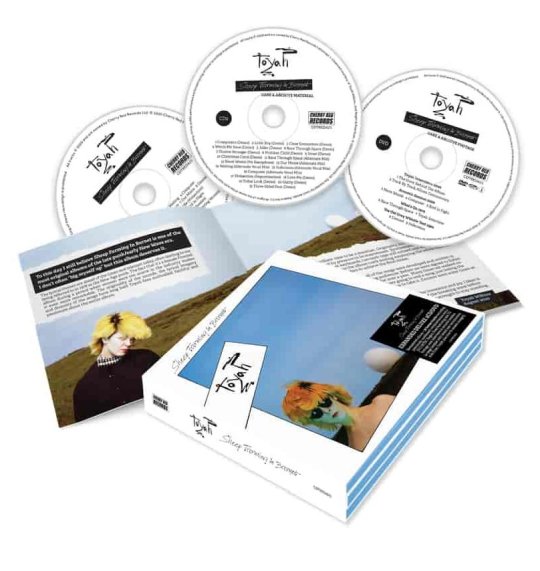
PHIL: I was going to say – you did that before her. Both brilliant albums obviously but this had Heaven and it had Hell and there is a lot of darkness in this album because there's a lot of vivid imagery when you listen to those lyrics. I suppose it's the horror and sci-fi fan in you, is it? TOYAH: It's very dark poetry. I mean Neon Womb is quite innocent. I was making a movie with Katherine Hepburn called The Corn Is Green. I had to get on the tube train. The first tube train of the morning in Battersea which was six in the morning and I had to walk over to Victoria to get the train. And I just remember being alone in this tube that was neon lit and I thought "this is like a neon womb."
So that's where that name came from. Indecision I wrote in my home in Birmingham, the lyrics came there and I was doing lots of TV promotion for the film Jubilee and I just couldn't make up my mind what to wear so Indecision came out of that. And then Waiting is very dark Waiting is about if we looked at the planet and it only had burn layers and every burn layer was a war and you'd cut through them you'd see a very different planet. We wouldn't see a green planet. So Waiting is about layer upon layer upon layer of wars that we've had in the past … Let's say – let's be brave about this – 50 000 years? It's an endless theme on this planet. So that's what that one is about. Danced is about a second coming because I was brought up in extreme religious education by parents who weren't religious So because I was a rebel and because I was really out there as a child and I've always been a bit like this - they thought to cleanse my soul I should go into extreme religious education which I had from the age of about 10 ten right through to 14. So that has affected the poetry of my life a lot and that's what Danced is about.
Danced is saying the 2nd coming is coming – this is fantasy – but it ain't going to be a human being! It's someone coming from up there so that's what Danced is about. I'm always questioning the metaphor of what I've been taught and there's so many metaphor's in this (shows the box set). But I think that's what the fans like is that I use the imagery of metaphors to question things
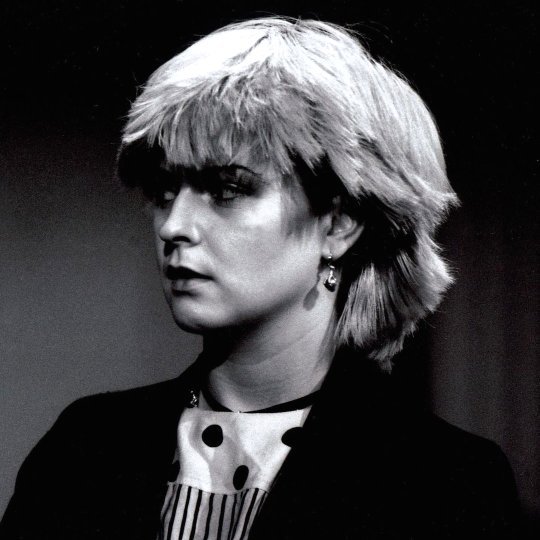
PHIL: And there are so many anthems on this as well, particularly for fans that have been with you from day one. You know, Danced. You mentioned Neon Womb as well. These are real live favourites. There's a couple of of tracks I've never seen you perform live, Computer being one of those. Is that something that you would think about playing? TOYAH: Yeah! In lockdown we had to do the DVD filming (for the disc in the box set). Nigel Clark of Dodgy, my neighbour, came round and we performed Computer. He performed it beautifully, he even did backing vocals and that's on the DVD version of this (shows the box set). It's gorgeous so we could put that in live now but there's so much material, my whole back catalogue, I have to capture in shows today, an hour and half shows I have to capture about 28 albums. And remember 14 of those songs are hit singles. So we chop and change and we try and fit everything in. Computer might come into the show but then we'll get people complaining we can't fit in Neon Womb, Danced and everything else PHIL: Too many songs to play TOYAH: There's just too many songs to play. You got Our Movie as well. I get a big call for Victims Of The Riddle but that is impossible to sing live. It's in an octave higher register than I normally sing in today and also it's one of those songs once you've done the first two lines everyone goes to the bar or starts talking. So we've decided if the fans demand a song and they don't listen to it – we don't do it!
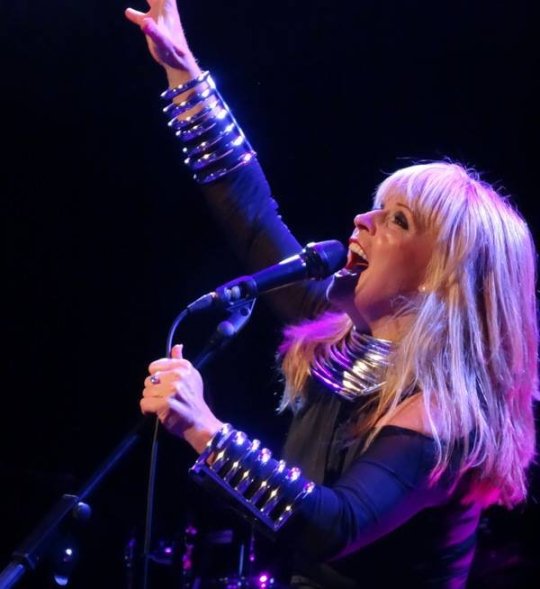
PHIL: I want to talk about the digipak that you have in your hands of this album because it's a real treat isn't it, for fans because there's a lot of versions they've never heard before. We mentioned Computer just then. That sounds quite different in its demo form. Are you quite happy to release these demos because obviously these have never been released before. It's so great to hear these now after so long TOYAH: This is the first album released where Joel Bogen (the original Toyah band guitarist and composer) and myself have actually been corresponded with about having permission of them going on the album. So one of my top selling albums in the world now is an album called Mayhem which is demos that Joel and I never wanted to be heard and ironically that is the world top selling Toyah album
So this time around now Cherry Red own the whole back catalogue they have agreed that will never happen again so we're even re-vamping Mayhem for its re-release. So there are 30 additional tracks, most of them unheard going onto this. It's a double LP and a live DVD and there's even DVD footage that's never been seen before PHIL: It's a real Christmas present, isn't it? TOYAH: It's perfect! PHIL: Yeah! TOYAH: When we do demos they're pre-producer arrangements so obviously when you get into the studio and having heard the demo and hopefully played the song live in front of an audience you can then re-work it. So doing a demo is like trying out a recipe for a cake and if you feel that you can improve – then you improve and most of the time that's what people do do PHIL: So Victims Of The Riddle is your debut single which is featured on this album. There was another version on the single B-side which was called Vivisection. To me that seems like a kind of outspoken view of your hate for animal experiments. Was that the case? Was it that obvious? TOYAH: Yeah PHIL: It was?
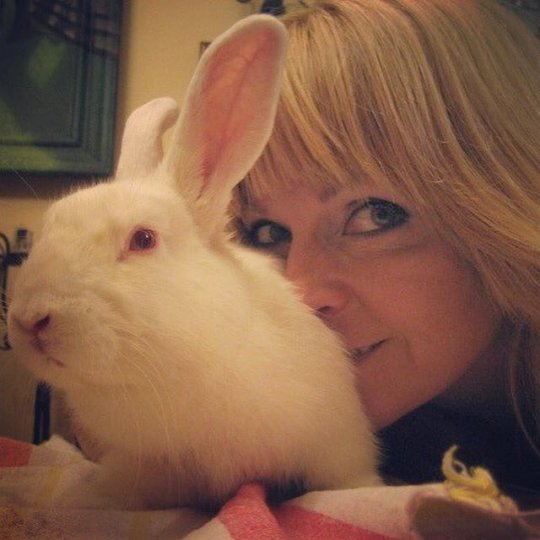
Above: Toyah with her rabbit WillyFred in 2016
TOYAH: Yeah. I like to think it's not so awful today and I think a lot of people, a lot of human beings stepped forwards and said "you can test that on us." So stop breeding animals to test on. So I put my hand up here – I'm against vivisection but I've had hip replacement, I've had life saving surgery for cancer. Animals have paid so that I can live. So it's not as if I've even avoided every aspect of the results of vivisection.
Where my argument is and if the make-up industry - which has something like a £6 billion fund for testing - keeps testing on animals they're never going to change the world and protect and do good husbandry to animals. Now at the time we were making this … '79 … this was … I mean it was rampant. Animals were just being treated so badly I was a very experimental singer in the beginning, I use my voiced as an instrument thus the stylisation on Vivisection. And I wanted to use this as a wake up call to those who didn't know about the cruelty to animals but also the amount of people who were willing to be human test people.
And it was just – if you don't bring that into your audience's intelligence then no-one could do anything about it and I think the greatest revolution we have had in the 40 years is we've stopped buying things unless they adhere to an ethic we believe in.
So good husbandry, non-cruelty to animals, respect for animals, understanding that animals do have souls, they do have an emotional life, they feel pain as much as they feel joy and this was what that was about PHIL: I'm glad you answered that question that way because I certainly saw it as very influential at the time – like you say it was a different time back then, in the 70's and the late 70's. There was a lot more of that nastiness going on and as a result more people have become vegetarian and vegan as well over the years, particularly the last five years people have become vegan which is great. So it's a good shift, isn't it?
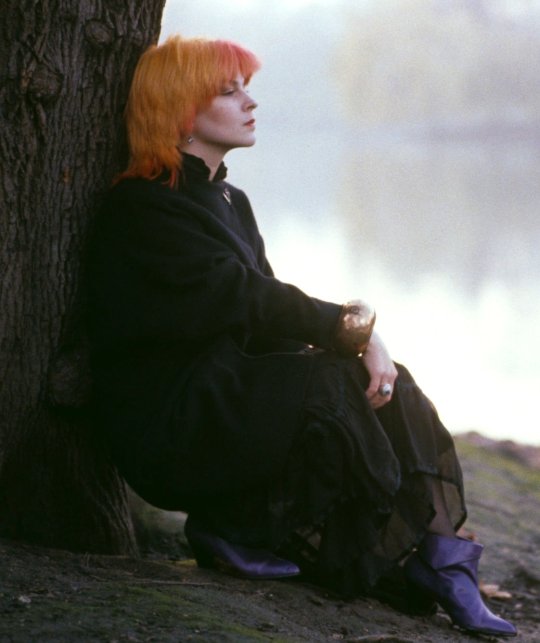
TOYAH: It's very good. I think in a year's time when we have a vaccine for Covid and there has been human guinea pigs involved here ... I think one of the biggest outcomes of Covid and Covid history we probably, worldwide, will become vegetarian. What I mean by that is the easiness within Covid is mutating within the animal circuit and if we keep consuming animal flesh we are probably going to help Covid mutate even more. I'd like to think that one of the kind of strange blessings of this exceptional year is that the majority of the planet will become vegetarian PHIL: Siouxsie and The Banshees did the Kaleidoscope album a few years ago which I saw at South Bank, I know you're a fan as well, of Siouxsie - TOYAH: Yes! PHIL: Is that something that you (want to) do with Sheep Farming? Do it as a whole? TOYAH: (I'll) do it with any album but people want Siouxsie. I've had to - this is my career “Let me in! Let me in! (bangs the air with her fist) “Give me a fucking job!” Siouxsie, you know, gets invited because people absolutely adore her. I'm not on Siouxsie's level but I think what will change for me because in the last 40 years my catalogue has been with a record label that has actively allowed it to die and now Cherry Red- as soon as they announce these releases – I mean this went number one in the pre-order charts across the board and Cherry Red have released the demand is huge But if you don't have the record company behind you and the PR behind you and the team behind you … I don't get invited to play whole albums at the Queen Elizabeth Hall. So I now think this is going to change quite radically and hopefully my work will get the respect it deserves. But it has to be out there for that to happen and in the last 40 years it's just been buried
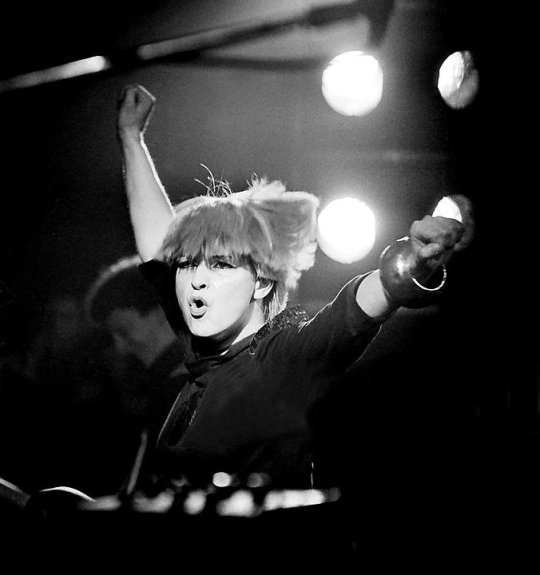
PHIL: Last Goodbye, another track on this album, last time we spoke we talked about your love of horror TOYAH: Yeah PHIL: And you told me watch The House That Jack Built, which I saw after your recommendation and yeah – it disturbed me very much (laughs) TOYAH: That's an astonishing film. There's another one I'll recommend to you and it's very gentle. It's a love story but it also it also tiptoes into the surreal and horror and it's called Border. I just adore this film - PHIL: I've seen it, it's amazing. It really gets under your skin, doesn't it? TOYAH: It's gorgeous. That is like reading a really good book. It translates beautifully PHIL: Absolutely, a very atmospheric film. But Last Goodbye on Sheep Farming – it's quite an evocative lyric. Again quite a dark lyric. There is lightness as well, obviously, on Sheep Farming but I'm just going to read the lyric here : “He points the knife between her eyes. Its light reflects on the one he despises. Here's one for the pain, here's one for the lies. When flood flows out I watch her say goodbye” That is quite - TOYAH: It's a revenge song but I mean this is about the vulnerability of men and men are vulnerable and this is the ultimate revenge. He can take on someone who is more powerful than him and it's a woman. So I always like to kind of invert what people see as normal. I think woman are just as easily aggressive as men are and devious and plotting so it's revenge on someone who has psychologically destroyed someone else.
And I think historically – I need to place it in context – 40 years ago and even 50 years ago you never heard about women's prisons, you never heard about female criminals. It was always men. There were only three that we heard about when I was young that were serial killers. I'm not going to name them, let's not give them the publicity but what you didn't hear was about was petty female criminals, female prisons and female aggression. It was never reported 50-40 years ago as it is today. You know you've got Piers Morgan doing “Female Serial Killers” today so here we were in the punk movement, '79, and it was such an opportunity to be one of the first women in this movement that I could invert everything I'd been taught And one of them is about women being psychologically cruel which kind of covers a lot of the early work. So I was just inverting stories and turning them into myth really. And another thing that was emerging at this time … computers were being programmed at this time on a mass level. So a lot of people we worked with, our roadies would disappear at night to go and do binary programming into computers and this was going on 24/7 to get computers how they are today. So there was this kind of secret technology going on that fascinated us but we didn't understand I mean if we ever knew we would have a phone in our hand (shows her mobile) or we'd be able to talk like this (on Zoom) … that was science fiction. And another thing that science fiction back then … was … oh, it's going out of my head … ah yes! Was how games were developed. So Dungeons and Dragons was very much a fantasy game then and it was the only fantasy game as was – Lord Of The Rings was a book, you never realised it would be made into a really brilliant digitally composed film. So fantasy for me was very very important. It was escapism from a normality that could be not only boring but could also be dangerous so all of that reflects in my work as well
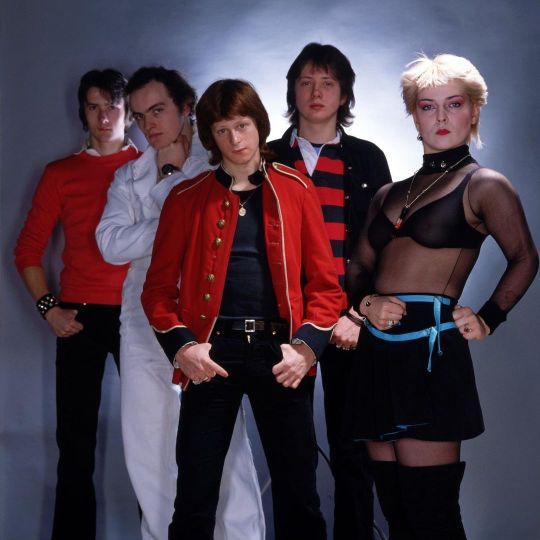
PHIL: I could sit and talk to you Toyah for hours. I know you've got other interviews to do because you've got so much to do in the coming weeks before this re-release, this re-vamp of Sheep Farming In Barnet. It's out on the 4th of December but I have got one last question which I invited people to send in and this is a question from Darren Anthony and he's asked which 3 things, if there are 3 things, would you change about your debut album if you could? TOYAH: Ohhh! Do you know, Darren, this is such a good question and the only thing I would change – because there's a beautiful innocence about this album – I would change nothing about the music. I would've changed immediately the technique I use for singing because I've only in the last ten years really gleaned my 100% technique. And I would … just … how can I put this? If you're a singer you understand “opening the throat”. I would open the throat more, I would've had more confidence as a singer Instead I'd get into the studio and lack of confidence would make me go (pulls shoulders in and head behind hands) I would just close up like that and the voice became quite small. So that's one thing I would change but I can only answer that in hindsight. Elusive Stranger is an incredibly popular song and I would've just not sung the intro in that octave. I would bring that down an octave which would make it far easier to sing live today.
And I can't find a third thing I would've changed. Perhaps the one thing I would've changed about the whole of the beginning of my career – I was very against my natural femininity where women who are hugely successful not only exhibit their femininity but they control their femininity and I saw my femininity as a barrier that I needed to either kind of break down or walk away from. So I probably would exploit it - in the right way, in the Madonna way – my femininity PHIL: I should say it's also out on white vinyl which I've ordered and I can't wait to see that either! TOYAH: Wahey! PHIL: To represent the golf balls on the sleeve TOYAH: Oh, I know! It's a clever design. It's clever. Phil - thank you so much and I hope see you sooner than the 18 months - PHIL: Yes, me too. Good luck and stay safe. Thank you, Toyah TOYAH: Good luck everybody!
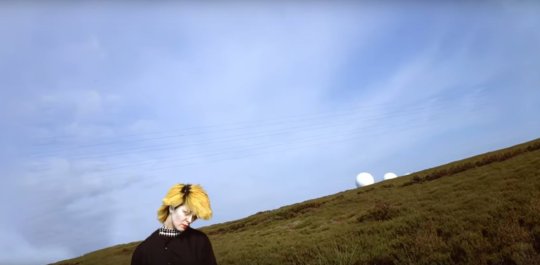
You can watch the interview HERE
#toyah#toyah willcox#toyahwillcox#the toyah willcox interview archive#thetoyahwillcoxinterviewarchive#toyah interview#toyahinterview#toyah2020#toyah 2020
3 notes
·
View notes
Text
CELEBRITY RADIO WITH ALEX BELFIELD 29.4.2019

Recorded at the Ravenshead Village Hall, Ravenshead, Nottingham ALEX BELFIELD: Toyah Willcox, how are you? TOYAH: I'm really good, thank you ALEX: You look amazing and you sound better than ever. I just stood here for twenty minutes watching you soundcheck for a gig tonight and my God! What a voice! I mean it's operatic, isn't it? TOYAH: Well, I trained in German opera from about the age of 14 right through to 18. I keep catching myself talking German although my German isn't great. But that really helped me. If anything it's hard to get it out of the voice because when I have to do the big notes at the end of songs that's when I kick the opera in I have a real ambition to be in an opera one day and I never say never and I don't think doors close. I think one day it might happen. But if I did go into an opera it would have to be really modern and really extreme. Because I am a rock singer ALEX: You're a singer, you're an actress, you're a personality, you're a star at heart. What do you want to be? TOYAH: It's a really good question because psychologically I have to work. If the phone isn't ringing or I'm not creating something I don't really exist. I just sit there … blank. So I always create projects and by creating projects other things come in. Last year I was playing Queen Elizabeth I in the stage version of “Jubilee”, which was a complete surprise. But also it featured my music This year we've got “In The Court Of The Crimson Queen” coming out. It's gone beyond on what we thought would happen. In the pre-order chart it went number one across the board. It's out on April the 12th and fingers crossed we'll get a chart position with that. But it's just been great. In the last two days I've done 50 radio interviews and people are loving the music So you ask what I am? This year I'm dominantly a singer but I'm also doing a movie. I've got a great movie coming up in June. So I just keep on filling that diary and see what happens! (Alex laughs) Tonight we're doing an acoustic show. I like to think that the acoustic is helping me to become a better musician and a singer because when you only have two guitars and three voices you've really got to be spot on It's taught me so much doing this show. We've done it now for five years. We go into lovely little places. This is a village hall near Nottingham, completely sold out. We could've done a week here but it will be magical. We know that because it's up close and it's very personal
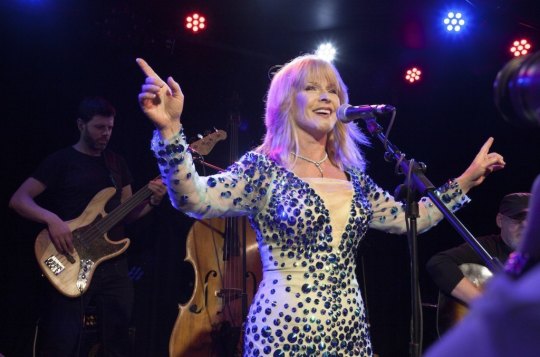
ALEX: It seems like you were born to be on stage. When we look back to your childhood, because you were so shy and so bullied and to stand up on stage today must be a huge strain still, or is it a second home? TOYAH: The acoustic show I love and I know it's going to be good. It's just a magical show. We even had a stage invasion in Otley last week (Alex laughs) There's just something about this show. I think people are so close they go a bit bonkers We do the festivals so we do experience the large audiences, between 30 and 60 000. I'm more frightened for those than I will be tonight. Part of it is that it's so special. You feel the energy. There is a definite change in atmosphere when you've got that amount people in front of you. I find it overwhelming I did a guest appearance in Glastonbury three years ago and I felt as if my feet needed to be nailed to the ground. I just felt as if though I was levitating off the ground. There was quarter of a million people on site and it's just radically different to anything I've ever experienced. So I'm a little bit sensitive to the audience. I'd say I'm more scared in the arenas than I am at the acoustic ALEX: You've got that great thing like Cliff, Cilla and all these people - that you have a legendary status - TOYAH: You think? ALEX: That we only need your first name - TOYAH: (laughs) I'm Toyah – yeah. I think it's very nice that people are saying that I have legendary status. I think it's because of my age (laughs) ALEX: You've nothing to prove, you're working harder than you've ever worked. It must be thrilling and liberating in a way to know that we know what we're going to get. It's a guaranteed cheque when we come and see you, that you're going to deliver? TOYAH: I do deliver because the audience comes first. I don't think I've gone beyond that point where I have nothing to prove. As an actress I've got everything to prove and I'm still learning. The new album is a beautiful album and it's so exclusively me that I want people to hear it and go “yes, Toyah's being Toyah” and that suits me down to the ground But there's always something to prove. Time moves on. Nothing is fixed. I think only your Hendrix and your Bowie and your John Lennons have that "nothing to prove" music that is their legacy. I'm not quite there yet. I'm trying my damnedest but I'm not quite there yet ALEX: I listened to this entire CD all the way through and there were two songs that stood out. It's so eclectic. One minute we've got these beautiful ballads and the next minute we've got you at your height where you're doing outrageous songs and playing the big ballad and the rock stuff “Heal Ourselves” and also “Sensational” - which is literally sensational. I don't think you've ever sounded better! Congratulations on this. It's so beautifully produced TOYAH: Thank you. I write with my co-partner Simon Darlow. I've been writing with him since I was 18 and he was 17. He's worked on many of my big albums as well. We have a very psychic relationship. Put us in a room and things just happen. He picks up a guitar, he hits the piano and we come up with something like “Sensational” in two minutes “Heal Ourselves” came about because at the time it was written we were really conscious about artist's responsibility towards being positive when the world is completely bloody crazy. We wanted to write something that really completely connected the artist to the audience so that became “Heal Ourselves"
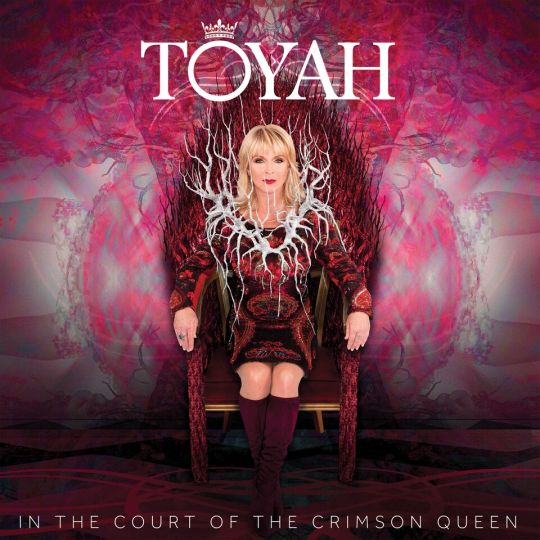
ALEX: You were ahead of your time, weren't you? You walked through the streets of Birmingham, people had never seen anything like it. Was that a divine intervention or was it you being you or was it influence? It's very easy to fit in the crowd but it's very difficult to deliberately stand out? TOYAH: At that time there was no social media, there were no mobile phones, no one could take pictures of me on the street so in a way that made it very easy to be a strange fish in a large pool. I was a hair model for a very big department store from the age of 14 because I had remarkable hair. Very quickly I started to dye my hair all colours under the rainbow and that gave me a very unique identity at the time I didn't know about punk rock in 1974/5. Then a friend said to me “you should really go and see the Sex Pistols” at Bogarts in Birmingham. I really thought up until that point I was the only punk in the village. I was in a room with 350 kids who were all dying their hair, all making their own clothes. I thought “where were you?! I'm been so lonely so many years! And here we all are – the tribe" It was a very lucky time for me. From about '75 into '76 right through to about '85 everything fell in my lap. It was to do with this being unique and being quite strange and not fitting in to the mould. I ended up working with Laurence Olivier, Katharine Hepburn, John Mills, Diana Dors. I had three platinum albums. It was just utterly remarkable ALEX: And what a great time to be alive and working. I don't know if we started today we would have the same stories. There are those type of legends around you can speak of and people take in a breath TOYAH: I think I would've found a way. If I was in the world today as a teenager I would've been on social media, I would've been on Youtube. I would've found a way. I was a pretty outrageous kid and I've always liked challenging taboos and there's still plenty of taboos to challenge. That's the biggest advice I give to anyone on Youtube. Look at the taboos and break them ALEX: What is it like being a woman in 2019? Where are we at now? It must be very difficult because we've got #MeToo and all of that. What would you have thought of that if that was around in the 60s? Does it help or not help? TOYAH: Oh! If we had #MeToo in the late 70s, which is when I kicked in ... oh boy! It was unbelievable being a woman in very much a man's world. Especially doing northern Working Men's Clubs, especially going even north of the border. I don't want to put these places down because they were great to play and the audiences were fantastic … but you were just groped. The whole time – left, right and centre. Just groped. I think there's even photographs out there where I'm being groped At the time there was no #MeToo, there was no voice for how you felt. What #MeToo has done is given vulnerable women a voice and to point out when these situations have happened. I have felt no need to take part in #MeToo because to be quite honest I just used my fists. There's a few men out there who would happily use #MeToo on me (Alex laughs) I just smashed them in the face I had no qualms about that at all. There are other singers who are renown for doing that too. Today I think it's rather a fantastic time for women because I think women can be sexually very open. They can have multiple partners if they want multiple partners. It was quite hard to do that 30-40 years ago They can be gay, they can be straight, they can choose their gender. I think that is all really healthy. What I would like to see is that that can happen without anyone batting an eyelid. Because really I think it's nobody's business what your sexuality is and what your gender is. I've always fought being seen as a person. I think that is on its way and that's a good thing
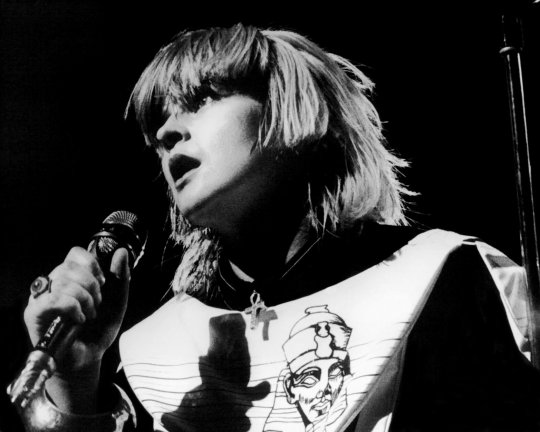
ALEX: It is depressing in 2019 as I sit here shocked that men would just come and grope you. It's incredible to me as a 39 year old man. I can't imagine a world where that existed but that was the case Was that ever the case with the management, the record companies and the producers around you? Because even when you'd left the club you'd still have to face it? TOYAH: There's some extreme, very one off, on their own things that happened … My band really looked after me. I remember getting to Leeds, sometime in 1979, to a club and it was height of the fear of the Yorkshire Ripper. Firstly I arrived at this club and my wonderful lighting man said to me “do not stay here alone. The club owner thinks he has a right to sleep with you. Do not go anywhere – not even the ladies (room) - without one of us escorting you" So that was cool. This is what my band did – they looked after me. Then I tried to walk to the B&B and a police car picked me up and they said “you can't be alone” - because of the Yorkshire Ripper. My generation lived through that because no one knew who and what and where the next strike was going to happen As for the casting couch – one very remarkable one was - actually, I feel quite proud of - because this director was the legendary Russ Meyer of "Valley Of The Vixens". I was actually sent to an audition for one of his films in the late '70s No idea what I was in for! I arrived at the audition and I was asked to take my top off. I just put two and two together and I said “this ain't for me” and I walked. But that happened in those days! It did happen. In a way I'm really glad I met Russ Meyer because that kind of “Boogie Nights” age of movie making is no more. And I was almost a part of it ALEX: How incredible. I wonder where you got that tenacity and confidence from? Was it your parents, was it your family? Where did you find that from within you? To stand up and walk out. Most people wouldn't be that brave … TOYAH: No, it was just no problem walking out on that one! ALEX: That's extraordinary. Some women may not have made that choice, which they could've regretted forever. You had that within you. I wonder where that comes from? TOYAH: Well, some women would've wanted that job. I just didn't want that job. It wasn't hard to walk out on that one. For me knowing that I was not tall, not particularly feminine and that I had to just be individualistic. I knew that was how I was going to survive. Which made me very bombastic and full of bravado I just knew I haven't got the feminine card to play. If I could go back into the heavens when I was being conceived and I could choose the body – believe me I would've chosen a supermodel body because I think they have an easier life. I got this body and I just decided that I had to be very tomboyish – which I am – but I knew that was my way of surviving ALEX: I don't think you can see you as the rest of the world sees you. You are a sex symbol. My father for instance (Toyah cracks up laughing) thinks you're delicious I don't know why you constantly in interviews always say that you were fat and ugly and not pretty as a child. You know you are now, right? What have you got to prove today? TOYAH: Back then I was three stone heavier. Today there is nothing wrong with that. Back then in the movie industry and the music industry … as soon as I signed on a label I had to loose that weigh. I was complicit. It was absolutely fine, I didn't mind at all I lost it when filming “Quadrophenia” because we were on so many amphetamines to get through that film! (they both laugh) All of us were popping pills like … aarrghh! It was a fabulous experience! But back then it was expected of you. I had a dietician, he weighed me weekly. I was weighed before I did Top Of The Pops I was complicit, it was absolutely fine. It was the every day and what you've got to remember is I had songs to write, I had scripts to learn, I had venues to get to. We were permanently in front of the cameras. On one day I could do a photo session, five interviews and a two and half hour show. It was just full on. The creativity meant more to me back then and there was no sense back then of eating clean, eating healthy. You were going to live for ever Everyone felt they were going to live for ever. If you told someone that you needed to eat clean to have longevity you'd go “nah, that's just rubbish”. We were just eating whatever we could get our hands on and it wasn't much in those days. Vegetarianism was a hard thing to follow in those days. I can remember getting to Manchester on a Sunday and finding nowhere to eat. You could just about get a bag of chips and that was it So those kind of things back then you didn't consider. All you considered was the speed and the competitiveness of getting an album finished, getting the best tour on the road and then starting all over again
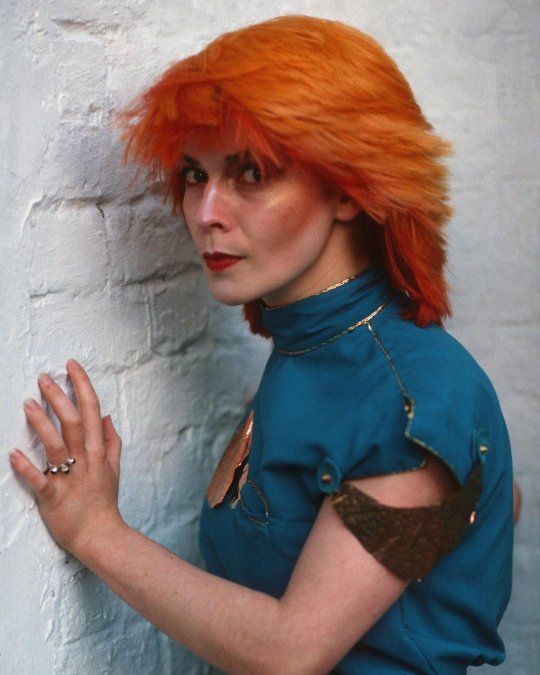
ALEX: You've achieved so much in your career. 24 albums and 40 shows you've appeared in, over 30 films. It's a remarkable legacy you're leaving for the world to enjoy Has it been fun? You've had one of the most blessed careers. You've always been in work, you've always been relevant and it's always been good stuff. That's the trickiest thing, isn't it? We can all work but is it good stuff? TOYAH: It's the only life I know. I couldn't be any other way and I don't feel I've actually arrived yet. I can only put this in perspective and this is a direct quote from Lulu on Radio 2. Someone asked her a similar question and she said “I'm hoping to be discovered” and that's what it feels like! (Alex laughs) I totally agree! I don't feel I've arrived yet. I'm not known as a film star. I have lovely cameo roles in films and I work in films. I also help co-produce and finance for films, which I love. I'm very passionate about all of that Funnily enough everyone knows who I am and I'm legendary … I only feel now, and about to turn 61, that I'm arriving. I think that's thanks to my writing partnership with Simon Darlow, because if “In The Court Of The Crimson Queen” was my swan song I am very happy with it There's songs on there I'm just so proud of like “Dance In The Hurricane”, “Heal Ourselves”, “Legacy”, “21st Century Super Sister”. I am really proud of those songs so I think I'm only arriving now. It's good because I'm not sure how long I can keep doing it for! ALEX: Are we going to sit down in another ten years at 71 and you're going to say the same thing? At what point are you going to give yourself a break and look down on your CV? There's a lot going on there, you must be at least proud even if you don't think you've arrived? TOYAH: I'm very proud of surviving (Alex laughs) I am definitely a survivor and I've survived with very little support. I've done virtually all of this myself with my musicians. I manage myself because I can't find a manager, I cant find a PA. No one wants the lifestyle I have! Let me put this in perspective. I'm in the office from 8 in the morning until about 4 in the afternoon, drive to the venue, do a gig, drive home, back in the office until 4 in the morning. That's the schedule. No one wants to be a part of that. I have to find people with an equal amount of insomnia that I have. It's hard but it's wonderful ALEX: People forget that you have to run a business to make it a show. That's what you've done all of your career. You've had to be the person fighting forwards because if not you're quickly forgotten TOYAH: Yeah, I agree with everything you've just said. Also I think a lot of artists don't realise that if you're not on top of the business side that's when problems come in. It's as easy as that. You just have to keep an eye on everything. I do admit that most business people are slightly scared of me because I pick things up very quickly (Alex laughs) “Excuse me, what's that in the contract? Excuse me!” ALEX: Are you less feisty now than you were in 1975 for example? TOYAH: I'm more intelligent than I was in 1975 – ALEX: More diplomatic you mean? (laughs) TOYAH: I don't fly off the handle as quickly as I used to and I'm really good at negotiating. I even have other agents and other artists phone me up and say “could you negotiate this?” And I go “c'mon! Grow a pair!” (Alex laughs) ALEX: It is a tough world to survive. Turning 60 … what did that mean to you? Was it personally thrilling that you made it to sixty (Toyah laughs) and you look the way you do? Did it matter to you professionally? TOYAH: Yeah. I tell you the biggest surprise – and it's been twelve months of surprises – on my 60th birthday my audience downloaded me to number one in the charts and that's what's kicked off all of this That led to Demon Music signing us on a contract, which is the first time I've been signed to a label in about 40 years. Then it led to adding the five new songs on “In The Court Of The Crimson Queen” and it's going at the speed of light! Sixty so far – and I've only got one month left being sixty – has been one of the best years of my life
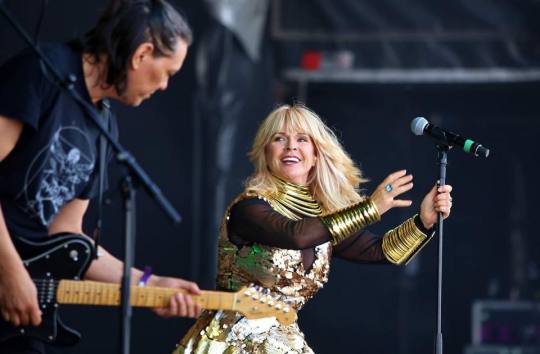
ALEX: I asked Ken Dodd if he'd ever retire when he was 89 and he said “well, what's the point? You only retire to stop doing what you don't want to do and I'm doing what I want to do" Are you doing what you want to do? TOYAH: Yes. I am doing what I want to do. Did you know that Ken Dodd had a clause in all his contracts that he couldn't go on beyond midnight? ALEX: Well, he never listened to it though. He paid the fine! TOYAH: He used to go on until six in the morning! (Alex laughs) That's more energy than I've got! ALEX: That old school ethic is inspiring. He wanted to put on a show and he wouldn't get off stage until he felt he'd done that TOYAH: It's absolutely remarkable – that dedication to his audience. They knew they were in for the night. I think they used to bring pillows and picnic hampers ALEX: It was great! Of all the people you've worked with – give me a couple that were a thrill for you? TOYAH: I've ran away from David Bowie twice because I just couldn't handle his presence. The first time was when he was appearing at the Milton Keynes Bowl. I think that was about 1983. Phil Daniels of “Quadrophenia” and I were backstage and we sneaked on stage. We were sitting on the runway going up to the stage. Bowie walked off stage and came and sat right next to us and Phil was going (mouths silently) and I was going “oh my God, oh my God!” (Alex laughs) and we ran! The next time was Bowie approached my husband Robert Fripp and I at an event at the hotel Intercontinental on Park Lane, about 1986. Bowie came up and asked Robert to join Tin Machine. I stood there and I just “... aaah ...” (looks lovesick) and just backed out of the room. I couldn't take it! His aura was so immense it went into yours! It was breathtaking ALEX: Have you put your finger on what that is? What do these people do that I don't do? TOYAH: I don't know but there's some very special people out there. Mick Jagger and Keith Richards are a little like that as well ALEX: Or is it just your mind putting onto them what your thinking about them? Are they doing anything? TOYAH: No, some people have incredible power. Laurence Olivier had that and Katharine Hepburn had that. Sting in a way has it but when we made “Quadrophenia” with him we were all in his hotel room learning the harmonies to “Roxanne”. He was incredibly encompassing, he was very kind good man But some people just have this aura that blows you away! I had to sit with Zack Efron for an interview once. Gorgeous boy! Absolutely gorgeous but I could just feel the aura pushing me out of the picture … (Alex laughs) ALEX: And then of course when we look back on all of the work you've done. Is there anything like that pin focus still? Can recording a CD compare with standing on stage performing it live? TOYAH: Every time I do a recording I expect it to be the best thing I've ever done. Every time I walk on stage I expect it to be the best show I've ever done. That has never changed. Recording a CD you always think about the connections it's going to create. Therefore you're thinking and hoping and expecting that that is going to connect you to a future. It's always been the same, its never been any different ALEX: You're a remarkable talent, you've got a stunning voice and audiences never cease to be amazed by you. I love the new album. “In The Court Of The Crimson Queen” is just wonderful and as I say “Sensational” is truly one of the greatest songs I've heard in a very long time. Your voice is so precious. Be less hard on yourself You seem to judge yourself more harshly than we do. We think you're delicious (Toyah laughs) and we think you're incredibly talented and we think you've done quite enough. Nothing to achieve, it's already great. Stop pushing! TOYAH: Ooh! I don't know about that. You have to push to a certain extent to do certain things. Especially to get in the big movies. You'd be amazed how hard you have to push to do that. I don't think I'll never give up hope on all of these ambitions ALEX: You're an inspiration, especially to young women. If you look at what you've done and how you've done it – against all the odds really … If you look at your background and your own perception of yourself. It's an extraordinary achievement. You know that, right? TOYAH: I am very conscious how important it is to give young women, and even just young people, a positive message. My generation did have it easy in comparison to today. We could buy houses, we could buy cars. I feel very very responsible and conscious of the fact that we have to give people hope That's a big message within “In The Court Of The Crimson Queen”, especially within “Sensational”. That the world is yours, it just needs to be slightly reorganised and you're going to be the people to do it ALEX: Shall we bother talking about Brexit? TOYAH: It's a mess that can't be solved! It just can't be solved! (Alex laughs) Whoever gets that chalice is going to be poisoned ALEX: If there is one woman who can sort it out it's you! TOYAH: I'm clueless! (Alex laughs) I don't know how they're going to do it - ALEX: What about a Prime Minister? You'd make a marvellous job ... TOYAH: No, I wouldn't. Really. I don't have that knowledge (Alex laughs) I'm not good at being criticised and having negativity thrown at you 24 hours a day - ALEX: You can't win either way at this point, can you? TOYAH: You can't win either way ALEX: Toyah, thank you so much for your time. You're such a legend and a star. Have a wonderful evening TOYAH: Thank you Alex, good to meet you You can watch the interview on Youtube HERE
#toyah#toyah willcox#toyah interview#toyahinterview#the toyah willcox interview archive#thetoyahwillcoxinterviewarchive#toyah 2019#toyah2019
7 notes
·
View notes
Text
BBC RADIO 2 WITH JASON MOHAMMAD 30.6.2019

JASON MOHAMMAD: Good Morning! TOYAH: Hello! JASON: Fantastic to see you! It's going so well, you were in my home city of Cardiff, at the Acapela TOYAH: It was crammed to the rafters. It was 40 degrees in the venue. It was like performing in a sauna. It was fabulous (laughs) JASON: Did the Welsh crowd treat you well? TOYAH: Oh, they went absolutely bonkers! We're getting so many standing ovations. It was really gorgeous. At point, when it's so hot, I'm so thankful for them being there, for being awake! (laughs) JASON: Thank you so much for coming in to see us. You're going to play some live music with your band ... By the way, who have we got here this morning? TOYAH: We've got John Humphrey on percussions, Chris Wong on guitar and Andy Doble on keyboards JASON: Nice too see you. What's it like being back on the road and you've got a record out as well, Toyah? TOYAH: I've been on the road for 42 years (Jason laughs) But I suppose the present phenomena with me started in 2002. I was performing in a theatre in the West End and I got a fax saying “do you want to play Wembley Arena?” I thought it was a joke. It was one of these big 80s line-ups and I've never looked back Then slowly the dedicated Toyah following has been building up over the last ten years. My latest album “In The Court Of The Crimson Queen” went straight into the Top 10 two months ago. The first track we're going to play for you today is my next single off it. It's coming out on July the 17th. It has just been an absolutely stunning year - JASON: The single is “Dance In The Hurricane” - TOYAH: The year has gone crazy! It's just been fantastic JASON: You're on social media as well. There's dangers in it but people engage with you, Toyah -
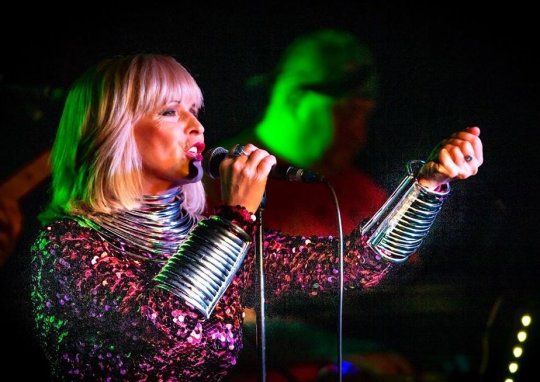
TOYAH: I am blind to negativity. I just don't bother with it. Life is so precious, time is so precious. Music is multi-generational and this is what I do. Accept it. We need to learn acceptance in a lot of how we go about our daily lives. So yes – I do do social media but the delete button is very active. I just don't pick up negativity and we can talk about this in a minute. My mother was particularly negative and I've learned to survive and it's as simple as that. We are all gloriously miraculous just being here, floating on a rock in a very immense universe. No one's going to tell me I'm not good JASON: I heard someone say “don't be negative. Give yourself shot at the title”. I'm so going to use that every day - TOYAH: We're here for a purpose. No matter what you do - we're a part of a greater picture. I think negativity can just stop you. It stops you moving forward and believe me - I have my own battles with myself. It's very evident in my music. The best things come in life when you're positive and you see that the glass is half full rather than half empty It may sound glib and easy to say because we all have to fight our dark clouds but I think that life is so precious. Especially when you get to my age. You just don't want to waste it! JASON: Very true. You must get that positive energy from your crowds as well? TOYAH: For me the most rewarding part of my life is on stage where there is no mobile phones, there's no e-mail, there's no distraction. It's a very extraordinary experience which I'm grateful for You do feel moments where everyone in the room is one and it's like a phenomenal meditation. You can just feel their energy tuning in and I am so grateful for that! It's very powerful
JASON: What about this latest record then that you're going to play for us. Is it about something specific?
TOYAH: “Dance In The Hurricane”, to be brutally honest, is about overcoming the grief of losing your parents. I lost my parents ten years ago and my life has never been the same. I'm still really only finding my feet but I believe grief makes us strong and “Dance In The Hurricane” is a song of victory over grief
JASON: OK, we'd love to hear it
(They play “Dance In The Hurricane”)
JASON: Toyah, that was absolutely magnificent! As a parent you've kind of touched me here. I was very emotional listening to that, especially the words “be loud, be heard, be proud”. Such a powerful message in that record -
TOYAH: We've got to tell our children that they inherit the world -
JASON: Absolutely! That's exactly it. The challenging world, go out there and be loud, be heard and be proud.
Are you going to do another record for us in a moment?
TOYAH: Definitely
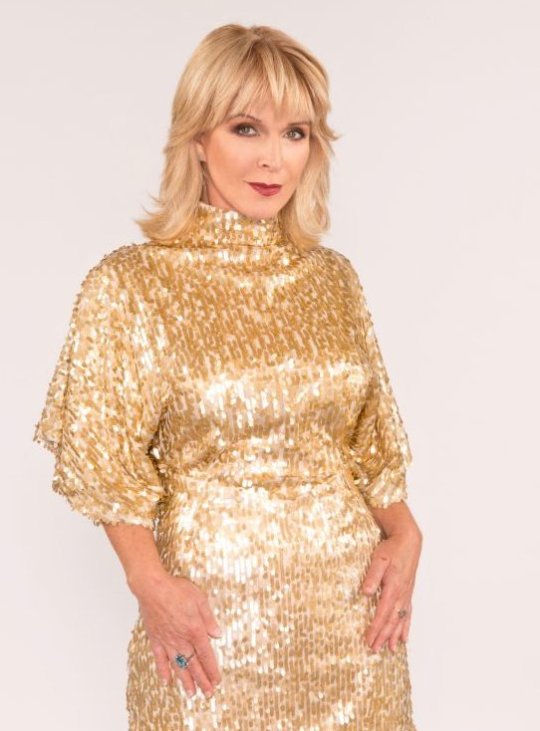
JASON: I just want to ask you about Glastonbury. Have you done it? TOYAH: We were guests with PRS (Stage). We played there about three years ago. It was magnificent. You arrive in this massive kind of city of people and you can feel it! It's very wonderful! And so upbeat! That might sound strange ... I'm scared of big crowds but everyone was so happy! JASON: It is that sort of vibe. Can I just ask you about about music as we get older ... I often have a conversations with my kids - “can we put something else on?” Am I getting old or is that something that happens when it comes to music? TOYAH: It's your experience talking. We've all got this mammoth library of experience in us and we've grown up with absolutely brilliant songwriters. The Beatles, The Stones, Led Zeppelin … I mean they're all utterly brilliant and these young people are going to discover that eventually. When I look out over the crowds that we play to at festivals the majority of the age is under 25 and they've just discovered us. They will discover the music you love Personally I don't think there's such a thing as bad music. I think generations just need their voice and you can't take that voice away from them. That's the divide between you and your children JASON: Yeah. I took them to see Elton last week - TOYAH: Oh, I'm so jealous! I saw “Rocketman” last week, the music is so profound! JASON: They loved it and they got into “Rocketman”. There was a lad, about ten years old on his dad's shoulders. Elton is banging out “Saturday Night's Alright For Fighting” and this kid is singing the words back to Elton. That is just so powerful, isn't it, Toyah? TOYAH: That's storytelling writing, isn't it? The 80s was very similar that we told stories about the listener to draw the listener in. Elton's “Yellow Brick Road” about going back to the farm, going back to your roots … I found that so powerful because I only got a change to hear the lyrics sitting in a cinema watching the film. I was like oh, my goodness! Because we do in a sense return to our roots so many times JASON: And what about those musicians who criticise younger singer songwriters - no names being mentioned. Is that fair? Are some of them accurate? TOYAH: Well, the one musician you're mentioning is actually an incredible songwriter. I think if you are the best songwriter in the world you have the right to criticise. I'm still learning. I learn every day - as a songwriter, as a human being I'm still learning and checking myself all the time. I've been writing music for 42 years and it's a journey without an end. I would not judge someone else's writing because it's the process of being creative that's important We have to remain a creative society. If we're too busy losing ourselves in our phones we're going to lose a cultural strength because we are all brilliant at expressing ourselves. We must be encouraged to go deep and express ourselves and that's what songwriting is If I was to criticise I would say go beyond the telephone and listen to Elton John, listen to Rolling Stones, because the depth of what they're saying is so truthful
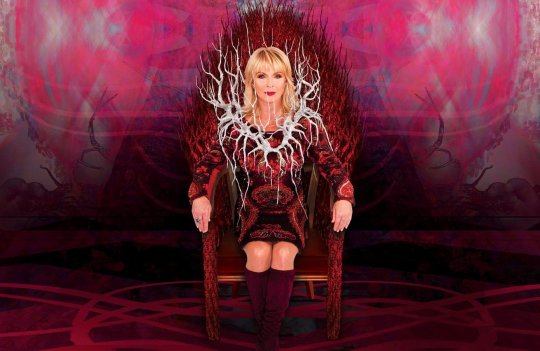
JASON: Absolutely. Great advice. What are you going to play for us next? What's the significance of this next record? TOYAH: This is a really important track to me. It's off “In The Court Of The Crimson Queen”. Simon Darlow, my co-writer and I wanted to submit it to the Paralympics partly because I've had to learn to walk again three times I was born with a spine defect so I know what's it's like to keep running up that hill and get back on your feet. We wrote “Sensational” because we felt it was important to write about that everyone is utterly remarkable. No matter what body shape, what height you are, where you come from ... We are sensational and this is what this song is about - JASON: Fabulous! Let's hear it. Thank you, Toyah (They play “Sensational”) JASON: Love it! Toyah live here on BBC Radio 2. Lot's of our listeners are getting in touch. This is lovely - from Sally, who says “I'm absolutely loving Toyah's music. We miss both of our parents very much indeed” ... but your words have provided comfort for them this morning - TOYAH: Yeah. I'm so sorry. It's the hardest grief. But you learn to live with void. That's the only way I can describe it. You're never quite the same again but something quite amazing happens with your life at that point and you move forward with strength JASON: Absolutely thrilled to have you in the studio today. Thank you so much for coming in to see us. The album is out as well? TOYAH: Oh yes, “In The Court Of The Crimson Queen” JASON: Fantastic. Thank you also to Chris, Andy and John, lovely to see you guys. Keep in touch, Toyah! And hopefully I'll catch you on tour sometime - TOYAH: Yay!
#toyah#toyahwillcox#toyah willcox#the toyah willcox interview archive#thetoyahwillcoxinterviewarchive#toyah radio#toyahradio#toyah interview#toyahinterview#toyah radio 2019#toyahradio2019#toyah 2019#toyah2019#toyah bbc radio#toyahbbcradio
1 note
·
View note
Text
BBC RADIO SOLENT WITH ALEX DYKE 23.5.2019

ALEX: Hello, Toyah! TOYAH: How are you, Alex? ALEX: I'm alright. How are you? TOYAH: Really good, thank you ALEX: You're at Theatre Royal Winchester on Sunday the 26th of May. 40 years in the business. You don't look old enough! TOYAH: Well, I don't feel old enough (laughs) Life is very good at the moment so I feel exactly the same I did forty years ago ALEX: This is the Greatest Hits you're doing on Sunday and some back catalogue. It's your full electric band and you're just celebrating 40 years of being in the business? TOYAH: It's inevitable it's going to be Greatest Hits because I've released in my career 28 albums and I've got to cherry-pick from this catalogue what we're going to be playing so virtually every song is a single I had a new album out in April called "In The Court Of The Crimson Queen", which is still doing incredibly well. It charted so we are going to be featuring that as well So my shows are fun, they're high energy and there's a little bit of storytelling. With the electric band our aim is to get the audience on their feet having a really lovely time, enjoying good rock music that they can dance to and usually they're singing along as well ALEX: I've seen you loads of times and I know it's a great show. So it's forty years so that's 1979. I remember you first with the EP "Four From Toyah" with "It's A Mystery", which I guess was early '81. You were doing "Minder" and quite a lot of acting so what were you doing in '79 and 80' just before you broke through on Top Of The Pops?
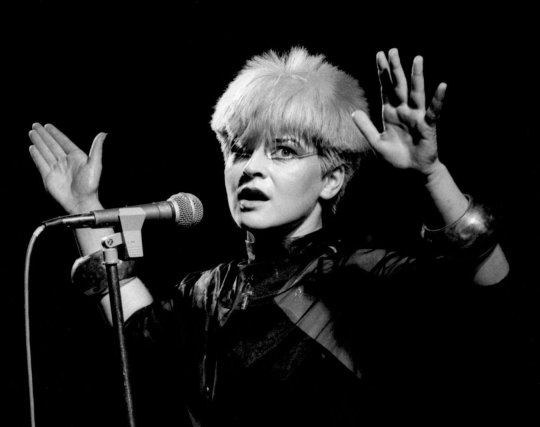
TOYAH: Whoo! (laughs) That is such a big question! I was filming with Katharine Hepburn in a film called "The Corn Is Green", which was directed by the legendary director George Cukor. I then went straight on to do "Quadrophenia", which is 40 years old this year
So we're doing a lot of celebratory filming this year of that. I was also touring my band endlessly and in 78',79' and 80'. You had the first Indie Chart, which was available in The New Musical Express, the biggest music paper at the time. I was number one in those charts every week for two years even though I didn't have national success - the success that was going to come in '81 … I was phenomenally successful on a kind of underground cult level. Filling venues, touring all the time, charting. I had an album out in 80' called "Blue Meaning", which went straight to number 2 in the album charts But back then you didn't get radio coverage if you were an album selling artist so I was enjoying wonderful success. It's probably one of the happiest times of my life because everything had a "Midas touch" to it – my acting and my music. I had no idea what was about to come in 1981. It was a lovely time of innocence and joy with everything doing really well ALEX: I have to rewind there, just a couple of things I want to pick up on. First of all - I would imagine Katherine Hepburn was a lovely lady. Did you sit down, get down time, get Hollywood stories from her? TOYAH: Yes, she was a very generous person. Not only did I get down time with her, my father turned up on the film set unannounced! He was hiding on the set to watch his film idol Katharine Hepburn and she found him! She said "who are you and what are you doing here?" and he said "I'm Toyah's father". She stopped filming and took him to lunch! She was just the most extraordinary woman. She would talk to me a lot about whoever I asked about. Her main influence and the big love of her life was Spencer Tracy. She wore his clothes every day and he had been long gone by 1979. But she would often just say "this is Spencer's jumper, this is Spencer's trousers" (laughs) and she was still very connected to him She was a very generous actress to work with. She allowed me close-ups, she would allow me to sit in her dressing room while her make-up was being done and we'd talk. I worked with John Mills, I worked with Laurence Olivier. Even Diana Dors and they were all true stars. Today, as stars tend to be very real or reality based, these were people who were built by the Hollywood system and they were phenomenal. They were very different and I'm so glad I met them ALEX: Well, I can't think many things cooler than hanging out with Katharine Hepburn being told one on one Spencer Tracy stories. And then Diana Dors! What did you work with her on?
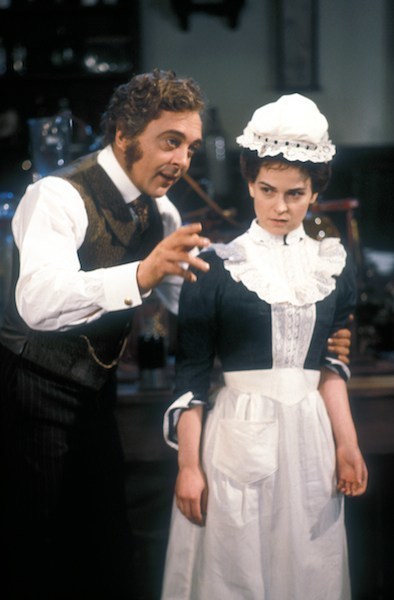
TOYAH: I really have to pull this out of my my memory banks ... I did a lot of historical dramas for the BBC during this time. I did "Jekyll & Hyde" with David Hemmings (above) and I did an another one - which I can't for the life of me remember the name of! Diana Dors was, I think, in "Jekyll & Hyde" with me. She was great! Those days you'd have three months rehearsal for one of these drama series. When she came into the room she owned the room. It was “Hello, darlings! How are you?” Everyone was included, the conversation was loud and brash and the stories were legendary - kind of 1960's London But of course she worked and had a fling with Elvis Presley so she branched right across to Hollywood and back. Her stories were rich in this vein of 1960's rock culture. She was electrifying ALEX: I could talk to you all day! Sunday, 26th of May, Theatre Royal Winchester, the 40th anniversary of the wonderful Toyah. You'll get just a great show with loads of costume changes and Toyah looking gorgeous and being fantastic! TOYAH: Can I tell you my Winchester story really quickly? ALEX: Yes! TOYAH: I did "Taming Of The Shrew" at Theatre Royal in August 1990. I was about to go on stage for the very last speech. It's a very big speech for "Kate" and the stage door, which is right at the back of the stage, opened and a fan grabbed me and pulled me onto the street for an autograph! (They both laugh) I was in shock! I didn't know what to do! Everyone was waiting on stage for me in the big banquet scene and I was going "oh gosh, help help!" ALEX: Oh, no! But did you make it just in the nick of time? TOYAH: Yes, I ran back on stage looking incredulous and everyone thought I was delivering the speech in a different way! They thought "oh, she's going at this differently tonight". The look on my face was I've almost been shut out of the theatre! ALEX: Toyah, thank you so much and have a great night at the Theatre Royal Winchester Sunday night! TOYAH: Thank you so much!
#toyah#toyah willcox#toyahwillcox#toyahinterview#toyah interview#the toyah willcox interview archive#thetoyahwillcoxinterviewarchive#toyah bbc toyahbbc#toyah 2019#toyah2019#toyah radio#toyahradio
1 note
·
View note
Text
PHIL MARRIOTT MEETS 3.4.2019

PHIL MARRIOTT: Toyah Willcox! Fantastic to see you! TOYAH: Hey! Good to see you too! PHIL: How are you? TOYAH: I'm really good, thank you PHIL: Now, we've got the album, which you've just put on the table. I have to say gorgeous because of the colours of this … TOYAH: It's very crimson. It's “In The Court Of The Crimson Queen”. We started writing it ten years ago and we slowly drip-fed it to the fas as we toured constantly. The only way I can explain this, because if people know nothing about me … I was 60 on May the 18th last year and the fans downloaded me to number one in the charts. It was really quite extraordinary because I'm an unsigned artist So this meant that people suddenly pricked up their ears and went oh! And we got offered a recording contract and we said we want to make this “In The Court Of The Crimson Queen” how we originally wanted it to be but with a bit of a budget So we added drums, we added bass, remixed and remastered and we added five new tracks. This album has already had an extraordinary life. It was only available to the fans but virtually every track on the album has been in the musical version of “Crime And Punishment” - PHIL: Yeah, I saw that - TOYAH: Did you? PHIL: It was great - TOYAH: Oh, thank you. At the Scoop Theatre, London four years ago. And some of the tracks have been in movies. We've now had the chance, thanks to a record deal, to group it together, repackage it, so I'd say to anyone out there, who knows nothing about me - this is actually a sparkly new album PHIL: Yeah, because you've got a lot of new tracks on there as well TOYAH: Five new tracks - PHIL: Yeah. What I love about it though, particularly, it seems really current still, even though it was recorded over ten years ago. There's some tracks which seem almost like a reaction to what's going on politically in the UK and the US. There's “Hyperventilate”, “Heal Ourselves”, “Bad Man” - TOYAH: Well, we sat down to relisten to the album about six months ago and we thought this is not a bad album. It still, like you said, feels very current. Simon Darlow, my co-writer - and by the way Simon plays everything on the album – we thought this deserves a worldwide commercial release. Let's go with it, let's add some fairy dust and the new tracks and just treat it as a new release So because of the history of time to write and complete it, it is commenting on things that have been going on for many years. When we started writing this there was plenty of unrest in the world, there's was plenty of things going on far away in other countries that none of us want to have happening “Heal Ourselves” was about community, sisterhood, brotherhood, sticking together, not allowing the media to make enemies of ourselves. Ironically “Bad Man” is about the fact we are so quick to label someone with the label of "bad man" rather than see why they behave in such a way or their circumstance or how they feel they have to act when they're in public. It actually says "I see though you, I see through you like glass. I see your heart"
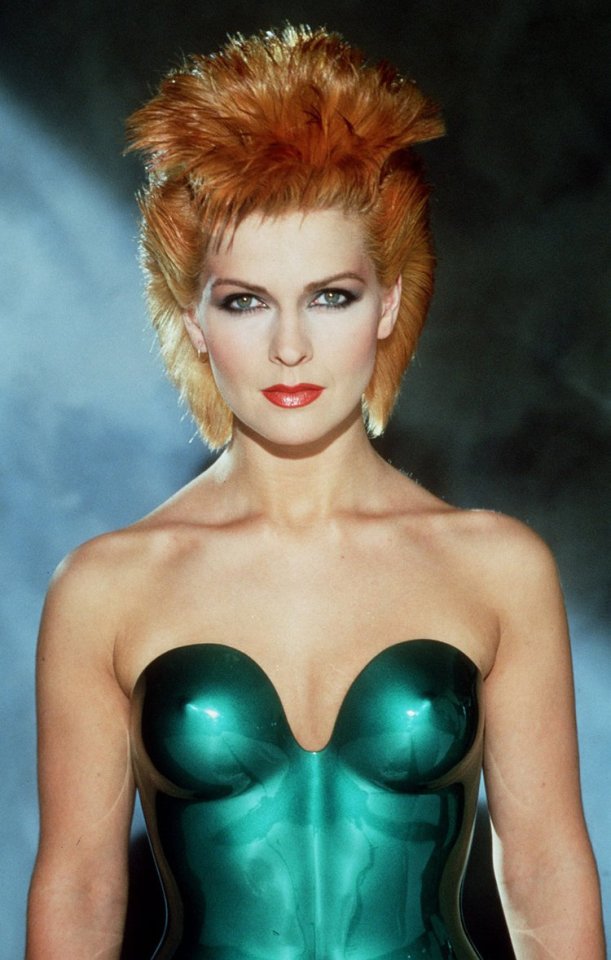
PHIL: You mentioned Simon Darlow, who your loyal fans will of course know from back in the 80s. You worked together with him on “Love Is The Law” 1983 and then again on "Minx" in '85
TOYAH: He said to me the other day – and I have no memory of this – I was the first person to sing “Slave To The Rhythm”. I was with him when he wrote it -
PHIL: Oh yes, because he co-wrote it -
TOYAH: Yeah, for Grace Jones. I have no memory of that at all that I was actually the singer he tested it out on
PHIL: Amazing! Do you find that a lot of your career in the 80s is a blur?
TOYAH: Everything's a blur now!
PHIL: It's kind of whizzed on so quickly -
TOYAH: The thing is I try to make today relevant. I think it's really important to be present and accept who and what you are in the present. So I think the reason the past is a blur is I'm always focusing on what I do today and seizing opportunities to do with the future so the past doesn't really get a look in that much
PHIL: You're not one to look back. You just want to concentrate on what's coming up?
TOYAH: Yeah, even when I do the big 80s festivals I try to give that in the moment. So if I'm doing “I Want To Be Free”, “Thunder In The Mountains”, “It's A Mystery”, “Good Morning Universe”, all those hits – I try to give them in a relevant way today
PHIL: Because we know you've touched on the anniversaries of your previous albums like “The Changeling”. You've got the 35th anniversary of "Minx" coming up -
TOYAH: Oh, really? Thank you
PHIL: In two years. It was '85 -
TOYAH: We're asking the record company to give that back to me at the moment. A lot record companies own stuff that they're not active with and we believe as artists it's our human right to ask for it back -
PHIL: Yeah - its your work, isn't it?
TOYAH: It's my work, it's my identity. So we are actually focusing on "Minx" and trying to get it back, which means I could do an awful lot with it
PHIL: Oh my God, yeah. Because you've had a lot of problems with Safari Records. That was the label you were signed to right back in the 70s -
TOYAH: When you say problems, I think basically at the moment I'm being ghosted by them because I won't go away. It's just one of those things. It's a phenomenally successful back catalogue so I want to nurture it and mother it
PHIL: It's really your roots, isn't it?
TOYAH: It's my roots. I think “Sheep Farming In Barnet” is such an important album. “Blue Meaning” is a really important album. They're so original, they're so quirky and they still sound fresh. They really deserve their place with the younger generations
The beauty of YouTube and performing to such young people – to me anyone under 30 is really young – is that they're yet to discover this music and I think they're really going to like it. So I'm very active with all of that

PHIL: And a lot of those songs are quite dark as well. I think a lot of young people would resonate with those songs -
TOYAH: They're wonderfully dark -
PHIL: How does it feel when you perform those old songs?
TOYAH: I love it!
PHIL: Do you get taken back when you were singing them the first time around?
TOYAH: Some of them are prophetic. When I'm singing “Neon Womb” my mother was still alive but when I wrote it I was aware of the future so there's little things like that. The same with “Race Through Space”
They're all about the grief before the grief actually was there in the world and it's a common theme in “In The Court Of The Crimson Queen”. It's how grief makes us better people. It makes us stronger, it makes our love stronger, makes our hearts stronger because you have to reach out further to find those you love. So for me that's a very powerful message
PHIL: And proving again that you always want to look forward as well. Seeing the future with your songs, with your songwriting -
TOYAH: I find that quite a romantic thing to do. For me the future is a bed of roses
PHIL: Because you've always written songs in the past maybe inspired your dreams. Is that still the case now or do you get your songs inspired by what's going on in the real life?
TOYAH: Yeah, sometimes I have really amazing dreams that are so tangible that I think that was not a dream, that was something else. That was a lesson. So I always take those particularly seriously
At the moment I'm dreaming a lot about tidal waves and they're in the most bizarre places. I live on the river Avon and I keep dreaming about tidal waves coming down the river Avon -
PHIL: Terrifying … TOYAH: Well, my husband says that it's actually being wrapped up in a spiritual experience. Water is our connected spirituality as mankind and I think that's a nice way to look at it. We do flood a lot there and when we flood it's very cold water so I'm kind of keeping the positive and the negative on equal balance. But to answer your question – I take dreams quite seriously because I've learned that sometimes they're telling you something that you need to be aware of PHIL: Dreams are a link to reality. It's bouncing back off reality … TOYAH: In some cultures dreams are believed to be the real work we do. I often wonder why on earth do we sleep so much of our lives … Well, go and ask some native Aboriginal in Australia. They'll tell you that's when you do your real work PHIL: I love sleep. I could go to sleep right now
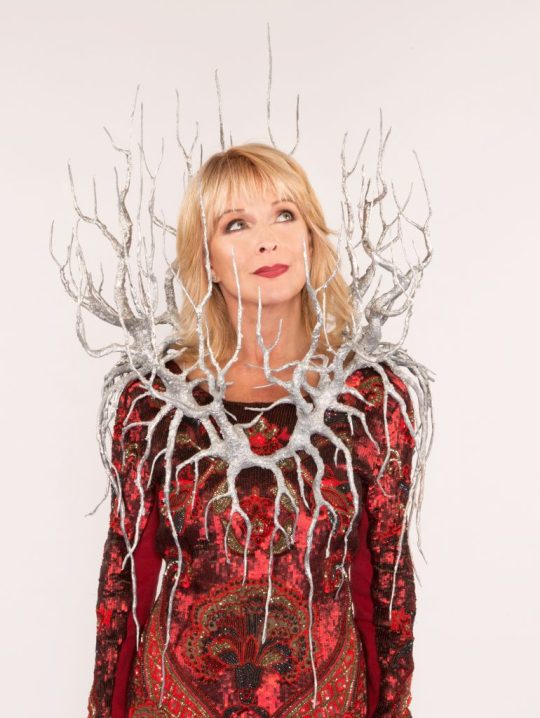
TOYAH: I hate sleep! I would do anything to pop a pill and never sleep again
PHIL: Do you still suffer from insomnia -
TOYAH: It's terrible! People get so annoyed with me because I'm pinging out emails all hours of the night. I only achieve deep sleep between seven and ten in the morning
PHIL: Is it the creative brain because you just want to keep producing?
TOYAH: I think those people that can use it creatively are very very lucky. Kate Bush, I think, does most of her creative writing through the night. I can't be that creative, I can be very functional. I can do all the mundane in the office but to sit down and write a song at 2 in the morning - that's not going to happen with me
PHIL: It's a very small world, Toyah, because the video for “Sensational”, one of the tracks on the album, is directed by Dean Stocking, who is
your photographer as well. He also works with Boy George and I seem to remember he was in your documentary -
TOYAH: Yes, at "Mayhem" (Toyah's warehouse/home in Battersea) Boy George very kindly tweeted the link to the video so he's been very supportive
PHIL: Do you see him much now?
TOYAH: We talk more than we see each other because Dean now works for Boy George full time. I get to hear a lot about what both of them are up to. I know Boy George wants to do an album with me – I'm not sure when we can fit it in.
He wants to write and produce it, which would be interesting from my point of view as a writer but I never say never and I think let's see what happens
PHIL: The reason I asked you that question was because I was at Battersea Dog's Home just the other day and that is very close to where you used to live -
TOYAH: I was across the road. They've knocked it down now -
PHIL: Oh, have they?
TOYAH: Yeah, "Mayhem's" gone -
PHIL: What a shame!
TOYAH: There was a petition to save it and give it a heritage plaque. But no, it's gone. I think it's flats now
PHIL: Because that features in the documentary. Is that something you've seen recently?
TOYAH: I love that documentary. I'd love to own it, I could do a lot with that. It was shot and directed by Graham Moore. I am so grateful because that turned everything around for me. To have an hour long documentary on ITV on a Thursday night, 9 o'clock, prime time. It was phenomenal! Really all the angels were looking after me that day because it was all the music – and this was before “It's A Mystery” -
PHIL: I was going to say this was before you really became successful. You were successful then because you had a loyal fan base -
TOYAH: I was very cult. I was hugely successful as an actress and as a touring artist but I hadn't had nationwide hits. So that documentary – wow! Mind-blowing. You ask if I like it? I love it! (Phil laughs)
PHIL: It was fascinating to watch. I presume that new fans of yours that didn't know you back then or didn't have an insight as to how you started -
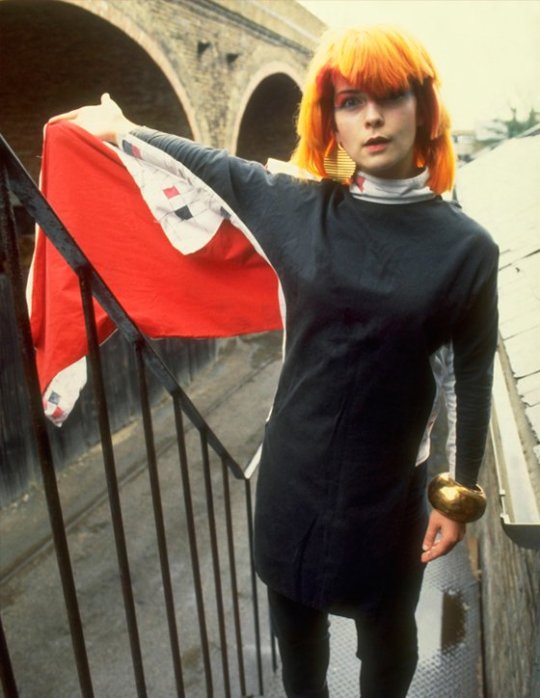
TOYAH: They should watch it PHIL: Yeah! TOYAH: "Toyah! Toyah! Toyah!" (Watch the documentary (1980) HERE) PHIL: Have their minds blown how different in some ways but not in others. Still the same artist - TOYAH: It was a really good time. That was a good time for everyone. Everything was possible. I think life was easier for us young 'uns back then and I think that documentary just caught me brilliantly PHIL: You are, what I think is safe to call, a juggernaut in so many ways. I've always thought from the late 70s to now you have this endless energy, a kind of effervescence that you can't control it - TOYAH: I can't control it - PHIL: You're bouncing all the over the place. How do you do it? TOYAH: I'd like to control it. I often think if I could just stand still on stage I might be a better artist. I just don't know where it comes from PHIL: You're doing over 30 shows this year - TOYAH: No, I think it's about 58 and it's going up and up and up because we've been doing lots of radio. Even last week a promoter contacted me during a live radio show and offered me a festival. The numbers – it's just tick, tick, tick, tick – going up. The energy – when I'm on stage I don't know where it comes from. I don't think I've ever gone on stage without that surge of something coming into me that I can't hold back PHIL: Do you know what it is? Can you identify what that surge is? TOYAH: I like to think it's something outside of me rather than a brain condition (laughs) PHIL: An other-worldly force - TOYAH: Yeah! I don't know whether it's my pituitary glands or what. I like to think it's an other-worldly force PHIL: I wanted to ask about identity because when you were young you resented femininity - TOYAH: I still do - PHIL: Being put in a box? TOYAH: I'm really uncomfortable with being identified as feminine. I always have been. I'm very tomboy, I definitely have a masculine soul. I believe in reincarnation and I'm absolutely certain that I was Attila The Hun or something like that in a past life. I'm so masculine and it's nothing to do with sexuality. It's just to do with attitude. I think all of us have the right to be our individual selves I was very aware from a very young age that I was being made to identify as something for the convenience of others. It's all to do with ticking boxes and filling forms and listing in bureaucracy. On your passport, male or female. I think we're all individuals We have a right to clarify what we need to excel and be our best. I personally believe that we are all here with nothing but potential in our bodies. Part of that potential is identifying, honing down, clarifying who and what you are. I'm so profoundly uncomfortable having to be feminine that it effects me - PHIL: I know that you worked with some amazing people in “Jubilee”, the theatre show (below) - obviously based on the movie that you were in TOYAH: Oh, my God - I loved it!
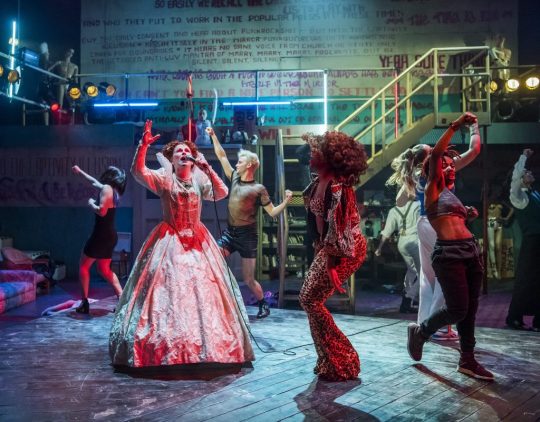
PHIL: This is the really exciting thing – the fact that you were playing Queen Elizabeth. You obviously didn't play that role the first time round, you played "Mad" in the movie. I found that a really good connection because it really freshened things up. It made the production really exiting TOYAH: It was very clever. Chris Goode was asked by the Manchester Royal Exchange "what would you like to do as a writer/director?" and he said "I want to bring the film “Jubilee” to the stage." The first script I read - and I don't think we veered far away from what I read first - was one of the most outrageous, funniest things I have ever had in my hand. It was just so gloriously naughty Chris came to see me to ask me to give advice to the cast. Gender fluid, some were gender neutral, some were transitioning. He said could I give them advice about what it was like to be a punk rocker back then, which was very much gender orientated. I said yeah, I'd happily do it and I said "can I be in it?" And he said "I wanted you to ask that!" (Phil laughs) So I just jumped on that. And what a glorious cast! PHIL: These are people that have such rich life experience. It was perfect for the role, wasn't it? TOYAH: It was brilliantly cast. Every single person in that play have a message. They're all activists, they're all sexual politics activists, they're all gender activists, they're political activists. Me being good 40 years older than most of them … I had to learn a new language I had to stop saying "c'mon guys, let's go for lunch." They were they, them, us, it. Words that I would've considered rude 40 years ago to address someone by. So I was continually having to learn to respect what they wanted. I was very happy to do that and at the same time I was going against 60 years of programming PHIL: So that was a challenge for you as well - TOYAH: Huge challenge! But one that I loved. I'm very grateful to have met these wonderful people who work very hard. They earn a lot less than I used to earn when I was their age. I really appreciated how they struggled and still had huge hearts and huge ambitions. I feel very passionately for them and their talent and that they get what they deserve in life and they deserve everything PHIL: And they've got Derek Jarman's outlook as well TOYAH: Yeah. That was very important because Derek - like most men of his persuasion back then ... he suffered a lot. He suffered a lot of physical violence and verbal violence and he had a really horrible death. Luckily people aren't dying quite like that from the AIDS virus now But for Derek it was so frightening. When he had HIV and then it developed into AIDS … He was getting death threats, he was getting people wanting to violently take his life as if AIDS wasn't violent enough. So it was a remarkable experience to be with these young people and to be able to share my story with them and them being able to share their present day story with me PHIL: You mentioned Kate Bush. You've always been a fan as have I. You were the first artist I ever saw live in 1982 - TOYAH: Wow!
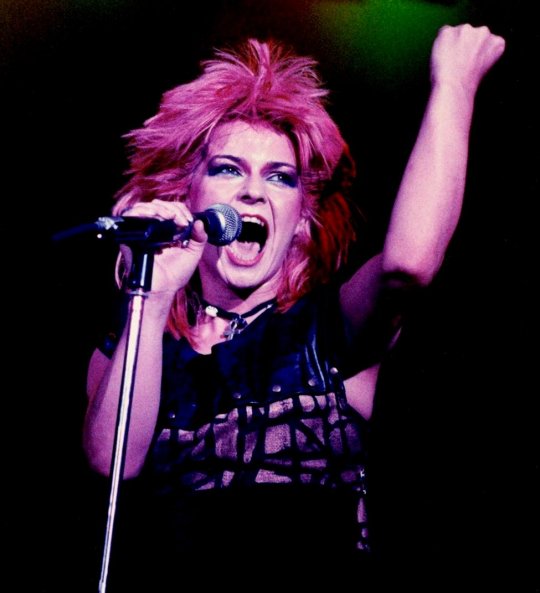
PHIL: It was the “Warrior Rock” show (above) at the Hammersmith – as it was then – The Odeon. Now The Apollo. Kate Bush played there a few years ago - TOYAH: How long ago was it? PHIL: I think it was 2014 - TOYAH: I know I went on the 11th of September. She invited me to come and see it PHIL: What an incredible show TOYAH: Yeah. One of the best things I've ever seen. What I loved about it was you really felt nothing but love in the room. That was extraordinary. When she walked on in that almost sardonic pace she was just so relaxed! I mean I would run on! But she had everyone follow behind her. It was beautiful, the sound was incredible PHIL: I've got the hairs on the back of my neck up just remembering it. I was lucky enough to see it twice – TOYAH: Yeah, her voice was incredible PHIL: The first time I was right by the stage and I couldn't walk afterwards. It was a really bizarre thing - TOYAH: Oh, wow! PHIL: I couldn't speak, I couldn't walk. I was just dumbfounded TOYAH: I was just very happy for her. I went backstage after to speak to her and to be with her for a bit. It's funny … the success of it didn't seemed to have touched her. She was just Kate and incredibly humble. I don't know if you know she used to bring Bertie (Kate's son) to my house before anyone knew Bertie existed. My father used to take them both out on his boat on the river Avon PHIL: Oh, wow … I loved him in the show as well TOYAH: He was great. He's a remarkable man - very intelligent, as you'd expect. I'm always blown away about how humble Kate is because she's a goddess! PHIL: That's what makes her more appealing as an artist, I think. There's no ego. Or I suppose you've got to have a certain amount of ego to - TOYAH: I don't think there is ego. I think she's incredibly clever like that. There's incredible knowledge, very hard work, but I don't think there's ego. But she is very protective of her work PHIL: Yeah. I know you're a big horror fan as well - TOYAH: Oh, huge horror fan! PHIL: I've just seen “Us” - which was quite disturbing TOYAH: I haven't seen that yet PHIL: Because a lot of modern films aren't as disturbing as they used to be TOYAH: You must see “The House That Jack Built”, directed by Lars Von Trier. It is genuinely shocking. Matt Dillon is mind-blowing, everyone is mind-blowing in it. What I love about it it's one of the first films I've seen other than “It” - which was enjoyably shocking – this, “The House That Jack Built” is breathtakingly disturbing PHIL: More psychological - TOYAH: It's very real PHIL: I seem to remember you came on (stage) as part of your tour to the music of "Suspiria"? TOYAH: Oh yeah, the goblins PHIL: That got remade recently too. Did you see the remake? TOYAH: It's a parody? PHIL: It's quite different, it's a lot longer
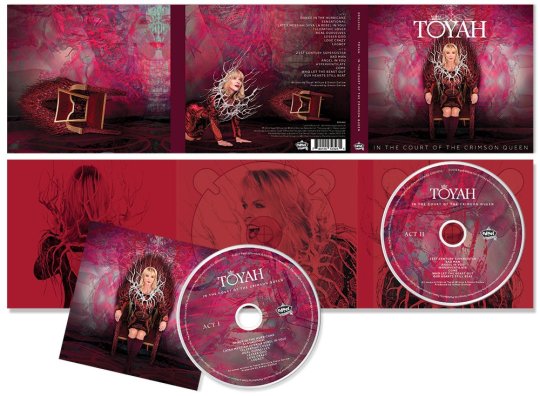
TOYAH: I think "Suspiria" is a classic. It works, it wasn't broken, don't mend it PHIL: So what was the last horror you saw? Was it “It” or “The House That Jack Built”? TOYAH: Oh no, I watch horror all the time. I think the remake “Halloween” was the last one - PHIL: Oh yeah, that was great. I was so buzzing about that because it's my favourite all time film - TOYAH: But again it didn't want to offend - PHIL: I think it was quite sanitized - TOYAH: The remake was very sanitized PHIL: Yeah. Are you still scared by stuff now when you watch - TOYAH: Yes. Anything to do with demonic possession I can't really watch. It's too suggestive for me PHIL: Yeah. I taps in, doesn't it? TOYAH: It taps in - PHIL: The psyche. Listen Toyah, it's been fantastic to see you. I wish you all the best with the album “In The Court Of The Crimson Queen” - TOYAH: Thank you PHIL: Gorgeous packaging. Gatefold 2 CD (above). Something for the fans TOYAH: And the vinyl is bright cerise pink PHIL: For Record Store Day. I think it brings back the excitement of buying music, doesn't it? TOYAH: Vinyl is saving the music business at the moment. It's the biggest seller. When we announced the vinyl I went straight to number one in the pre-order charts across the board so it just shows how popular vinyl is PHIL: There is air punching going on there ... TOYAH: Yeah PHIL: Good to see you Toyah, all the best TOYAH: Thank you so much PHIL: See you soon
You can watch the interview on Youtube HERE
#toyah#toyah willcox#toyahwillcox#toyah interview#toyahinterview#the toyah willcox interview archive#thetoyahwillcoxinterviewarchive#toyah2019#toyah 2019#toyah youtube interview#toyahyoutubeinterview
1 note
·
View note
Text
THE LATE EDITION, E4 WITH MARCUS BRIGSTOCKE 24.3.2005

MARCUS: The fabulously taut Toyah Willcox! TOYAH: Fabulously taut, eh? MARCUS: The fabulousty taut Toyah Willcox and I don't mean your education (Toyah laughs) You look fantastic! TOYAH: Thank you very much. I should hope after that amount of money MARCUS: How much did it cost? TOYAH: 11,000 Euros. So at the point of exchange, it was about £7500 MARCUS: Money well spent! TOYAH: I think so MARCUS: Yeah. And you've written a book which is moving and scary and at points a sickening account. It's very graphic about exactly what you went through
TOYAH: I hope to put people off as much as tell people what goes on. There's some women you will never stop having it done like me, but I hope that the book actually puts the weaklings off. It takes a bit of kind of mettle to go through with it MARCUS: There are some who would say it takes more mettle not to change how you look TOYAH: Bollocks! (the audience laughs) MARCUS: Fair enough. Why bollocks? TOYAH: Because I think sometimes women – and I’m talking from a woman's point of view - and I know men to this ... look at Dale Winton, obviously MARCUS: Not for too long (the audience laughs) Those lights bouncing off that brighter colour, you can actually damage the retina
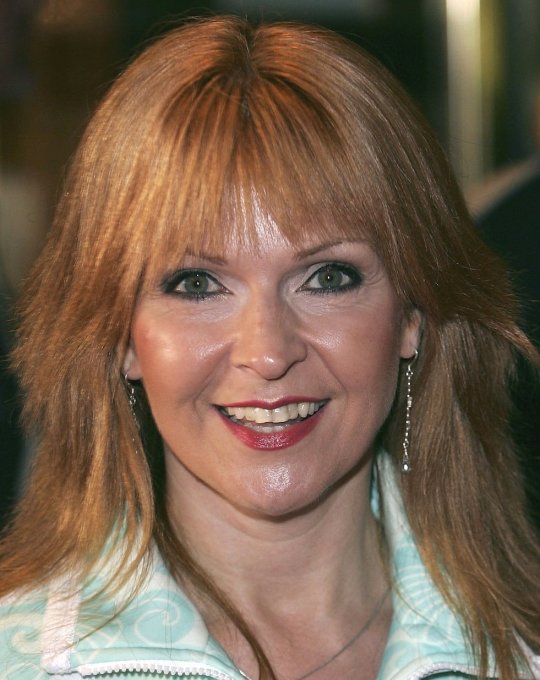
TOYAH: Sometimes you do it for yourself. It is a selfish act sometimes and I did it because I wanted to do something. Having a facelift doesn't stop you ageing, you're going to carry on ageing. Nothing will stop that but hopefully I will do it a little more attractively MARCUS: Right TOYAH: Am I boring you shitless? (Toyah and the audience laugh) MARCUS: No, not at all! In all honesty I'm trying to be delicate or I had intended to be delicate but you're talking in a far more - TOYAH: Don’t be delicate because you're a sweetheart! MARCUS: OK, can I feel behind your ear? TOYAH: (moves towards Marcus) If I can sit on your knee MARCUS: Oh my good God! (feels behind Toyah’s ear) There’s almost nothing there! TOYAH: See! It’s good work! MARCUS: I'm not going to grab it and pull TOYAH: Oh, by the way, I've had my arse done. Could you feel that? MARCUS: Yes, I could (the audience laughs) And I want to say for the record, I'm not bored now! (Toyah and the audience laugh) And if Thatcher was here he (sic) could measure things. There have been some real horror pictures, haven't there? Let's have a look at that (a photo of Jocelyn Wildenstein) TOYAH: I have to tell you about Jocelyn Wildenstein. She's one of the richest women in America and this is body dysmorphic disorder. This is when you don't see the truth of who are MARCUS: Yeah, you see, that's the thing. I think if you look at lots of the elements of her mashed face, they look OK individually. It's just when you put it all together you just think oh, my God! TOYAH: It's like Burt Reynolds and Julian Clary married together. I mean, it really is quite bizarre! MARCUS: It is a hideous mess. Let’s have a look at the next one. Joan Rivers TOYAH: Sorry, when I'm 73 I want to look like that woman

MARCUS: Yeah, that's taken a lot of surgery, hasn't it? TOYAH: Yeah, there's about three facelifts there. That's my guess MARCUS: Looks like she's got a beard coming up eventually (the audience laughs) It’s an oldie but a goodie. There are women, I think, who were very critical. I mean, Melanie Phillips who writes in The Daily Mail absolutely tore a strip off Anne Robinson when she had her face done TOYAH: And do you think Anne cares? MARCUS: I know that she does. It didn't hurt her but she was angry and she wanted to get back at Melanie TOYAH: I think if anyone gets back at anyone it’s going to be Anne because she's rich and she's powerful. But I do think a time comes when you do stand up and go "see, Melanie's kind of had a go at me, that's fantastic! I’ve arrived!" MARCUS: Has Melanie Phillips got a point at some level that unless women are allowed to grow old on screen - because you're someone who's who's very much in the public eye ... If women aren't seen to be growing older it will be impossible for them ever to grow older TOYAH: OK, I totally agree women must be allowed to grow old on screen and it's been an actress's dilemma for since the TV's been going but from the age of 35 to about 50 women weren't finding jobs. Caroline Quentin has broken that mould and parts are being written for her But the biggest problem that I predict is that it's going to become about those who have the money to have the really good work and those who don't have the money to have any work at all. And it's going to be like them and and us so a huge social divide MARCUS: I think it is enormously difficult to have a career particularly in presenting if you're a woman of advancing years. I make absolutely no judgement. I've thought about surgery myself. I've got quite a long, narrow face, and I'd quite like it shortened and made more round (Toyah laughs) Whether I shall ever actually have that done I don't know. It would mean removing bone from here to here. Quite dramatic! But nonetheless, I think your surgery has made you look sensational. And I'd like to thank you very much indeed for joining me this evening. Toyah Willcox! TOYAH: Thank you! You can listen to the interview HERE
#toyah#toyah willcox#toyahwillcox#toyah 2005#toyah2005#toyah tv#toyahtv#toyah interview#toyahinterview#thetoyahwillcoxinterviewarchive#the toyah willcox interview archive
0 notes
Text
THE DYSPRAXIC HELP 4U PODCAST WITH BILLY STANLEY 10.10.2021

BILL: Welcome to the podcast, Toyah. How are you? TOYAH: I'm really good. Thank you very much. It's nice to have some normality back in life BILL: I must start by asking when did you learn that you were dyspraxic? TOYAH: Very early. I had a very remarkable teacher when I was in infant school and it was about my second year and she realised I was very, very bright and very creative. My very first year at school when I was four and a half, we were allowed to work with colour and crayons. So when we were taught mathematics, we had different coloured bricks, which represented numbers I (was) top of the class at that. Then with using crayons - top of the class with that. And then when we moved to the following year when I was five people very quickly realised I could not pick up the normal standard training reading and the normal standard training of numbers. They were just gobbledygook to me
So I was put on phonetic writing - the “Janet and John” books I was given in phonetics and then I could immediately read. But once I was six, none of that was available to me. It was completely taken away and treated as if I was lazy, treated as if I wasn't making an effort. I think part of the problem was is the school didn't like me having special treatment. They didn't want me being singled out to be someone special. I went from being top of the class to the next 10 years being bottom of the class until I left BILLY: Did you have the support of your immediate family and friends? TOYAH: They didn't even support me when I was an international megastar! BILLY: Did you struggle to conform to social norms and the trials and tribulations of being neurodivergent and did having a personality suppressed throughout your mainstream education somehow mould you into the person you are today?
TOYAH: I think I felt very alone. But teenagers generally feel alone. School for me was tedious and it was boring. I should have been at a drama school where I would have excelled or a music school where I would have excelled. I just did not fit into the conservatism of my education. So I would say in answer to your question that I became quite insular and incredibly independent because of it because there was no one I could rely on There was no one I could go to and say, “why can't I do this? Why don't people listen? Why don't people see me as me?” So everything I did I was told I was wrong and I was told I was being the wrong person. So no one saw me in my true natural state and my true nature. So I think it actually made me who and what I became as a star BILLY: Dyspraxics often say that they play the fool as a means of masking our differences. Do you consider yourself to have been always the master your true persona?
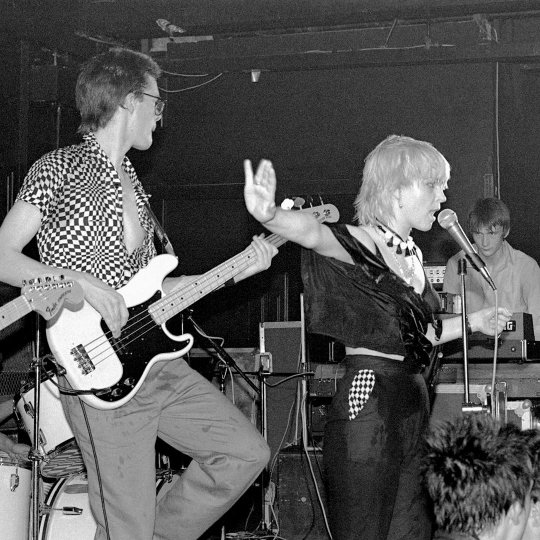
TOYAH: I tell you one thing that I did do was I covered up brilliantly in social situations, where I knew what was coming because of culturally where I came from. I had a bad speech impediment and at that time I had a limp because I was born with a twisted spine and pelvic dysplasia, which is all been corrected. I knew that people were going to make a joke out of me. So I knew how to cover this up. I knew how to bluff my way. When I went to my first job interview, I just lied and I'm a great actress. So I just lied and I got the job Interestingly, the director Derek Jarman, who I did two movies with, who used to come and see me sing - he said to me “Toyah, you’re still acting”, and he understood that I had to create these layers. I think the most frustrating thing that I found - it wasn't really until I met my husband at the age of 25-26 where he was so crystal clear about my cognitive issues. Up until that point, I just went with being highly individualistic and deliberately not fitting in. But I thought that was part of my personality rather than my inner internal neural pathway wiring BILLY: Given that dyspraxia is a lifelong disability, has it impacted you more throughout adulthood?
TOYAH: My my dyspraxia has got worse as I've got older. When I was younger, say from when I was born until I was about nine I had no idea I had disability. No idea. I led a perfectly normal life. I was being trained to be a junior ice skater alongside John Curry, the Olympian. I had a very normal life and then once my corrective surgeries started, I realised that this was a disability that was going to be with me on a certain level all of my life People made me aware of the limp, which I was never aware of and people made me aware of my speech impediment, which I was never aware of. I just thought I was being treated like the village idiot all the time, which is what culturally happened 55 years ago. So my dyspraxia has definitely got worse as I've got older but in lockdown I found the most incredible teacher who has a military background and he studied my movement. And by studying my movement, he was able to reverse my dyspraxia so I can now play keyboards and I can now play guitar. I've written 30 odd albums and I've never been able to play one instrument There are ways of connecting those neural pathways and he did it through physical exercise. In 2000 I did the “Dore Programme” which is highly controversial. The government have tried to sweep it under the carpet. I did this for three months and went away and wrote two books. That's all about connecting and firing the neural pathways in the front cerebellum through movement. Through spinning, through disorientation and balance
BILLY: Without the intervention of a family friend do you believe you would have gone on to achieve the career you've had? And as such did the lack of awareness and support for your respective disabilities in adolescence hold you back in some regards later in life?
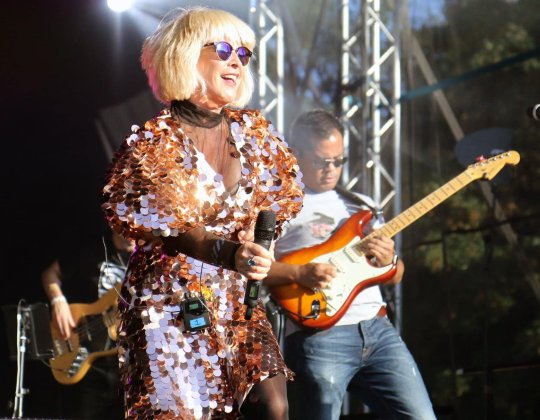
TOYAH: It's a very good question. I think if people saw and accepted and realised what was going on with the relationship between my brain development and my body growing rather than giving up on me I would have had a far more advanced artistic career. No doubt about it. But I was written off very early as purely baby making material. I never had children and I think instinctively I knew I was carrying a gene that had this disability So it's such a good question, because when I was about 14, and this is just a story of complete luck, a man that ran BBC Pebble Mill had a boat next to my parent's boat down on the River Avon. He said to my parents "you know your daughter is incredibly talented. You've got to get her out of the school system and put her in drama school" and he nominated me into the Birmingham Old Rep Theatre School. I never looked back. I just excelled! I was put in the right environment. So up until the age of 14 I was never in the right environment BILLY: You had an early interest in dancing. Did you encounter any difficulties such as a lack of spacial awareness?
TOYAH: I took up dance when probably about 14. I earned my own money, I paid for my own dance classes. And again, anything to do with movement will trigger the neurons. What I didn't know back then was dehydration and the neurons not quite firing goes hand in hand. I was never given water at school. I drank one glass of water a day. Now I drink five litres of water a day. The brain cannot function in a state of dehydration, neither can your heart So I never knew this at school. We never had water in the classroom. We never had water available to us until lunchtime, and then again when we got home. So all of that is a perfect storm. When I was dancing and even still today, I think it's why I'm never still when I move my neurons - I can feel the fireing. I can feel my brain activate. You want to feel good, just move. We’re water, fat and electricity. So connect with all of that BILLY: Dyspraxics often struggle to learn new information at a rapid pace and have weak short term memory. We do however seem to have fantastic long term memories. Has this been the case for you?
TOYAH: It's a great question because I can give you two examples. I did a play in London called “Trafford Tanzi” about a female wrestler. I‘d pick the fight sequences up on first show. The fighting instructor, a judo Olympian showed me the fight sequences for this two and a half hour play. He never had to show me them again. They were there. When you give me a script, and I have a reading technique where I'm very, very slow but it’s there But give me a dance routine in a West End musical (Toyah in "Cabaret" in 1987, below) it takes me months because I need to connect the counting to the music score and I feel music as as a kind of heartbeat. Musicians feel music has 1234 1234. I don't feel music that way. And dancer’s choreography - they build dances through counting. It's hopeless for me. Hopeless. So I excel at some things and other things I have to find my own way in and that can take time
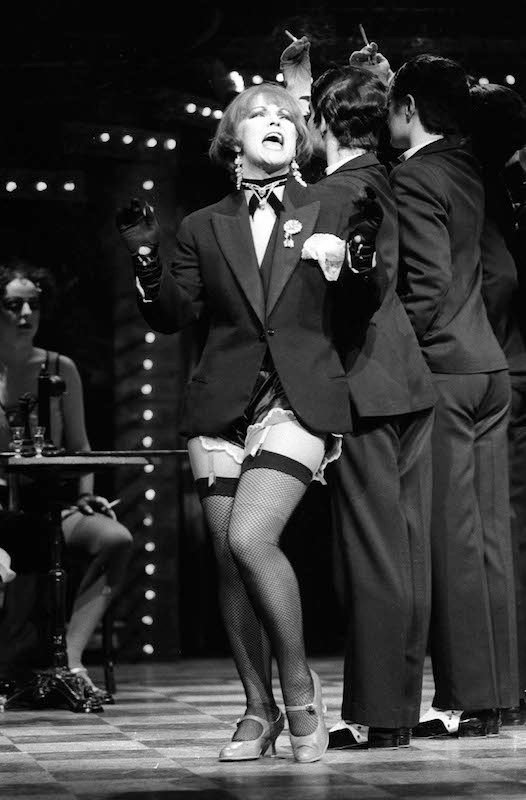
BILLY: Did you encounter any difficulties such as the lack of spacial awareness, poor balance and where you're also impeded by needing to wear a raised shoe? TOYAH: The thing is most of the time I wore a raised shoe on my right leg. My right leg has now been made the same length. 10 years ago I had surgery to make my right leg the same length. So when I wasn't wearing the raised shoe, my balance was affected and also my gait. Limp is called a gait and I had an emphasised gait. But again, I'm incredibly muscular so I can cover these things up But I think my movement is very individualistic. And it's not what I'd call feminine movement. It's strong movement. I move like a gymnast. I'm very, very strong and very supple, and that’s partly because my tendons are just too long for my joints. So I overextend but my movement is quite unique BILLY: You've had numerous operations in the past to help with your physical disabilities, unbeknownst to your fans and peers. Would you say it was a conscious decision and what impact does all this have on your dyspraxia?
TOYAH: No, I wouldn't because I managed to disguise it. So up until about the age of 30 my life was pretty normal. I'd had joints removed in my toes to stop them growing and I'd had corrective surgery on my right foot when I was 11. But after that I had a relatively normal life other than I could never wear lovely shoes and still can't because I have a club foot. When I was 30 my right hip socket wasn't formed. It was a shallow socket and it developed a very bad abscess when I was 40 that hollowed out the thigh. There was a huge hole there For 21 years I had to live with that and that was done through pain control. So when I say pain control, that's physiotherapy, it's not drugs. I was allowed to carry Co-Codamol (painkiller) if I needed it, but I managed not to use it. They didn't want to do the surgery on me until the prosthetics were fully developed So when I was 51, a very wonderful incredible surgeon called Richard Villar designed a prosthetic for me. It's very, very tiny. He took the hip joint out and put in the metal plate into my hip, pelvis, and then this tiny prosthetic goes in to the hole that the cysts formed. I couldn't walk for three months. I was off my my legs for three months while bone grew around that. And I've had a normal life since
So from the age of 30 until I was 50 I was under pain control management. That was all done through extreme muscle. I tell everyone this, if you've got joint problem problems you've got to be built like Arnold Schwarzenegger, because this muscle helps that tendon function through a dysfunctional joint. Then you can support that joint and you could probably live with it for your whole lifetime. By the time Richard Villar did my right hip he said the whole area had completely disintegrated. He had no idea how I coped and I said “I've just had to do this all my life. I know how to mask” So I found - once I had my hip replacement at 51, I'm now 63 - my dyspraxia became worse because my brain had to adjust to a different leg length so I became clumsier. And I'm now dealing with that. It has actually taken about eight years to deal with it BILLY: Is there anything in particular that you've struggled with when it comes to masking?
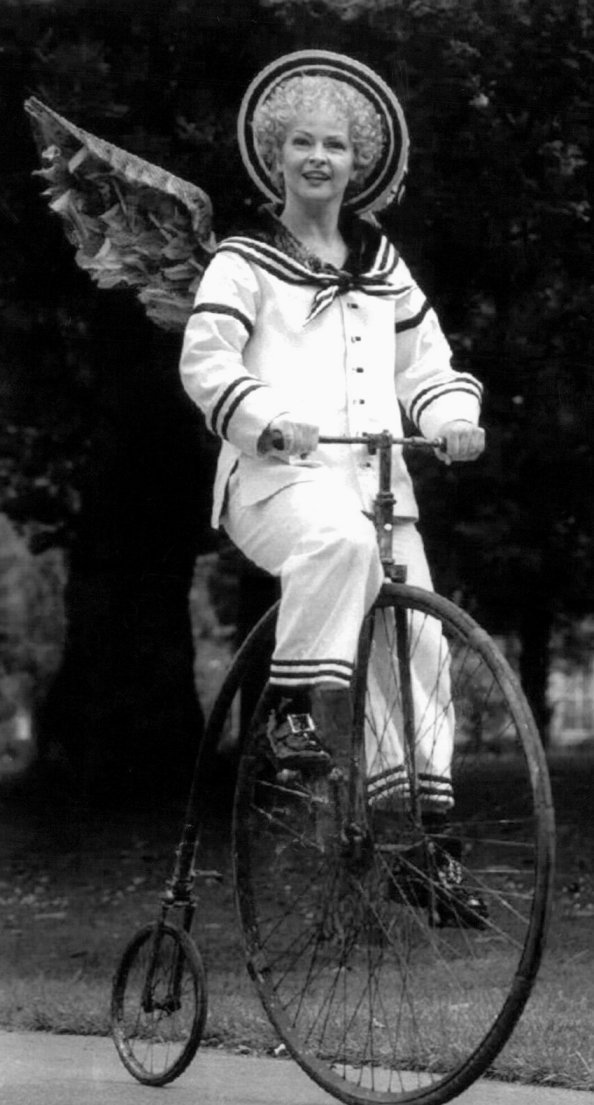
TOYAH: You see it in the hands. It's a classic sign that when I'm acting and when I'm expressing my hands kind of freeze. So now I've trained my hands so you will often see me - I will not spread my fingers. I've taught myself not to do that. So my hands are always closed fingers now BILLY: I strongly believe that through dedication and perseverance one can overcome adversity to achieve success. Was there ever a time when you felt like giving up? TOYAH: I'm not someone who gives up because in my upbringing, even though my family felt they loved me, it was so unnutritious on my soul, my body and my heart. I was brought up to be a failure, everyone reflected back at me failure. So because of that I'm the toughest fighter you will ever meet. I just don't give up, I will fight to the death whatever the subject matter is. And that's partly my upbringing, because I was always told I was going to fail So when I reached 30, I had to disguise the pain. That was the biggest thing, disguising the pain, so no one knew and I think there must have been times when people wondered why I was tense rather than relaxed. It's as simple as that. I was always masking pain. There are certain things and I can only explain this through a performance. I was playing “Puck” in “Midsummer Night's Dream” about 1994 (above). So I would have been about 36 and I masked the pain by working on skateboards, roller skates and a penny-farthing so I didn't have to run
So I could get my sweeping movements on stage by using the skateboard as a body board. So I would run in the wings, jump onto the skateboard onto my body and curve around on the stage and then stand and deliver my lines. That was a way of masking pain because I knew the pain built I could do shows but by the end of the show the pain would be building to intolerable. When I did “Calamity Jane” in the West End, which was incredibly physical - the irony of that was because it was so physical I didn't experience any pain in the whole year because I was so physically tuned up and that helped. Except on one night and an actor dropped me and it did my back in. But that’s the only time I've ever had an injury So it's been a very interesting journey and I would say to people you just don't give up. You just have to keep learning any kind of mild physical disability, which is how I say I am. Just keep working with it. You don't give up because everyone around you is is telling you to give up. You just don't BILLY: There is a common misconception in society that dyspraxia affects intellectual ability. We generally struggle to absorb information that has no bearing on our intelligence overall
TOYAH: I'm a complete sponge. I'm ahead of everyone in the room, which I think is what confuses people so much. I'm very, very small. I have a slight lisp. I have a slight gait. My malatropisms are frequent in every sentence I say, but I'm ahead of everyone. So I think it's this super intelligence. It has absolutely nothing to do with the condition in your body. You're still intelligent. I read every newspaper every morning within an hour and maintain that information. But there are certain areas that I can't maintain information on I would never make a politician because it just makes no sense to me what politicians do. If you're not helping someone earn a living, have food on the table and be healthy you're not doing your job and as far as I can see everything politicians do is illogical and just help CEOs get big fees in big companies So when I see something illogical and there's so much in the world that isn't logical I can't work that out. It will never make sense to me. But on other levels I have super intelligence and I don't mind patting myself on the back with that. I'm ahead of everyone in the room
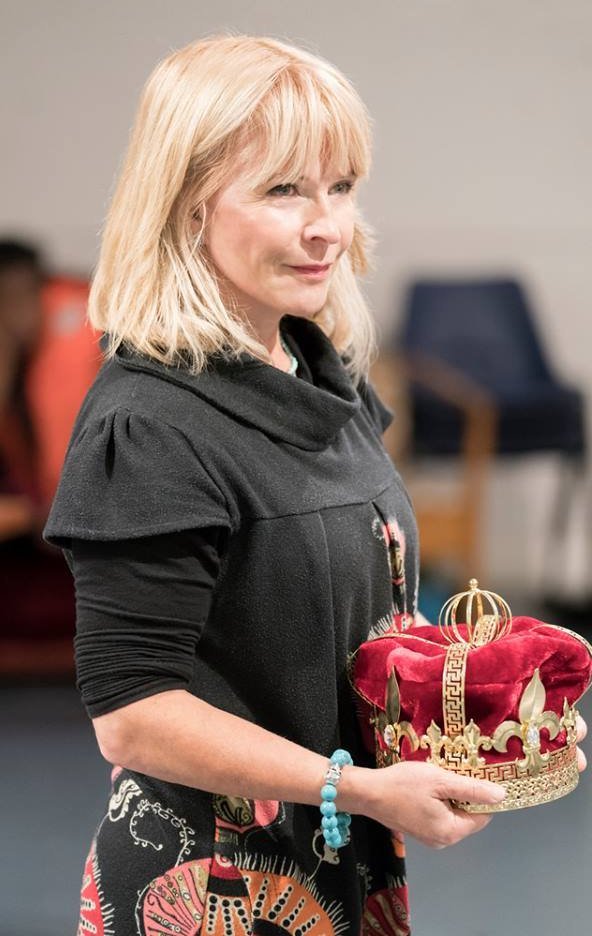
BILLY: How are you when it comes to reading between the lines both in your personal and professional life? TOYAH: I have to study myself all the time in mirrors. Going up for a part I have to change the way I move. I have to deal with the hands. I'm incredible at reading people. You get people that do face recognition for the police. I can read someone literally in five seconds because I’ve studied myself so much. So I'm a very good reader of personality traits BILLY: After many years as an actor and a musician touring, can you withstand the constant changes of the lineups and surroundings? Are longtime colleagues supportive of your neurodiversity and the way that you work? TOYAH: It's a good question because in the following week I'm working with three different groups. I've always kind of ended up with different bands. The Toyah band, what's fabulous about the band is we've been together for 18 years. They know how I need to learn something and they know when I can't learn something. They know the route in and we have kind of eye signals and hand signals on stage when I've lost the count. I anchor by the downbeat. Now, most musicians don't need a downbeat, they can work around that downbeat (makes a tsk tsk tsk noise) I need the boom, boom, boom, that's how I recognise music
So the Toyah band make that very easy for me. As a solo artist - it's important to me to be a solo artist because it's important to me to establish who and what I feel I am rather than what other people feel who and what I am. I'm not a person that lives by others opinions. And I think that makes some people … I'm difficult to be with for some people because I won't let people tread on me. It's all my upbringing, it's all survival. It's all how dare you tell me that my precious time isn't how I perceive it BILLY: Is it fair to say you're still fighting an uphill battle with acceptance and credibility as a neurodivergent woman in the entertainment industry? TOYAH: I’m fighting the war and I'm a woman and you've got that as well - being a woman in the music industry. There's quite a war going on all the time BILLY: I discovered via your blog on toyahwillcox.com that you are also dyslexic. As a fellow dyslexic myself, I am in awe of the fact that you've penned two books and have co-written nearly 30 albums throughout your impressive career to date. Have you ever felt like you've been at a disadvantage in comparison to your peers?
TOYAH: There are some authors I will never be able to read because they have a way of thinking that I believe is brought to them through their education and it's quite an elite education. There are some authors like Stephen King - I can pick a book up and read it in two hours. But there's other authors I have to go through with a dictionary. I have to go through each paragraph three times There is an elitism in writing and because I read the newspapers - the simpler writing techniques like The Sun and The Mail - I can read those in five minutes. If I'm going to go to The Independent and The Guardian and The Observer I'm like oh, I don't understand that. So what do they mean? Why have they said that? Three sentences later, they're saying that … I just have to go over and over and over it BILLY: Do you find putting pen to paper easy and does it play a big part in your day to day life?
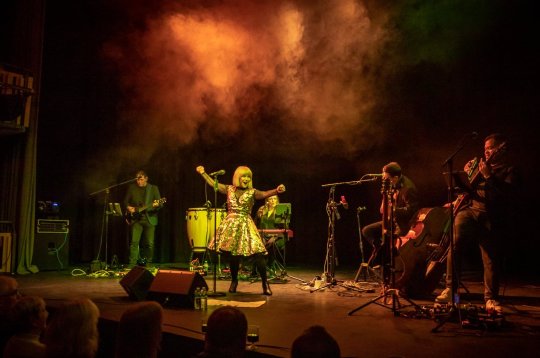
TOYAH: Both books are a stream of consciousness. I don't know about you, but I think about my life like a diary. So say that's a diary (rustles some paper) Every single note of every single day is in that order in my brain right through virtually to my first memories. I could tell you what I was doing a year ago and what I was wearing, and that really freaks people out So when I'm in a situation and I was in the situation two days ago rehearsing the tour band for “Posh Pop”, which is the new album. They wanted to change an arrangement. So that in my head is like taking the ABC and just throwing it at the wall. It's literally like that. I can't hold it down. I can't sequence and I'm saying sorry, I'm having a brainstorm here I'm going to have to stop everything, write it down in its order, learn it, see it, photograph it in my brain to get the line still. So sometimes when I look at print, the print becomes a black block. Impenetrable. You're just looking at a blank block or it's like confetti firing off and I can't control the images
So reading books … I know a good writer Alice Sebold, “Lovely Bones”. That is an intellectual book. I read it in two hours, because she wrote it as a stream of consciousness. So with both of my books “Living Out Loud” and “Diary Of A Facelift” - they’re streams of consciousness. But because my consciousness is so ordered, when I write something it has that order in it BILLY: Your incredible acting career has seen you star in a cult classic film “Quadrophenia” and opposite Laurence Olivier in “The Ebony Tower”. You've also tread the boards in big West End shows and have appeared in TV shows, both as an actor and presenter. What impression did the people you've worked with leave on you? TOYAH: I’d say in “Quadrophenia” we were soul brothers and sisters, we're all the same. There was one standout, absolutely brilliant intellectual and that was Sting. He could do anything with such eloquence and brilliance, but the rest of us we were of similar mental ability and function Laurence Olivier was exceptional and I think part of this exceptionality was his generation. Seen two wars, have had to survive, gone without food, not knowing waking up every day and I think not knowing made exceptional human beings. I'm not saying it's good but Katharine Hepburn, Lord Olivier, Sir John Mills, Diana Dors, exceptional human beings. They shone
BILLY: What did it feel like working with Laurence Olivier? TOYAH: I came out of “Trafford Tanzi”, which was a massive critical success so I was pretty confident when I worked with Laurence Olivier (below, with Toyah in "The Ebony Tower") What I was aware of that he was in the latter part of his life and he wasn't well, but I absorbed him like a sponge because he had done so much and he had fought so much for what he believed in. The National Theatre was not an easy thing for him to do and then to be put into a Hollywood system when really he was passionately in love with the stage was not an easy journey for him The Hollywood system messed up his wife, Vivian Lee, and I witnessed this with Katharine Hepburn that the Hollywood system of the golden era of Hollywood was a cruel system. So I was looking at another survivor and recognised that and just was absolutely in awe of all of them. Huge respect
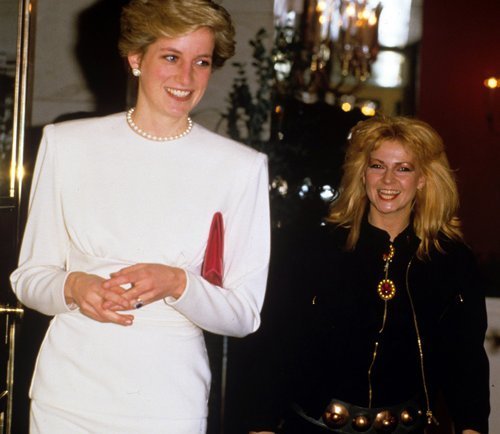
BILLY: You've got the same fight and spirit that those stars of yesteryear had. Does it hold you in good stead? TOYAH: I've got my limitations. My physicality gives me limitations as an actress. I was looking at people who were seen as chameleon who could be anything. So I didn't actually hold myself in the same regard as them. But I am still a fighter BILLY: In 1984, you had the honour of being invited to make a speech at the Women of the Year in the presence of Diana, Princess of Wales (above with Toyah) Your speech expressed views on how being disabled incites creativity. What was the driving force behind your speech? TOYAH: It was a huge honour, Woman Of The Year celebrations. It's so motivationally important and you think well, why in a time today but it's incredibly important. To be invited to do that was just amazing. I wanted to just say that because I've been perceived educationally as a no hoper - and even my husband Robert Fripp, one of the world's greatest guitarists - then two weeks ago, (he) said to me and my guitar teacher "Toyah is unteachable". Even he thinks I'm unteachable
I felt it was an opportunity to stand up and talk about the people I attract in my life, who seem definitely to have some form of disability. And the question is, is it disability or is it a different perception and experience? All are viable So in this speech I talked about two deaf male friends in an audience at Shaftesbury Avenue Theatre. I think 1982 or 83 where I was giving a concert and they were sign languaging the lyrics to each other. I realised they couldn't actually hear the music, but they were experiencing it. So I told this story In 1987 that's was revolutionary, we were just beginning within music theory to understand that people who are locked into their bodies but can't express themselves were still experiencing life and experiencing emotions. So this was all revolutionary and has come a long, long way since then I gave this speech and I just wanted to say that we need to see disability as these people have rights of access to everything but their disability doesn't stop them being phenomenal. So how do we use the word disability? I think we've come a long, long way in those last decades to making everything accessible and possible for everyone and that if we're educated at school, to know that we are all utterly physically unique, then we develop languages and connections no matter who and what we're connecting with It crosses boundaries, we need to cross boundaries and I think that's what that speech was about. If you read it today, I was probably using politically incorrect language but all of that is being ironed out and I'm certainly learning every day about the new language and the new acceptance and what can be said and what shouldn't be said (Watch the speech HERE)
BILLY: As a 31 year old with significant hearing difficulties I applaud you for taking a stand and making the speech that resonated experiences you'd had at the time. Every generation must play its part in spinning the wheel of change for the greater good with the best of intentions
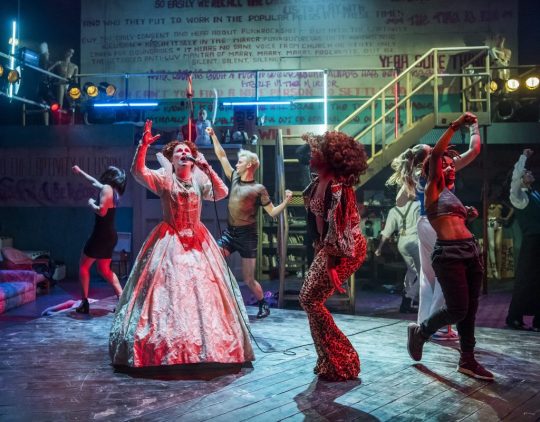
TOYAH: Every generation must have the right to change the world for good. Every generation must do that. Our present young generation who’ve had 15 months of COVID now deserve the mantle, they deserve the right to change the world for good and it's quite an extraordinary time to be alive. I think it’ll only change if people are taught about this So when I work with my band and if a firestorm starts in my head, I tell them. I say "could you just stop talking while I sort my head out?” Because sometimes you're having a firestorm and you just need to put everything back in place and conversation can be exhausting. I just educate them about what I need Three years ago, I was in a play (as Queen Elizabeth I in "Jubilee", 2018, above) with a profoundly deaf actress. Sophie Stone, breathtaking actress and she said to us if we talk away from her she's not involved in the conversation. We had to learn to socially interact in that way to make sure we were always facing Sophie. But another thing she said that after eight hours of rehearsal, of reading sign language and doing sign language and reading lips, she was exhausted and she needed to be alone So it's all about interaction and learning and acceptance on a social and a work level. If we're not given that time, or we're not given that journey, the integration and the acceptance and the equality of it hasn't got a chance. So we need to learn this from the dyspraxics and the dyslexics and the hidden disabilities as well
BILLY: What coping strategies do you use for dyspraxia and dyslexia? Awareness of dyspraxia pales in comparison to other hidden disabilities. What do you think is the cause for this? TOYAH: It's always been a big problem for everyone in my life that I am so capable of sitting in silence for weeks on end. I've actually gone months, well, let's say a month without even uttering a word. Silence and solitude for me is as informative creatively as it is for people in a nightclub. I think part of that is I have exceptional hearing. It's a massive problem. I am three doors away from the street and I can hear people talking on the pavement outside So everyone that comes into this house who knows me is aware that my hearing is exceptional. Because of that I do get very, very tired. There's a lot of information coming in all the time. Socially I say to people, let's get together, let's have a cocktail hour. If it goes to two hours, great. But after that I'm not good company. I get very, very tired by overstimulation of being social. And it's not criticism. It is just how I’m made BILLY: During the pandemic, you and your husband Robert kept the fans entertained while uploading many short, humorous videos online, going viral and racking up billions of hits. You've evidently helped people throughout the past year to keep a smile on their faces, but how have you coped mentally as a neurodiversive person?
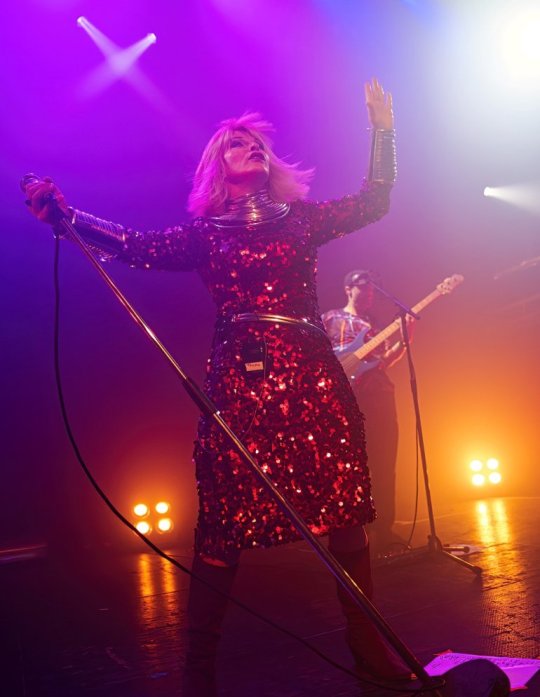
TOYAH: By doing exactly what you just said. I can't really do nothing. The first three weeks of lockdown I was in silence. I was meditating. I was actually praying a lot. Praying for my friends. We had a lot of people pass from cancer in that first three weeks. We lost two musicians. That first three weeks were very, very hard and then after that I realised that we were all in the same boat I wanted my husband to move and I started to teach them how to dance, which he hated. And then we started to do these crazy little films which he absolutely loathed in the beginning. But the messages coming back with “thank you, you saved my life. I'm alone in a single room apartment and I don't know what to do.” So all these messages were coming from around the world Slowly we realised that we'd hit on something that neither of us had ever touched upon before - that is our music was actually really affecting people's lives in a good way. So for me, the lockdown has been the busiest part of my life creating Toyah YouTube. But it's also kept me sane because I'm a performer and a performer needs an audience and it's as simple as that BILLY: Did it feel like you were personally letting fans down when having to cancel gigs despite it being out of your control? Did the move on to YouTube reassure your fans that all is well and normality will resume eventually?
TOYAH: Not only that. People who bought tickets didn't know when they were going to see you and people can't give up that money easily in a lockdown if they're not being furloughed, but they're out of work. You want to protect your audience, you want your audience to know that you see them, hear them and honour them. I had three tours cancelled and I wanted people to know that they hadn't lost that ticket money. So the whole of the connection through internet became vital and very, very precious BILLY: I am very much looking forward to seeing you live on tour in March 2022 TOYAH: Oh, that's fantastic! Good! We’ll know what we're doing by March. Completely new lineup, completely new sound BILLY: The “Posh Pop” tour gets underway in autumn of 2021. performing songs from the new album, hits and classics with electro acoustic band. Thank you for appearing on the The Dyspraxic Help 4U Podcast TOYAH: Thank you and thank you for understanding the process Listen to the podcast HERE
#toyah#toyah willcox#toyahwillcox#toyahinterview#toyah interview#toyah podcast#toyahpodcast#toyah 2021#toyah2021#the toyah willcox interview archive#thetoyahwillcoxinterviewarchive
0 notes
Text
TOYAH ON HARTY BBC1 16.11.1983

TOYAH: (accidentally knocks off Russell’s notes of the table when she sits down) Sorry! (laughs) RUSSELL HARTY: That’s the notes down then. Not only are the audience carried away - my notes are carried away as well TOYAH: Sorry about that RUSSELL: You’ve had to train very hard in this play called “Trafford Tanzi”? (below, Toyah as Tanzi) TOYAH: We only had two weeks of rehearsing. So that gave us natural adrenaline to get the show ready for the public in time - RUSSELL: But I mean physically you had to train quite hard? TOYAH: Yes, I did a lot of judo. A lot of traditional wrestling, a lot of weightlifting (shows her biceps, laughs) Which I'm stuck with now RUSSELL: For the rest of your life (A clip of “Trafford Tanzi” plays) There you are wrestling with - TOYAH: Ah! Neil McCaul. He played my husband. He was wonderful! I mean he could fight with his mouth whereas I fought with my fists
RUSSELL: Was this (Toyah’s pulling and throwing Neil) your husband until the end of the show? TOYAH: No, not at all- RUSSELL: But the way you’re behaving I’m not all surprised at all TOYAH: But he was brilliant -
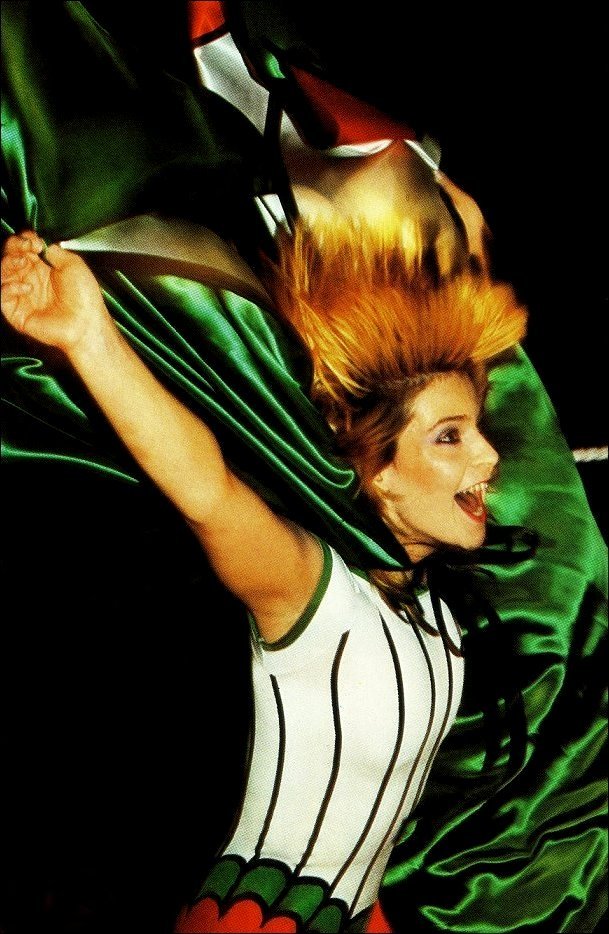
RUSSELL: It's a story of what? A battered baby? TOYAH: It's about a battered baby brought up in the north with the traditions of being a woman. The fact that women are taught to take the step behind and not want to work, only want to get married and have babies. Within the play Tanzi gets married to a husband that's unfaithful to her So to prove herself, her pride and everything, she takes up wrestling and in a heated argument with her husband says “right, I'll take you on!”. And she takes him on. It's a 20 minute fight and she ends up KO’ing him (knocking him out) RUSSELL: You’ve now landed with these rock hard things for the rest of your life (touches Toyah’s arm) If you let them go they’ll … (the audience and Toyah laugh) ... the flab will fall down and you'll have very big fat hands won’t you? TOYAH: Well, I found what’s very healthy is I do 50 press ups a morning and if I've still got it in me I’ll do 60 before I go to bed RUSSELL: Were you ever fat? TOYAH: Very! When I was a kid I was incredibly fat RUSSELL: What did you look like? Describe yourself TOYAH: I looked like an ape (the audience laughs) RUSSELL: Did you? TOYAH: A real ape. I had very long black hair that was very, very bushy. I looked like a cavewoman. And (puts on a lisp) I talked like this, I had an exceptionally bad lisp and I walked with a wobble and I was like everybody's failure. So I had a lot to fight at RUSSELL: (talks with a lisp) I think your lisp came in quite useful (the audience laughs) through a programme called “Kick Up The 80s”. Did you see that? TOYAH: I deliberately avoided it because I like Tracey Ullman. I thought if I saw it I’ll kill her! RUSSELL: I hope we have a little piece of this because in that programme there is Tracey Ullman actually imitating your lisp (Toyah laughs)
(A clip of “Kick Up The 80s” plays) RUSSELL: That’s Miriam Margolyes and Tracy Ullman doing Toyah Willcox
TOYAH: It’s very good actually!
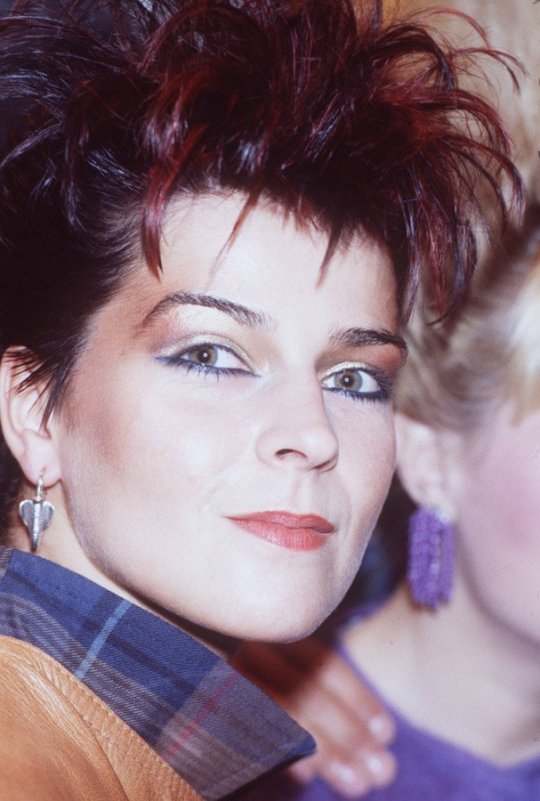
RUSSELL: Are you flattered or annoyed by that? TOYAH: I'm told by my father I should be flattered but in the early days, I just was genuinely insecure about it RUSSELL: And cheesed off a bit? TOYAH: But I'm not that insecure now I don’t think RUSSELL: Is there's a core of steel inside this tough lady? TOYAH: I hope not! RUSSELL: This tough exterior? (the audience laughs) TOYAH: (flirtingly) Not at the moment (giggles) RUSSELL: I mean of resolution and of ambition and the energy? TOYAH: I’m still ambitious. I'll always be ambitious. There’s so many people I want to work with. I'm very lucky with who I've worked with up to now. I've got ambitions to work with people like Spielberg. He might let me be the monster in his next movie RUSSELL: (Makes monster noises) Well, if he doesn't, you can KO him and throw him over. Now, you're going to sing us a song. A song that you've written? TOYAH: Yes, it's our latest single. It's called “The Vow” and I wrote it with my lead guitarist Joel - RUSSELL: What is its subject? TOYAH: Its subject matter is we all know our mistakes, but we never know how to correct them. And love can be so close to the destructiveness and I think within what the world is going through now and 2000 years ago, Jesus was supposed to have come down and told us, you know "get your act together" and we haven't. And “the Vow” is saying I love you I love you, but I could hurt to protect you, which is the contradiction RUSSELL: OK, “The Vow”, Toyah Willcox
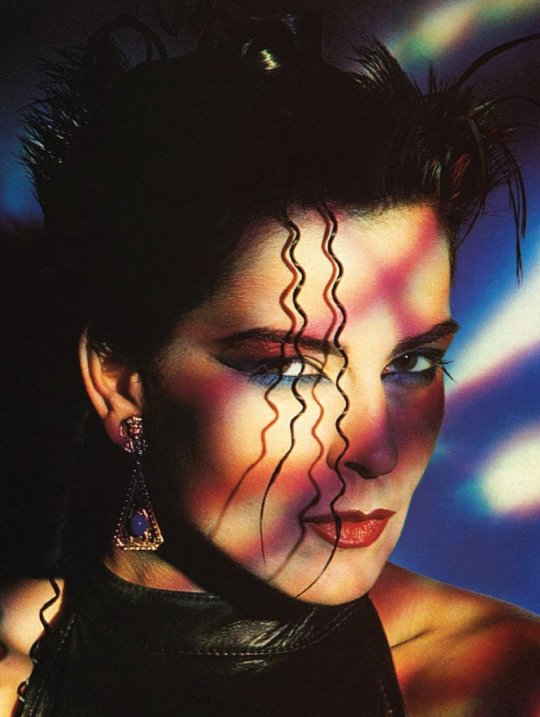
Watch the interview HERE
#toyah#toyah willcox#toyahwillcox#toyah1983#toyah 1983#toyah bbc#toyahbbc#toyahinterview#toyah interview#thetoyahwillcoxinterviewarchive#the toyah willcox interview archive
1 note
·
View note